- Featured Essay The Love of God An essay by Sam Storms Read Now
- Faithfulness of God
- Saving Grace
- Adoption by God

Most Popular
- Gender Identity
- Trusting God
- The Holiness of God
- See All Essays

- Best Commentaries
- Featured Essay Resurrection of Jesus An essay by Benjamin Shaw Read Now
- Death of Christ
- Resurrection of Jesus
- Church and State
- Sovereignty of God
- Faith and Works
- The Carson Center
- The Keller Center
- New City Catechism
- Publications
- Read the Bible
- TGC Pastors

U.S. Edition
- Arts & Culture
- Bible & Theology
- Christian Living
- Current Events
- Faith & Work
- As In Heaven
- Gospelbound
- Post-Christianity?
- TGC Podcast
- You're Not Crazy
- Churches Planting Churches
- Help Me Teach The Bible
- Word Of The Week
- Upcoming Events
- Past Conference Media
- Foundation Documents
- Church Directory
- Global Resourcing
- Donate to TGC
To All The World
The world is a confusing place right now. We believe that faithful proclamation of the gospel is what our hostile and disoriented world needs. Do you believe that too? Help TGC bring biblical wisdom to the confusing issues across the world by making a gift to our international work.
Book Review: Religious Literacy
More by trevin.

First, Prothero exposes American ignorance of religion, showing just how little we actually know about the world’s religions. The statistics are embarrassing. Americans actually know very little about their own religious traditions, not to mention the traditions of their neighbors.

But the problem of religious illiteracy does not simply affect our view of ourselves; religion matters because it stands at the center of the world’s great debates, wars, and life-perspectives. We are naïve to think we can understand the battles of our day with only the most superficial knowledge of religion and its role.
Next, Prothero shows how little we know of religion compared to the earliest Americans. He trots out the McGuffey readers, Webster’s dictionary and other classic works of American education in order to show today’s reader how religious information was once inculcated into American youth. He then shows how this devotion to religious knowledge was lost. Interestingly enough, Prothero believes that the responsibility of religious illiteracy belongs primarily to the Church and the anti-intellectual attitude that prevailed after the Second Great Awakening.
Finally, Prothero makes a proposal for public education, in which every student must pass a course on the Bible and on world religions before finishing high school. Prothero is not advocating a return to the Protestantism of early America. He believes students need to be taught about the Bible, not taught the Bible devotionally. He also believes that a course on world religions should be taught, so that students have an awareness of today’s world. The amount of time spent on different religions should vary depending on local context and the importance of a religion for each location. Prothero’s book ends with a Dictionary of Religious Literacy, a remarkably helpful introduction to the major beliefs of the world’s religions.
Prothero’s Religious Literacy is unique in that it avoids two extremes. First, he seeks to avoid the danger of relativizing the religions, so that the distinctions are muted. He forcefully argues against making it seem like religions don’t really matter and that all are equally valid. At the same time, Prothero does not want to see the Bible taught devotionally in the public schools (nor the Koran for that matter). His proposal is purely academic. Americans need a rudimentary knowledge of religious history and belief in order to be well-educated, effective citizens. Prothero also shows how his proposal stays within constitutional boundaries.
I hope that policy-makers will read this book. We are religiously ignorant to our own peril. It’s time we woke up from our secularist slumber and began realizing that religion is still vitally important in world affairs.
written by Trevin Wax © 2008 Kingdom People blog
Trevin Wax is vice president of research and resource development at the North American Mission Board and a visiting professor at Cedarville University. A former missionary to Romania, Trevin is a regular columnist at The Gospel Coalition and has contributed to The Washington Post , Religion News Service , World , and Christianity Today . He has taught courses on mission and ministry at Wheaton College and has lectured on Christianity and culture at Oxford University. He is a founding editor of The Gospel Project, has served as publisher for the Christian Standard Bible, and is currently a fellow for The Keller Center for Cultural Apologetics. He is the author of multiple books, including The Thrill of Orthodoxy , The Multi-Directional Leader , Rethink Your Self , This Is Our Time , and Gospel Centered Teaching . His podcast is Reconstructing Faith . He and his wife, Corina, have three children. You can follow him on Twitter or Facebook , or receive his columns via email .
A Sickness in Pursuing Health

Does the Pursuit of Godliness Lead to Self-Righteousness?

Defy the Decay Rate for Worship in the Church

Remember the 4 ‘Alls’ of the Great Commission

Is Your Church Countercultural?

Other Blogs

- Where Do I Start?
- Our Beliefs
- Our Philosophy and Practice
- Our Ratings
- Frequently Asked Questions
- What Our Readers Say
- How to Submit a Book for Review
- Latest Reviews
- Starred Reviews
- Picture Books
- Easy Readers
- Middle Grades
- Family Read Alouds
- The Good Book
- Redeemed Reader Series
- The Hive: Resources from Gladys Hunt
- Reflections
- Your Account
- Golden Key Fellowship Benefits
- Silver Key Fellowship Benefits
- Free Member Printable Resources
Confidently choose books for children and teens.
Book reviews and resources for Christian parents and educators.
We're reading ahead for you.
Want to choose great books for children and teens?
We know christian parents and educators struggle to find quality new books. at redeemed reader, we’re reading ahead for you so that you can confidently choose books for your children and teens., weekly in your inbox: book reviews, book lists, news, book trivia, and more, click here for a free best bibles guide, quick links.
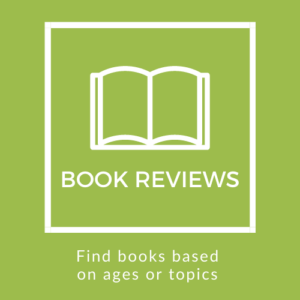
Read With Us
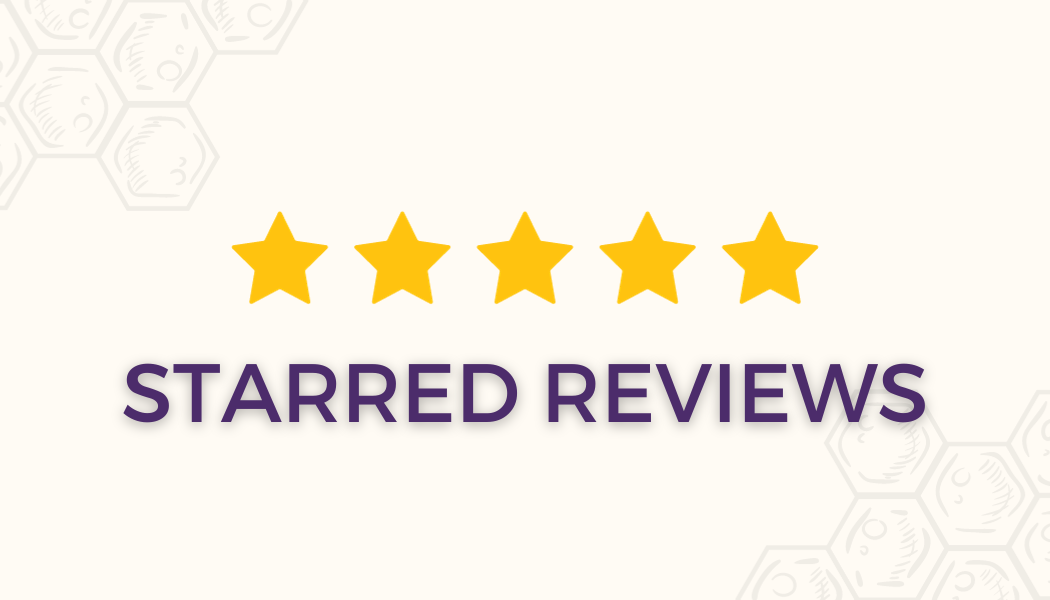
The Best of the Best
Books that represent both literary excellence and biblical truth.
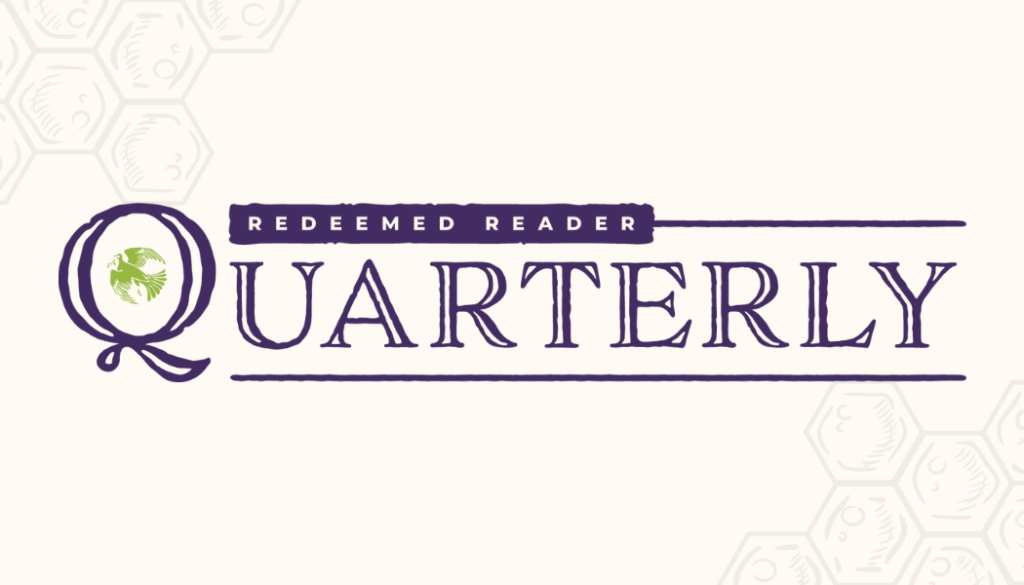
Print Magazine
An ad-free, 24-page magazine full of features for the whole family.

Gladys Hunt Resources
Blog posts from the late Gladys Hunt, here on Redeemed Reader!
Latest Posts
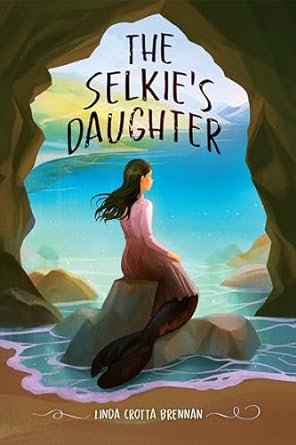
The Selkie’s Daughter by Linda Crotta Brennan
By janie cheaney.
The Selkie’s Daughter presents its protagonist with a profound choice between two natures.
Read More »
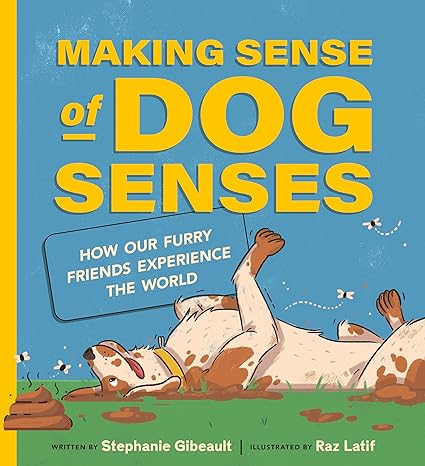
Making Sense of Dog Senses by Stephanie Gibeault
Making Sense of Dog Senses is a fascinating introduction to the way dogs experience their world.
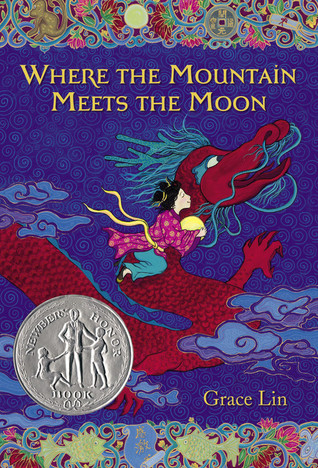
*Where the Mountain Meets the Moon by Grace Lin
By betsy farquhar.
Where the Mountain Meets the Moon is a lovely story about gratitude and Chinese mythology for middle grades.

This Day in History for Kids by Dan Bova
This Day in History for Kids is a year-long tour through historical events political and cultural, trivial and profound.
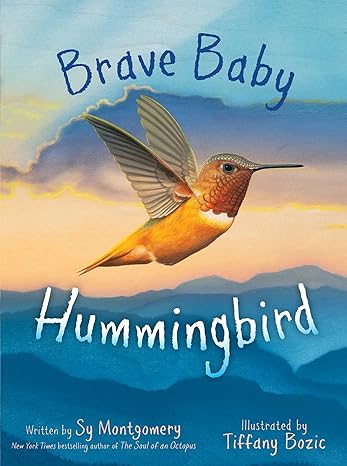
Animal Picture Books by Sy Montgomery: Brave Baby Hummingbird, Inky’s Amazing Escape, and The Seagull and the Sea Captain
Sy Montgomery goes the distance to report on wonders of the animal world.
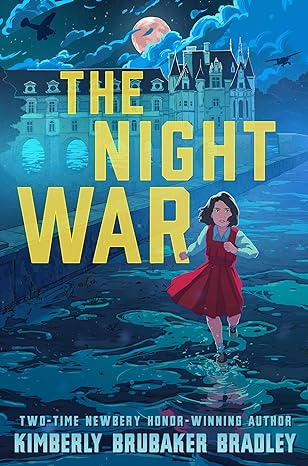
The Night War by Kimberly Brubaker Bradley
The Night War is the WWII story of a Jewish girl in Paris choosing to be brave when Nazis take everything from her.

Kentucky Derby Book List: Books for Young Horse Lovers
Books about horses for horse lovers of all ages, boys and girls, just in time for the Kentucky Derby events this weekend.
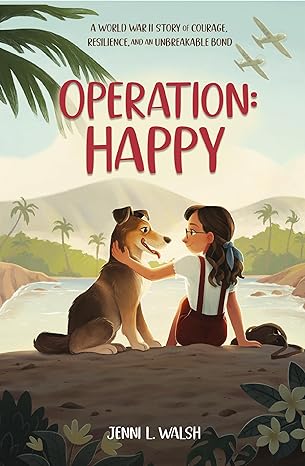
Operation: Happy by Jenni L. Walsh
Operation: Happy is the story of a girl and her dog experiencing the attack on Pearl Harbor and challenges that followed. Operation: Happy: A World…
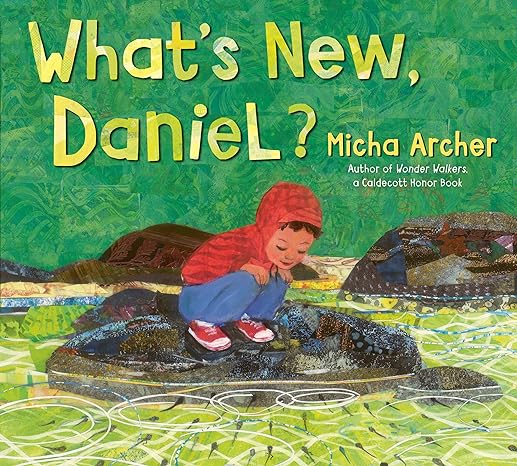
Four New Picture Books by Caldecott-winning Illustrators
Four new books by Chris Raschka, Micha Archer, Elisha Cooper, and Sophie Blackall celebrate the variety of life on earth and the power of imagination.

Religious Literacy: What Every American Needs to Know--And Doesn't
Stephen prothero.
304 pages, Hardcover
First published March 13, 2007
About the author

Ratings & Reviews
What do you think? Rate this book Write a Review
Friends & Following
Community reviews.

Join the discussion
Can't find what you're looking for.
Numbers, Facts and Trends Shaping Your World
Read our research on:
Full Topic List
Regions & Countries
- Publications
- Our Methods
- Short Reads
- Tools & Resources
Read Our Research On:
Religious Literacy: What Every American Should Know
Pew Forum Faith Angle Conference Key West, Florida
Some of the nation’s leading journalists gathered in Key West, Fla., in December 2007 for the Pew Forum’s biannual Faith Angle Conference on religion, politics and public life. Stephen Prothero, chair of the Department of Religion at Boston University, discussed the issue of religious illiteracy in the United States.
The author of Religious Literacy: What Every American Needs to Know – And Doesn’t , Prothero says the United States is one of the most religious countries on earth, but Americans know nothing about religion – their own or the religions of others.
He asks: How can we engage a politician who is rightly or wrongly invoking the Bible or using religion for political purposes without knowing something about religion ourselves, as citizens, journalists and academics? Prothero says the impact of religious illiteracy on foreign policy is even more significant, arguing that he doesn’t think we understood Iraq as a place where people are, in many cases, primarily motivated by religion.
Speaker: Stephen Prothero , Chairman, Department of Religion, Boston University
Moderator: Michael Cromartie , Vice President, Ethics and Public Policy Center; Senior Adviser, Pew Forum on Religion & Public Life
Navigate this Transcript The religious literacy project Religious illiteracy as a civic and political problem Religious illiteracy and foreign policy Religious literacy throughout American history A proposal for promoting religious literacy Q&A with journalists
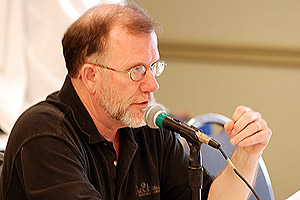
MICHAEL CROMARTIE: Welcome to Key West and to the Pew Forum’s event. We have this twice a year. We’ve been doing this since 1999, and we’re delighted you can be here. I know a lot of you know the work of our first speaker, who is the chair of the Department of Religious Studies at Boston University . I have a copy of his book, Religious Literacy: What Every American Needs to Know – And Doesn’t . It was a New York Times bestseller.
I was tempted to call this session “Religious Literacy: What Every Journalist Needs to Know and Doesn’t.” But we decided not to do that. We’re delighted to have Stephen Prothero here with us. We’ve been wanting to have him here for some time and delighted we could finally have him come and talk to us for our first session. Stephen, thank you for coming.
STEPHEN PROTHERO: Thank you, Michael. It’s great to be here, not just because of the weather. A couple of weeks ago, I was at the American Academy of Religion meetings in San Diego and I was on a panel on religion in the media. One of the presenting problems there for academics was whether to even talk to the media. There was a guy on the panel who was saying that we shouldn’t do that and that he doesn’t do it, and he used to be the president of the American Academy of Religion. (Laughter.)
So it’s interesting to me to reflect on that. I was talking about the importance of talking to the media. And especially in an arena like religious studies, where many of us, at least in academia, feel we have things to offer and things to say to the general public, I think it’s, for obvious reasons, important for us to be trying to write our own more popular pieces and also working with people like you.
[of Time magazine]
The other thing that I want to say by way of introduction is that the last few years I’ve made a concerted effort to try to be writing more and more for the general public instead of for academics. I found it depressing to write books that took me 10 years and were bought by 500 people and read by 50 people, where my mother was 2 percent of the reading public. (Laughter.) My father doesn’t read, unfortunately; that would have been 4 percent.
So I’ve been making an effort to talk more and more with editors and publishers and journalists and that’s been wonderful for me. And I found that the conversations I have with my friends in journalism and in publishing are actually, in a lot of cases, more interesting than the conversations I have with my colleagues about American religion.
What I’d like to do today is talk a little bit about this religious literacy project that I’ve been working on. Let me say at the very beginning, though, that there are two ways to talk about religion. This is a message that I’ve figured out only by talking about my book over the last year. It’s really crucial, at least for me, to get it out there, which is that there’s this Sunday school, synagoguey, churchy, mosquey way of talking about religion, which is the way that religious people talk about it. Then there’s this other way of talking about religion, which is more secular. And I think there’s a fear in the general public that there’s only one way to talk about religion-the religious way.
And so, if you’re going to talk about religion, you’re going to be doing some kind of churchy sort of thing that we need to be careful about. So But there is this other way of talking about religion that doesn’t assume that you believe in God or that atheists are idiots. It is just another way to think and have a conversation about this topic. In short, there is a religious way to talk about religion and a secular way to talk about religion. So that’s the kind of talking about religion that I’m going to do today-the more secular talking about religion.
I get asked a lot about how I got started on this project, and I’m actually not really sure. But I think one thing that I noticed when I moved from Atlanta – I used to teach at Georgia State University – to Boston was that my students didn’t seem to get the references that I was making to religion as much as I expected that they would. I’ve been at Boston University now for 10 years, and it was maybe about five, six years ago I started noticing a shift. When I would say things like in Matthew, blah, blah, blah, the students would get that look like they sort of knew what I was talking about but they really didn’t.
I realized they were thinking, “Matthew Perry? From “Friends.”? (laughter). So I gradually realized I have to do explain this stuff: Matthew, which is one of the four Gospels, which are books in the New Testament, which is a scripture in Christianity, which is one of the world’s religions. (Laughter.)
I would have to do this iteration with them, and it became really intriguing to me to see when I had to do that and how often I started doing that. And I found that I couldn’t assume much in terms of religious knowledge from my students. Even when they were taking an upper-level course in American Christianity. I couldn’t expect that they knew much at all about Christianity.
And so, I started giving this quiz that’s in my book. It’s my religious literacy quiz that’s been published in some of the newspapers and magazines you all work for. I started giving it to my students just to see how they would do. And it was really, really intriguing to me how poorly they would do. Then I started trying to see how they did vis-à-vis some surveys. By the way, I was disappointed to hear that John Green’s new survey doesn’t have any questions about religious knowledge because there are tons of surveys, as you all know, on beliefs and behaviors of Americans religiously, but very few on what Americans actually know.
So I would go through and I would find some. One of the ones that I found back in the ’60s was really funny. It said, do you know the Ten Commandments? And the answer on the survey was yes or no. (Laughter.) So all these people would say, “Yes, oh yes, sure, I know. Of course, I do. I know the Ten Commandments.” My question was, “Name the Ten Commandments. How many can you name?”
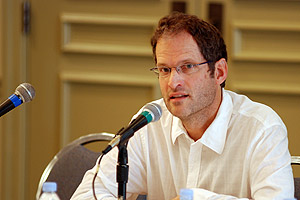
And students do really badly. I think about one out of nine of my students would pass with 60 percent or better. And one thing that really intrigued me is, at the end, I would give them a list of Bible characters and then Bible stories and I’d ask them to match them. I’d have Adam and Eve and Paul and Moses on one side and, on the other side, I’d have Exodus and the Road to Damascus and the Garden of Eden. I’d ask them to draw a line between the two, and it’s amazing – (laughter) – the lines that they would draw in their heads. Paul would be getting the olive branch from the dove and – (laughter) – Jesus would be parting the Red Sea. I mean, somebody must have been able to do that. It was probably Jesus, you know. (Laughter.)
And again, these weren’t obscure things. It wasn’t even like David and Goliath things. And so now, when I read stories in magazines and newspapers–Appalachian State beats Michigan, or any other David and Goliath story – I always kind of laugh and think nobody knows that story. Most Americans probably don’t know that reference to David and Goliath.
So that was part of it for me, talking with my own students. And then, as I was thinking about this project, I’d also started talking to my kids about what they knew about religion. There was a time when my younger daughter – she’s 9 now; she was probably 6 – and she was given a Bible at this Lutheran church that I attend about – am I off the record now? (Laughter.) Anyway, I attend very infrequently, but anyway, it was Bible Sunday so she was given this Bible with this very white and very happy Jesus on the cover, holding a lamb around his shoulder and all these kids gathered around him. And she was very proud of the fact that she was getting this Bible. So, as I was driving her home, I thought to ask her what she knew about this book.
Why don’t you tell me some characters in the Bible, I said. She always is up for a challenge, so she sort of smiled and I said, but not Jesus. She was disappointed with that because her answer was going to be Jesus. So she started thinking and she was in the backseat and she thought for a while and finally she looked up and said . . . Tom. And so, I was like, Tom? Where does that come from? I was thinking, well, OK, there’s doubting Thomas and maybe he was Tom to his friends – (laughter).
So this was disconcerting to me, that I had a 6-year-old -. Here I am a religious studies professor. My father’s a medical doctor; he had this whole thing about not bringing his work home that I also had. I just thought, this is my job, I’m not going to talk about religion with my kids. And so, I realized my kids didn’t know anything about their own religion.
A couple of weeks later, I must say in my daughter’s defense, she was in Sunday school again and they were talking about Moses. The story was Moses in the desert, no water, hits the rock with the stick, water comes out. I asked my girls, including my older daughter, about this story on the way back home and my younger daughter was great. She was able to tell all this Moses stuff, including the parting of the Red Sea and the basket, and she was pretty good. She was up on Moses. So by that point, a couple of weeks after she got the Bible, she was good to go on Jesus and Tom and Moses, the three of those. But my older daughter had learned, and this is typical mainline Protestantism, she was just talking all about the ecology of water and condensation and evaporation, the importance of preserving the scarce world resource of water. She knew nothing about Moses – (laughter) – but she learned a lot about water that day.
So those were the personal ways that I realized this was an interesting project. The central paradox of the book was clarified to me by an Austrian colleague of mine, who was teaching at Boston University with me a few years ago. He was an expert on orthodoxy. He was teaching a course on Orthodox-Catholic relations. After a couple weeks, I saw him around the photocopier, and he seemed a little frustrated. He said, Steve, these Americans are very strange. He said, they all go to church and they know nothing about Christianity. Nothing. He said, I have to start from the very beginning. I have to start with … there was a guy named Jesus. That’s where I have to start when I’m trying to teach this course on Orthodox-Catholic relations, where I thought I could assume all this information about the history of Christianity and what Orthodoxy was and what Catholicism was. He was really astonished. And that helped to clarify for me the central paradox in my book, which is that the United States is one of the most religious countries on earth, but Americans know nothing about religion, their own religions or the religions of other people.
There have been surveys done on this, not very many, but most Americans cannot name any of the Gospels . It’s about 50 percent, a little below, when you ask them to name a Gospel. Most don’t know that Genesis is the first book of the Hebrew Bible. Ten percent think that Joan of Arc was Noah’s wife. (Laughter.) A sizeable minority think that Sodom and Gomorrah were a happily married biblical couple. (Laughter.) This is the kind of stuff you get when you ask about the Bible, you ask about Judaism and Christianity.
If you shift over to religions outside of the Judeo-Christian canopy, it’s really quite astonishing. Americans will admit to a very high level of ignorance about Islam . There have been some surveys where people are asked: What do you know about Islam? Have you ever met a Muslim? Do you know anything about it? And Americans will typically run for the side of the survey that heads towards, absolutely, positively nothing, you know, that kind of response. There was a survey done of American teenagers, where the teenagers were asked simply to name the world’s religions, and half couldn’t name Judaism as a world religion. Half couldn’t name Buddhism as a world religion. So this isn’t name the Four Noble Truths or in what century was the Buddha born, weigh in on the debate, none of that kind of stuff. Just incredibly basic information.
Now, religious illiteracy is a religious problem inside religious communities. There’s a lot of writings among Jews about Jewish illiteracy. There’s a lot of hand-wringing since Vatican II among Catholics about Catholic illiteracy. Evangelicals are very worried about biblical illiteracy. They write about it a lot. If you do Google searches on these kinds of terms, Jewish literacy, Catholic literacy, biblical literacy and illiteracy, you get a lot of hits. And these are basically theological and religious conversations inside religious groups about what can we do about this problem. How do we teach our kids about the Bible in our evangelical church?
But the angle of approach for me in this project was the civic and political side. So instead of seeing religious illiteracy as a religious problem for religious people, I’m looking at it as a civic problem and I’m looking at it from two angles. The first is the domestic angle, where we have politics now where we used to have one religious party and now we have two religious parties, in the sense that Democrats have now joined Republicans in deciding that it’s smart to talk about God and it’s smart to talk about faith because that’s the way you get elected.
And the way that the Republicans, over the last generations, were able to attach to the good words like God and family and values and the Democrats seem to be attaching to less good words or less resonant words like rights and reason, things like that. It didn’t seem to be such a good strategy for the Democrats in a country with 96 percent of the citizens believing in God to be the non-God party against the God party. So basically we have a politics where politicians on both sides are being encouraged to talk about religion, about their own faith, but also to connect their public policy initiatives to religious ideas, particularly to biblical ideas and Jewish and Christian ideas.
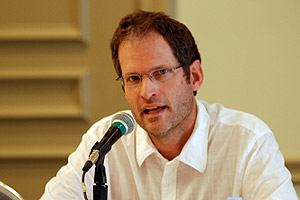
So Hillary Clinton now, when she talks about immigration, she’s quite likely to talk about the Good Samaritan story and to say why don’t I think that an immigration bill, where we have to turn in people who come over the border illegally, why do I think that’s wrong? Well, because the Good Samaritan story. You know, we’re supposed to treat foreigners in a good way. We’re supposed to treat them like our neighbors, according to the Bible.
In this kind of politics, it seems to me that it’s imperative for citizens to know something about religion. How can you engage a politician who is rightly or wrongly invoking the Bible or invoking religion for political purposes on issues like gay marriage or abortion or the environment or poverty or euthanasia or capital punishment or war?
And my response is, well, that’s all well and good, but we have the country that we have and people are going to be talking about religion on television. Politicians are going to be invoking religious reasons for their public policy stances, and we, as citizens and as journalists and academics, should know something about religion so we can engage them, and also so we can – I think, in some cases – so we can flush out the demagogues who actually don’t have a religious argument but have a kind of religious invocation where they’re sort of invoking God or invoking religion without actually having a religious argument underneath that invocation. So that’s the domestic side.
[President]
But she had really no religion adviser; she didn’t have anybody that she could call up and say explain to me this Sunni-Shiite thing, or what’s going on in Afghanistan with religion, or in Kashmir do people really care about Hinduism and Islam there and is that operative? Or, what’s going on with the civil war in Sri Lanka between Hindus and Buddhists? I thought Buddhists were nice to each other; I didn’t think that they liked to kill people for religious reasons. She didn’t have anybody for that purpose.
She also observed in the book that there’s no requirement for ambassadors to countries that have substantial religious populations, that they know anything about that religion. There’s neither a prerequisite nor a policy of having U.S. ambassadors to Middle Eastern countries, for example, have any training in Islam, have even one course in Islam, even know how to spell the word “Koran” or be able to know one salient difference between Sunnis and Shiites, or for the ambassador to India to know that India is a Hindu country, or to know anything about Hinduism whatsoever.
I think one thing we’ve learned in terms of the Iraq War is that it doesn’t look, at least to me, like our government knew much at all about Islam before we went into Iraq, and we had a sense that we understood the situation by understanding it in terms of ethnicity, in terms of politics, in terms of the economy. But I don’t think we understood it as a religious place, where religious reasons mattered, where people were, perhaps in many cases, primarily motivated by religion.
And so we weren’t motivated as a government to figure out what we knew and what we didn’t know, particularly, what we didn’t know. I think that one thing that this project on religious literacy can do is to make people aware of the stuff that they don’t know, particularly politicians and particularly when it comes to international affairs and foreign policy.
If you look at places like Iraq and Iran, it’s pretty clear that these are places where Islam matters. And you look at Kashmir, where we have two nuclear powers – a Hindu majority, the state of India, and the Muslim majority, the state of Pakistan – facing down each other. And we have, as I mentioned, Sri Lanka, where you have a civil war between Hindus and Buddhists.
These are places where you need to understand religion in order to understand what’s going on, in order, in my view, at least, even to start. I think it’s ironic that in a country where so many people are religious, and where religion is so much a part of domestic politics, that we still seem to be operating on this old secularization paradigm where we can understand other countries and other people purely on the basis of their economic and political thoughts and actions and motivations. It just doesn’t seem to me at all to be the case.
So religious illiteracy is a problem, not only for Americans to understand what’s going on here with Democrats and Republicans, but also to understand what’s going on in the world. So that’s the basic pitch about the book in terms of the problem that it tries to address. This is not a problem that I think is particularly controversial. I don’t imagine many of you are going to – you might quibble with something I said, but I don’t think the basic argument here is that nobody’s going to stand up and say, I’ve really been traveling around America and I’m really convinced that Americans really know a lot about their own religions; they’re very well-versed. These evangelicals and the Bible or Jews in America are really quite conversant with their own tradition. It just isn’t the case.
When I was initially starting on the book, I was thinking probably it was just a magazine article. And when I was thinking about turning it into a book, somebody suggested to me – and I said, I don’t really think I can sustain interest in this project for a year or two because I sort of know what I’m going to say. And she suggested to me that I try to write up a history of how this happened, how did we get to this place of religious illiteracy? And that, to me – I’m a historian of American religion – so that actually interested me, and I didn’t know the answer to that. I didn’t know how this would happen.
I spent actually about 90 percent of my time on the book on these two chapters, where I talk about the incredible religious literacy that we had in the colonial and early national periods, and then the demise of religious literacy over the course of American history. I find these two chapters fascinating, and I’m sure you will too, if you ever look at them. Actually, I’m not sure you will because my students, at least, are super-bored by history. I find whenever I move into my history mode with my students, their eyes sort of start to glaze over and I have to promise them it’s not going to go on for too long.
So anyway – and I’ve noticed that this part of the book, even though it was about 90 percent of my effort, has gotten about zero percent of the reviewers’ efforts when they write about this book. (Laughs.) No one seems to be particularly interested. But I’m going to do a really quick run-through the history before I finish up, maybe take about 10 minutes.
The basic argument that I make in terms of how this happened is that there was quite a remarkable level of religious literacy about the Bible and about Protestant theology, particularly Calvinist theology, in the colonial period across the colonies, even fairly well across race and gender, and that persisted until the early 19th century.
And one reason for this was because basic literacy and religious literacy were yoked in the sense that the way people learned to read was by reading the Bible. Most homes had either zero or one book, and those that had one book had a Bible. The readers and primers – like the New England Primer from the colonial period and then Webster’s Speller, which was just passed by the Harry Potter series as one of the best-selling books in American history, amazingly big-selling book – they were thoroughly drenched in theology. They were the kind of books where you would be reading the 23rd Psalm, or where you’d be reading a passage from the Sermon on the Mount, in order to learn how to read the words that were included in these spellers. They would be maybe in the five-syllable words, and there’d be words like “abomination.” I mean, there would not be words like – I don’t know what the words today would be – but there would be religious words. There would be “fornication” too, by the way. Kids would be learning these words: fornication, abomination, Armageddon, apocalypse. These were the words on the list, the biblical words.
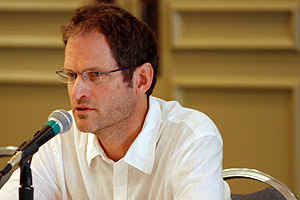
So that was the situation, really through the early national period, and then the argument that I make is against a sort of received wisdom that you sometimes hear from the religious right, which is that religion goes away from the public schools in the early ’60s with the 1962 and 1963 Supreme Court rulings against devotional Bible-reading and prayer in the public schools. And there were basically the “bad” secular liberals in the Supreme Court who ran religion out of the public schools and therefore made us a nation of religious illiterates.
The argument I make is that actually that is off by about 100 years and it’s off – the villains are the wrong people; the villains were really the religious people, particularly evangelicals, but also liberal Protestants and, to some extent, Catholics. This happened really in the period of the Second Great Awakening in the 1830s, 1840s and 1850s with the rise of evangelicalism and with the displacement of Puritanism as the dominant religious impulse, an impulse that was very keen on the integration of the head and the heart in the way religion was done, that God gave us heads, God gave us brains, God gave us reason, God gave us this book to read. And we’re supposed to use those faculties to reach God, to understand God.
And this gets replaced by a form of evangelicalism that is really much more emotional, less doctrinal, trust-the-head a lot less. It really focuses on loving Jesus, a relationship with Jesus, rather than on knowing what Jesus had to say, and that particularly – and this is one of the main arguments that I make in the book, and I’m actually thinking about writing about this more extensively – the shift of the locus of religion inter-morality, and in fact, the confusion of religion inter-morality, where we see in our politics, really clearly today, that to be religious is to be moral, and it’s to be moral in a bedroom sort of way; it’s to be moral around issues like gay marriage and abortion and stem cell research, rather than to be moral in a more fulsome way.
I saw this in a memoir written by a friend of mine. It was one of these strange new kind of memoirs that people are writing about their religious lives between the ages of 18 and 19 and 1/2. This is a book called My Faith So Far . It’s actually a really good memoir by a guy named Patton Dodd, who is now the Protestantism editor at Beliefnet.
It’s about his struggle as an evangelical to kind of hang in with evangelicalism as he goes to Oral Roberts University. And it’s really comical in the way that – how he knows he’s a Christian or not. He knows he’s a Christian when he’s not having pre-marital sex and when he’s not smoking pot, but when he’s smoking pot and having pre-marital sex, that’s when he’s not being a Christian. I just thought that was so curious and so weird and so contemporary that this is how you would understand the Christian life, as opposed to thinking it was because you believed in Jesus, or you believed that the Bible was true, or you had a personal relationship with Jesus, or all sorts of other things.
Anyway, this all happens, I think, in the period of the Second Great Awakening, where evangelicals move into things like temperance, abolitionism, women’s rights, prison reform, education reform, and where they start to equate being religious with being a do-gooder in the world, with making the world a better place, with making the Kingdom of God, with civilizing and Christianizing American culture.
And religious literacy is a loser along the way because it becomes increasingly less important, and, in fact, it becomes a barrier to ecumenical cooperation on things like abolition for people to actually argue or to know the salient differences, say, between Methodists and Baptists. It becomes a barrier, like, why would you want to know that? You’re supposed to be cooperating with these people. Why should you be arguing about whether you should baptize people when they’re babies or when they’re grownups? It’s not really useful.
So the doctrinal side of religion and the narrative side of religion just start to fall away, and they start to bow down before the moral and emotional projects of religion. So religion becomes an emotional and moral enterprise, rather than a narrative storytelling and doctrinal enterprise. Anyway, that’s the very short version. Isn’t that fascinating?
So let me say something quickly about my proposal. This is a proposal for how to address this problem, and the argument basically goes like this: insofar as it is a civic problem, it requires a civic solution, and the place we do civic solutions is the public schools. At least, that’s one of the places we try to do civic solutions. And so I have an argument that we should do two mandatory courses in the public schools on religion, one on the Bible, and one on the world’s religions.
The Bible course would address the issue of domestic politics, where the Bible is the de facto scripture of American politics. It is the book that politicians use, that politicians manipulate, that politicians quote from. We need to know it, at least some of it, in order to fully engage these politicians in the moves that they’re making. Moreover, outside of contemporary politics, you can’t understand the history of Western art without knowing something about the Bible. You can’t walk into a museum and make any sense of any Renaissance paintings, or basically, any paintings before 1950, before Andy Warhol. In fact, you can’t make sense of Andy Warhol paintings because Andy Warhol did a lot with religion too.
You can’t make sense of American literature. At one point, I looked up the books on the Oprah Winfrey Book List. About half of them actually in their titles have “Song of Solomon,” “East of Eden.” They have biblical references, literally, in the titles, about half of her books. So this is the Bible course, which should also help you make sense of presidential inaugural speeches-when the presidents cite the Bible, use the Bible for political purposes.
The second course would be a world religions course. This would address not the domestic problem, but the international problem. How do we make sense of a world in which Islam is a powerful force, in which it’s important, as the chair of the House Intelligence Committee, to know the differences between Sunnis and Shiites, which the current chair of the House Intelligence Committee was asked and couldn’t answer? It would be good if the next generation of politicians could answer questions, very basic questions like this, and not only about Islam, because who knows how long Islam’s going to be America’s primary religious challenge?
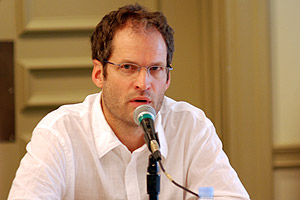
The objections to this, you probably know what they are. One is the silly and stupid objection that it’s unconstitutional, which just isn’t true. The Supreme Court has ruled about a dozen times over the last 50 years on religion and public education explicitly, and it’s very clear, their position. It’s been pretty stable actually, which is that there’s a distinction between preaching about religion and teaching about religion. Preaching about religion can’t be done. You can’t preach atheism, you can’t preach theism, you can’t preach for or against any particular religion, but you can talk about religion and you can teach about religion. You need to make a distinction between – as I did at the start of my talk – between talking about religion in a religious way and talking about religion in a secular way.
The Supreme Court doesn’t just give a kind of constitutional stamp of approval that this is a kosher enterprise to teaching about religion; it consistently goes beyond that. It says not only is it acceptable, but it’s imperative. It’s kind of unusual for the court to do this kind of thing. Usually, they just rule on the law and they leave it alone. But they actually kind of editorialize and they say, we really do need our young people to know something about the Bible and to know something about the world’s religions, and it really makes sense to say that kids aren’t educated when they get out of high school if they don’t know something about these things, and we need to have these kinds of courses. (Laughter.) They actually say this.
So it’s curious to me that a lot of public school teachers, a lot of administrators continue to labor under the false assumption that religion is a sort of third rail and you need to avoid it and it’s dangerous. I talked to teachers, I talked to professors at ed schools who trained teachers, who would tell me, when students ask about religion, I say, I can’t talk about that. I’m not allowed to. It’s a public school. So they’re sitting there trying to do Thanksgiving in American history and a kid raises his hand and says, well, to whom are they giving thanks and is it to God? And some teachers feel they have to say, I’m sorry, I can’t answer that question because that gets me into the realm of religion. Then the kid’s thinking, ah, it’s like giving thanks to – I don’t know – the Indians or – I don’t know who they’re giving thanks to. Some feel they can’t do that; some feel they’re going to get in trouble if they talk about religion.
The other objection is that it’s too controversial. We already have enough problems in America about religion. Why do you want to inject these problems in the public schools? Public schools should be sanctuaries from these kinds of grownup problems. I think this is based on a false assumption that is driven to a great extent by the media, that the cultural wars are sort of raging around religion. I’m of the party that doesn’t believe the culture wars are really raging out there around religion in ordinary America. I think that it’s the conflict narrative imperative of journalism that breeds the false assumption that culture wars are really rife.
I think it’s the way religion is talked about on television, in shows with macho names like “Hardball” and “Crossfire” – (laughter) – where you have the sort of idiotic person on the secular left who knows nothing about religion, like Christopher Hitchens , and then the sort of idiotic person on the religious right who assumes the only way to talk about religion is their own peculiarly religious way. And then they start talking to each other, and there’s some sleight of hand that this is actually a debate or even a conversation, which it’s not. It’s just a show, and it’s a show that has nothing to do with the way any ordinary people in America actually think.
So I think there’s a perception that that’s what’s going to happen in the public schools, that it’s going to be like a Christopher Hitchens and a Jerry Falwell in the classroom, and they’re going to be talking about stuff. That’s my proposal? And, of course, if that were my proposal, I would not propose it. But my proposal is that we would read the Sermon on the Mount and say this is a very influential text in world history and it was not delivered by Billy Graham , as a third of Americans believe the Sermon on the Mount was delivered by, – (laughter) – and that we should know what it says because it’s the sort of thing that politicians appeal to, that John Edwards appeals to when he talks about poverty, and that pacifists have appealed to when they talk about “Blessed are the peacemakers,” and you can’t understand the history of American pacifism without understanding that text.
I think that the notion that this is too controversial really has to do with a false understanding of what’s out there in America in terms of discussion about religion. So it looks like my time is up. I’m eager to hear what you all have to think about this and to engage in this conversation. That’s really why I came here, not to hold forth, but to hear what you have to say and to field your comments and questions. As long as you don’t disagree with me in any substantial way, I’m happy to – (laughter) – hear what you have to say.
CROMARTIE: Thank you very much, Stephen.
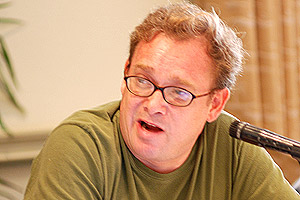
ADRIAN WOOLDRIDGE, THE ECONOMIST : I wonder if you have any comparative data, particularly about the Islamic world, because if you look at the Islamic world, you have levels of illiteracy of about 50 or 60 percent. You have only 20 percent of the Islamic world speaking Arabic, and they’re all sitting there chanting the Koran in Arabic, a language which they don’t understand. So they’re quite often just chanting nonsense to themselves. What sort of level of religious literacy is there in our great interlocutor?
(Laughter.)
PROTHERO: Well, the level that you describe. I think one of the false understandings in America about Islam is that the Koran is the way in. I think that for reasons you point out, most Muslims have never read the Koran; most Muslims have no idea what is in the Koran. This is sort of a Protestant assumption, that you get to a religion through its text. And even though Muslims – even though the Koran is a huge part of Islamic piety, it is more something that you say and that you hear than something that you think about.
This is the point a colleague of mine, Bill Graham, wrote about 10 years ago in a book on the Koran in the Muslim world, that it’s a spoken and heard text more than it’s a read text because most Muslims do not speak Arabic and Indonesia’s the largest Muslim country in the world. So, yes, Muslims don’t know much about their own religion.
WOOLDRIDGE: Do you have any data in terms of public opinion surveys of the Muslim world that will tell us the sort of thing that you’re telling us about Christians in America?
PROTHERO: I don’t know. I don’t know. There’s data on levels of literacy in the Muslim world and on how many Muslims speak Arabic, and we know that the Koran is rarely translated. It’s only very recently that Muslims have even allowed the translation of the book from its real language into these “false” languages.
MIKE ALLEN, THE POLITICO : Yes, sir. Thank you so much for such an inviting presentation to revisit your paradox. What’s your theory about why this still is such a religious country, why, as you say, 96 percent of people believe in God at the same time that we don’t know what David and Goliath is?
PROTHERO: Well – (laugh) – I don’t know. You all probably have as many theories about that as I do. The obvious theories are the First Amendment. This is a competitive spiritual marketplace, where people have a lot of religious options, where religion has not been yoked to political regimes the way it has in Europe. This is actually a really interesting recent development.
There was a study a couple of years ago in the Journal of the Scientific Study of Religion that was talking about the shift of young people from the religion camp to the spiritual but not religious camp. And one of the arguments was that the word “Christian” is starting to be associated with the word “Republican,” and that insofar as young people are liberal, they feel that to say that they’re Christian is actually to identify politically.
This is the sort of thing we always think about with Europe, right, with Christian parties and with the history of religious wars in Europe and the main distinction between Europe having these established religions in their countries and the United States not having that. And insofar as we’re starting to have a more informal religious establishment, where Christianity is associated with Republicanism and conservatism, I think that is potentially going to be pushing young people out, and that was at least the finding of this particular survey.
But so I would say the relative distance that Americans have had and, in some ways, continue to have between religion and politics is one source of the strength. And then another source is the fact that we have so many different forms of religion here that you can go find – (laughs) – everybody can find one for themselves. I think that’s a part of it too.
And then I think the ethic of religious tolerance here in some ways cuts both ways, but it makes it possible to be religious in a lot of different ways. I used to do a lot of work on Hinduism and Buddhism in the United States, and it’s really intriguing that Hindus, when they come to America, Indian-Americans who are Hindus, they become more religious rather than less. Religious – moderately religious people – become intensely religious people, and areligious people become moderately religious people. It’s the kind of place where you articulate your identity religiously, and not just in the South, where people say, where do you go to church? That’s the sort of opening question. That opening question appears in – not so much in New York City and not so much in San Francisco, but – and not so much in New England – but that sort of question is operative as well in American culture.
ALLEN: OK. Do you think that the rate of people who are religious eventually will decline along with the religious literacy rate?
PROTHERO: I think the fact that Americans are religiously illiterate fuels the high rate of religiosity. I think there’s a positive correlation. In other words, I think that one reason why we’re so religiously illiterate is because we’re so enamored of forms of religion that don’t value religious knowledge, and so I actually don’t think they work – the two work against one another.
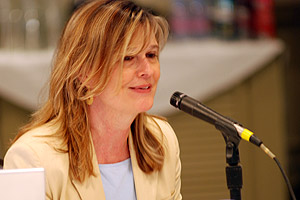
KATHLEEN PARKER, WASHINGTON POST WRITERS GROUP: Yes, I agree with everything you said except one thing and that’s – (inaudible) – interesting. But I just wanted to, for the record, note that I’ve lived in the South. All my life no one has ever asked me where I go to church. (Laughter.) Of course, I had five mothers, so I went to a lot of churches and it could be they just didn’t want to get confused – (laugh) – but just –
PROTHERO: I lived in Atlanta. I used to get asked that a lot.
PARKER: You did?
PROTHERO: Even in Atlanta, even in downtown Atlanta, which isn’t the South. (Laughter.)
PARKER: Not anymore, no. (Laughter.)
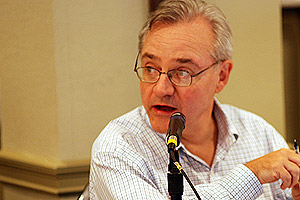
E.J. DIONNE, THE WASHINGTON POST : I wasn’t going to do this, but I want to make the flipside of that point, which is even in all of New York City, except in Manhattan, south of 96th St., this is also a relevant question, but that’s for another conversation. I loved your talk. I agree with you entirely in what you’re trying to push. And what I wanted to – it’s also a very good jobs program for religion and religion studies majors. (Laughter.)
What I wanted to ask you is if you could talk about where are school systems doing what you proposed, have you been involved in any controversies in order to bring this curriculum in, and what’s the prospect? Because I utterly agree with you, it’s an important thing. And, in a way, are you asking the public schools to do – to step in where our religious traditions have failed? I ask that as a sympathetic question. Is anybody doing it anywhere?
PROTHERO: Yes, OK. There are two questions there. I’ll try to remember the second one: Are we asking the public schools to do what religious traditions have failed?
But before I get to that, the answer is, yes, there are places where this is being done. Dave’s article in Time magazine does a good job in talking about this on the Bible side. On the side of the world religions courses, there’s an interesting experiment that’s being done in Modesto, Calif., and CBS Evening News is doing a piece on this, right – I don’t think anybody’s here from CBS.
But Modesto , a few years ago, put in a mandatory world religions course for 9th graders, and they had an opt-out provision, which I think is smart and which I proposed in my book for these courses, if somebody really objects and they say, whatever, I’m a Lubavitcher Jew and there’s no way I’m going to have a course where religion is discussed by some secular person in a secular way for my kid. Then I think, just for political purposes, it’s fine to have an opt-out.
One thing they found is that there is hardly anybody who opts out. Three a year out of 1,000 kids taking this course opt out. There was also a study that was done about a year and a half ago. I don’t know who did this. John, are you up on this? But it’s in my book. The study was done in terms of some of the concerns people have about world religions courses. One concern is about religious switching. Are the kids who were raised evangelicals going to come out as Hindus because they’ll think, wow, Gandhi and saris and yoga? And then they’re going to kind of be wandering around Modesto bug-eyed and trying to get flights to India?
And what people found is no religious switching, which to me is also disconcerting in a way, like the point of education is transformation, right? I wouldn’t be upset if one of my students who took a world religions class came out of it a Buddhist or a Sikh or something. That wouldn’t be out of the range of possibilities. But anyway, they found none in this high school over a course of – I think they’d looked at it for a year or maybe two years.
So Modesto’s interesting, and I went out there and I spoke to them a couple of months ago. I spoke to the people who were involved in this, and I spoke to students. They have an essay-writing contest on religion every year as a way to promote this. It’s an interesting place, Modesto. It has a very large evangelical Christian population, and it has substantial Sikh and Hindu populations, both. So it has an interesting combination of world religion, religious diversity and evangelical preponderance. So it’s an interesting place.
I got hundreds of e-mails from people in school districts who are trying to either start Bible courses, start world religion courses, ask about curricula. There’s a debate that Dave covers in the Time magazine article very well about the two competing Bible curricula. The Society of Biblical Literature , the academic wing of Bible Scholars in America, is working through a committee on coming up with some kind of curriculum. And on the world religion side, I’m not aware of initiatives as much, just local initiatives. I’m not aware of people trying to come up with a good high school world religions curriculum. It’s actually something I’d like to work on if I had time and help and money.
There’s a legislative initiative in Massachusetts. There’s a bill that’s been introduced to basically do my proposal in Massachusetts that would link it to funding for the schools where this legislator wants to have a mandatory Bible course and a mandatory world religions course. So there are things that are happening on that front.
Am I asking public schools to do what religious traditions have failed to do? The answer is yes and no. It’s no in the sense that where I started – that there are two ways to talk about religion, and the job of religious groups is to talk about religion in a religious way. And so insofar as I think Americans should be able to talk about religion in a nonreligious way, in other words, in a way that’s not filtered by a particular religious tradition for particular religious traditions purposes, then these are two different projects.
That said, religious traditions, particularly Christian churches and Jewish synagogues, used to do a good job of teaching kids basic information about the Bible, so that when they went into the high school class and they started reading Hemingway, or they started reading whomever they’re reading – Faulkner – they would have a sense of the Bible characters and Bible stories because of their religious training. And so they would know who David and Goliath were because they had been to Sunday school or they had been to synagogue. And that isn’t the case. So in that sense, I am asking the public schools to do what religious traditions have failed to do.
DIONNE: Just a quick follow-up, and I think this – (inaudible) – is there ever an ideological or party split? As I recall in Georgia, there was a party split on teaching the Bible. Is that common or uncommon?
PROTHERO: Well, I was really intrigued to learn that the Democrats are starting to get behind this, as a way to sort of say, hey, we’re into religion too and this is a way that we can be into religion because we’re not afraid of a secular Bible course or a secular world religions course. What we’re afraid of is the crazy religious right. I think, frankly, that these are projects that could have a lot of bipartisan support because – and in fact, when I was writing my chapters on the proposal, I was very consciously thinking that, well, OK, the religious right people are going to be happy with the Bible course and they’re going to be a little nervous about the world religions course. And then the people on the left, the religious pluralism, religious liberty people are going to be keen on the world religions course and maybe a little worried about the Bible course. But maybe they can get along together with these two – this combination of courses together.
CROMARTIE: David, a quick clarification of this point?
DAVID VAN BIEMA, TIME : Yes.
CROMARTIE: David did a cover story in Time magazine on this very topic.
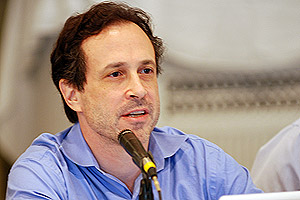
VAN BIEMA: My impression is that thus far, when this kind of stuff gets raised in a state legislature, it’s usually by Democrats, who either out of good sense or in order to establish their God credentials want to indicate that they’re in favor of this kind of thing. And then what has happened and tended to happen in those states of which there were three, really, is that the Republicans have either bottled up the initiative or have stripped it of its specifics, either because they had legitimate problems with it or because they did not want the Democrats to be playing the God card.
The most interesting thing that I’ve seen lately is that in – and my memory is like a sieve – and I’m going to say Alabama – I’m pretty sure I’m right – where this kind of dynamic actually unfolded and you had a bill that went nowhere. Very quietly, about a month ago, the Alabama State Board of Education put The Bible and Its Influence , which is one of those two curricula that he mentioned, on its list of acceptable books, which almost means nothing, because anybody – any teacher in Alabama can basically buy almost any book and teach from it. The one thing that it does is it gives the teachers some cover. If a teacher wanted to teach that curriculum and people got all upset, then that teacher would be able to point to the school board.
So the folks who were doing this kind of thing, for the most part – I wouldn’t say they totally despaired of the political process, but they tend to see it as more local initiatives.
KATTY KAY, BBC: I think Adrian stole my question, actually. But I have a broader one, which is, what’s the anomaly here? Is it the extent to which Americans are going to church, or the extent to which they know so little about their religion in a global context?
PROTHERO: I guess I don’t quite get the force of the question – of either of your questions. – Are we saying Muslims are really religious, they don’t know anything about their religion, so what’s the big deal about Americans’ religious illiteracy?
KAY: You mentioned Sri Lanka and the civil war there, Buddhists and Hindus, for example. I was hoping you might broaden it out beyond Muslims.
PROTHERO: The answer is I don’t know. I just don’t know. I’m not in command of any comparative data on how much Buddhists in Sri Lanka know about Buddhism. The narrative arc in my story has to do with what Americans used to know and how they don’t know it anymore, and what kinds of effects there are of that lack of understanding. So I don’t know – I would be – I would love to know.
I’ve seen some stories. There was a story about six or eight months ago on a study that was done of Ireland and how much people in Ireland knew about Catholicism and Protestantism. And they found that the Irish didn’t know very much at all, and it started to make me wonder to what extent the mandatory religious education you find across Europe was taking hold, in terms of what people were actually learning from it, because that is one difference between the United States and Europe, that most European countries have some form of mandatory religious education.
It used to be a way to inculcate you into the Church of England or into the Church of Sweden, or whatever, and then morphed over the years into something that looks more like a secular – it’s sort of a combination of atrophied Sunday school with a more secular religious studies approach. I don’t know a lot about to what extent those are working in Europe, and I know even less about what’s going on with religious education outside.
I should say there are journals that do this, if you are interested in this. There’s a journal called Religious Education , where there are scholars who write about the levels of religious education around the world, not just in the U.S. and Europe. And so there is information on this; I just don’t have command of it.
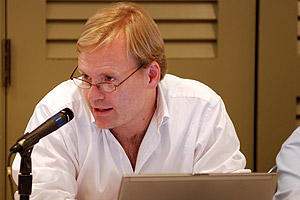
PROTHERO: Yes. Well, I think Americans need to know that Mormonism is a religion and that there’s a debate about to what extent it’s Christian, that it was founded in the United States in the 19th century, that it used to be polygamous but isn’t anymore. I mean, you could kind of fill these things in. To some extent, it’s the very basic information we don’t have about any so-called other religion, including Mormonism.
Mormonism doesn’t have that status, and it doesn’t have that status among this core constituency in the Republican Party. And in that sense, I can understand why the strategy in the Romney camp has been to just hush-hush this. I don’t think hush-hush is going to work, and I think it’s smart that he’s speaking out. But I can understand why they would do that because not only does he need to educate the public about Mormonism, he needs to spin it so that he’s not talking about goofy things; he’s not making it sound weird.
And it’s very easy for Mormonism to sound weird to non-Mormons because it is fantastic. There were these people who buried this scripture and Jesus didn’t go straight to heaven. He came to North America first and the scripture got dug up, and there were these plates and then the plates got lost, and then there were these stones that were used maybe in front of your eye to read hieroglyphics and there were hieroglyphics, and the weird parallels between the King James translation and the Book of Mormon was somehow there when these were buried, even though the King James version hadn’t been written yet. I mean, there’s a lot of stuff to explain.
CROMARTIE: You think he’s going to try to explain all that?
PROTHERO: No, no, no, no, no. (Laughter.) No, he won’t. But the point is he has a tricky – the third part of your question was what should be done? I think he needs to talk about his faith, and I think he needs to do it in a fulsome way. I think that he actually is a person of faith, and I think for the Republican nomination, this is good, to be a person of faith. So he somehow needs to say he’s a person of faith. He needs to make us feel it.
This is what John Kerry was just painfully bad at when Kerry had Bob Shrum , an atheist, telling him to shut up about religion, which was really super-bad advice. And then finally, when they realized it was bad advice at the end, it was, well, I was an altar boy when I was 13. And I’m thinking who tells you – what religious person tells you that they were an altar boy at 13, like, what grownup tells you that as a way to prove their bona fide sense of a religious person?
This is what nonreligious people say when they’re pretending to be religious. But I actually don’t know that Kerry – I mean, I think Kerry probably was, but he is an uptight New Englander, and New Englanders don’t introduce themselves to their neighbors for at least a couple of generations – (laughter) – and we certainly don’t talk about religion in public. That’s ill-mannered.
And so anyway, Romney needs to show that he’s a person of faith, which is important to his party, and then he needs to show that he’s not a person of scary faith and of goofy faith, and I think that’s a challenge. I would stick, obviously, with the parts of Mormonism that are most like Christianity, and there’s a lot he can talk about. He can talk about Jesus, which is a little scary in terms of the ecumenism problem, but he can talk about Jesus, which Mormons are very – they’re really into Jesus. Mormons like to say, we’re more into Jesus than the rest of the Christians in America, and they actually are. They’re actually more into Jesus than evangelical Christians are, so he can say that.
CROMARTIE: What does that mean?
PROTHERO: Well, I wrote a whole chapter on the Mormon Jesus in my last book, American Jesus . It’s hard to know why it is. Part of it is that Jesus is the best answer to the accusation that Mormons are not Christians. “We Mormons are crazy for Jesus.” If Mormons go into creed and doctrine, right, then they pretty soon get into God as a body and there are alternate universes and each of us can become divine. And they get into heterodoxy, and they don’t want to go there, so they want to head toward Jesus.
Now, the way they interact with Jesus is not in this personal kind of touchy – they don’t like the friend like – they don’t have a friend in Jesus. They have a more hierarchical conception of God, and so they’re not comfortable with Jesus is my buddy. It’s not arm’s length, but it’s a little more reverential. I want to say it’s more Confucian, it’s more hierarchical.
CROMARTIE: They admire him.
PROTHERO: They worship him. They worship him as God, and their piety is centered on him. The Book of Mormon is a book about Jesus. It’s a book about the stuff Jesus did and the church Jesus established, and they are reestablishing the proper Jesus church on earth. Some of their authors that I write about in that chapter – Mormon theologians have written 12-volume treatises on Jesus. It’s almost like we’re back in the period of the Reformation with these exhaustive Christological reflections. So it’s a highly Christological tradition, and I think he can emphasize that where he’ll only lose the Republican Jewish folk if he emphasizes that, which he probably is not going to worry about.
CROMARTIE: If I could just mention, before we go to David, if you go to pewresearch.org/pewresearch-org/religion, we had a session here with the leading historian of Mormonism in America – some of you were here – Richard Bushman, who’s not only a historian – wrote a biography of Joseph Smith – but he’s also a practicing Mormon. We had a session here with Bushman last May, and we discussed all these issues with Bushman, so you can find that transcript at pewresearch.org/pewresearch-org/religion if you weren’t here and you haven’t read it. It’s fascinating.
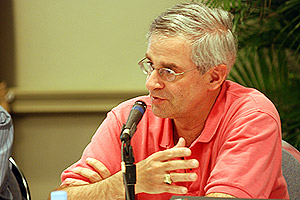
DAVID SHRIBMAN, PITTSBURGH POST-GAZETTE : Steve, having been born in Salem and being an editor now, I have to point out that uptight New Englander is redundant. (Laughs.) But I wanted to ask you, you make a persuasive case that Americans are ignoramuses when it comes to religion. I was wondering if you would give us a critique about American politicians and whether they are ignoramuses about religion too when they start talking about it.
PROTHERO: Yes. Well, I think that’s one of the assumptions of a piece I wrote for Beliefnet: “ A Religious Test for the Presidency .” My argument there was not that we need to make sure that our presidents believe in God or are Christians, but we need to quiz them. And in that piece, I challenged journalists to ask factual questions of presidential candidates and to find out if they know anything about religion, if they can pass the test. Like, do they know the first book of the Bible or do they know – this question that has been asked by some about Sunnis and Shiites, I think, is really instructive when you find out that Sylvestre Reyes of the House Intelligence Committee, who’s running it, doesn’t know the difference and doesn’t know that al-Qaeda is a Sunni group. This is really astonishing. I don’t know how you can even make one step toward understanding Islam and terrorism without knowing that basic fact.
So my assumption is that they know very little, but as a factual matter, the only way to find out is to force them to take the test in my book, which they’re not going to do unless they’ve already got the answers ahead of time, or to have journalists ask them questions. Now, that said, that’s the assumption. I think part of the reason why I think empowering citizens to know more about religion is important is because I think some of the reflex that politicians have to just invoke religion would start to go away because right now – this is what I was trying to say about the invocation – that right now, you can just play the religion card a little bit without there being any follow-up.
[as in religion]
CROMARTIE: Some versions do. No, I’m just kidding. (Laughter.)
PROTHERO: So how do you get from here to there? Now, to say, I’m opposed to gay marriage because of the Bible, to me, that makes perfect sense. You can come up with all sorts of Bible quotes. Now, whether politicians who do that can do it, I would love to see that, and it would be fascinating to get into a discussion about the Book of Leviticus with a politician who wants to – and this is part of the point about The Year of Living Biblically book, that we feel in some ways constrained to care what the Bible says about homosexuality, but we don’t feel constrained to say what it says about men shaving or about what people should eat or about who should be stoned or whatever. So my – stoned in the sense of –
CROMARTIE: Rocks. (Laughter.)
PROTHERO: Yes, exactly. So yes, so that’s how I would respond to that. I don’t think politicians know much, and I think if we knew more and if journalists felt empowered to test them more, we might chase some of the silly religious arguments out of the political space.
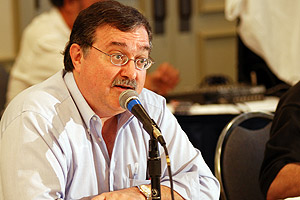
WILFRED MCCLAY, UNIVERSITY OF TENNESSEE AT CHATTANOOGA: I’m going to deliberately phrase this in a way that will give you a big, fat target because I want to draw you out on this issue. I think I know what our British friends are getting at with their questions that you found perplexing about comparative data. And that is – let me offer a counterproposition to what I think you’re implicitly arguing, that former generations through human history and in various societies have been far more ahead of – had a far greater degree of religious literacy than what we now see in contemporary America.
Well, let’s suppose that, in fact, you found that the Muslims that Adrian was describing are abysmally ignorant of the doctrinal tenants of their faith, as I think we all suspect that they must be. Could it be – and suppose we go back to the 13th century and look at the majority of Christians in France or anywhere on the European continent – I guess I could include Great Britain too or England at that time – (laughs) – and find an equal level of ignorance among the enormous mass of the laity?
It seems to me that you could argue that, in fact, religious illiteracy is the defining feature of religion throughout most of human history with the exception of 17th century New England and a few other situations – post-Reformation settings where you do have the unusual phenomenon of high rates of literacy. And as I said, I’m giving you a big target here, so I’m kind of exaggerating my argument a little bit for your sake.
But then the counterargument would continue that the important thing about religion – and religion is not just a set of propositions and doctrines, but it is an ethos, it is a social institution which can’t be readily analyzed by going to this sort of canonical scriptures and then quizzing people about their knowledge of them, that in a sense, that’s irrelevant to an understanding of the larger ethos, the way that it shapes a culture.
And just to give an example, I was reading on the internet this morning that a couple of professors from Georgetown have issued some kind of an apology to the Muslim world for all of the bad things that Christians have done over the centuries going back to the Crusades and –
CROMARTIE: Is this a long document?
MCCLAY: No, it’s actually very short. It’s kind of both abject and lazy at the same time. (Laughter.) And among other things, it struck me – and these are both people – I won’t name them – but they are both people who are students of the Islamic world, and certainly, don’t they understand that this kind of apologizing is the currency of the Christian world in the sense it doesn’t really register for the very people – and of course, in a sense, it’s really intended for a Western audience and not for the people who putatively it’s intended for, so it’s a complicated document.
But this is what I’m getting at, is that there’s an ethos here that if you really want to look at the vibrancy and survivability of religion in a culture, that’s what we want to look at and not so much whether these factoids are relevant.
And by the way, I think Romney really needs to do more than what JFK did. If you look back at JFK’s speech , it’s very dated because he’s speaking to a Baptist audience, so he plays the strict separationist card. And I think actually going back to that is a great measure of the distance that we’ve come in accepting the argument that religion ought to have a place in public life, which JFK was very, very much ruling out.
And I think Romney ought to – and he’s not going to take my advice, I’m sure, but he ought to be less defensive than he has been but stay away from the doctrinal, as I think you’re suggesting, because the doctrinal is going to lead him down the road just as if Kennedy had said, but let me explain indulgences and the treachery of merit and all of that to you. It would seem very weird to most – in fact, to many – Catholics who don’t know the doctrine themselves. (Laughter.)
PROTHERO: No, you raise interesting points, and I have thought about this a lot actually. I think broadly, the question, the way I would frame it is, it’s a so-what question. Who cares about these factoids? Is it to be a Christian if I want to pooh-pooh your friend who thinks to be a Christian is not to have premarital sex and to not smoke pot? Why does being a Christian have much to do with knowing the Nicene Creed or being able to recite the Sermon on the Mount. That’s equally potentially irrelevant.
I think my response to that is there’s this religious studies professor, former religious studies professor, Ninian Smart , and you might have read about him, who has this idea that religion operates in these various dimensions. And if you look at religious traditions around the globe and across time, you’ll see that there’s a doctrinal dimension and there’s an ethical dimension, and there’s an institutional dimension and there’s an emotional dimension, and there’s a narrative or a mythological dimension.
Religious traditions that develop over time develop this fulsome range of things that they do. I think that my observation is that that range of religious dimensions has narrowed in American culture, so that religion has narrowed down to being about the emotional and the ethical, and that that is unusual in the history of religions, and that, yes, religions are about ethos, and, yes, the majority of people in the majority of the world have not been able to list their 10 great ideas of their religious traditions.
And so I’m not so keen on – if I really wanted to sustain an argument that America is really idiosyncratic here, that would have to be a comparative project, which I didn’t do. My project has more to do with religion is out there, religious reasons are out there in the public space. And Americans are in this strange situation, in a democracy which hangs on an informed citizenry, that they’re uninformed. And so that to me is more the issue, whether this is normal in the history of religion or abnormal, or whether it’s like the Muslim world or not. I can see the arguments going different ways there.
In religious studies, as an academic discipline, it’s been very clear that for very good reasons, the discipline has moved away from the notion that religion is essentially about beliefs and scriptures and toward the idea that it’s probably more essentially about ritual practice, and you can do ritual practice without knowing the stuff, without knowing the factoids, as you say. And you can have that ethos operating in you. So I guess for me it has to do more with the doctrines and the narratives that are out there in the public space, and we, Americans, don’t really know what the references are, and therefore we can’t be as engaged as we ought to be.
CROMARTIE: Before we take a break, I meant, in introducing Stephen, to tell a religious illiteracy joke, and I’ll do that now, which is simply this: Two senators recently were having lunch in Washington in the Senate dining room. One was a Democrat and one was a Republican. The Republican said to the Democratic senator, the problem with the Democratic Party and with you, you all don’t even understand religion. You don’t know anything about religion. In fact, I’ll bet you right now $20 that you can’t even recite the Lord’s Prayer. And the Democratic senator said, you’re on. Let’s bow our heads, he said. So they bowed their heads, and he said: Now I lay me down to sleep. The Republican pulled out $20 and said, I didn’t think you could do it. (Laughter.)
CROMARTIE: A request that’s been made, I think wisely, that – and I have a copy of Steve’s book here -we make photocopies of the religious literacy test. You can take it. We’re not going to quiz you on it. (Laughter.) But the – self-administered for you to have and then also the page where the answers are. You will not be graded.
PROTHERO: I also have a sheet of the answers my students give and how well they do that we could copy to give to people.
ADELLE BANKS, RELIGION NEWS SERVICE: (Off mike) – answer this question before, but when you just referred to ritual practice, but I’m wondering with such biblical literacy, if the churches and other houses of worship are sort of social clubs instead of centers for religious education, and if so, what that means for the houses of worship and for society?
PROTHERO: That was Katty’s question just a minute ago too, if the churches are social clubs and therefore not really religious. The megachurches are not really religious. They’re just places where people get together to play basketball and meet their future spouses and have good coffee.
CROMARTIE: By the way, did you see that survey about Willow Creek that just came out?
PROTHERO: No.
CROMARTIE: The Willow Creek megachurch – I won’t finish your answer, but Willow Creek had somebody do a study of all the people in their church and what they knew and did not know about doctrine, and they found out they had totally failed. And Willow Creek came out and said, we haven’t done anything here but get people here. Did you see that, John? Yes, OK.
PROTHERO: I want to see that. Where was it published or where was it –
CROMARTIE: I just saw it in the news accounts . Right, John?
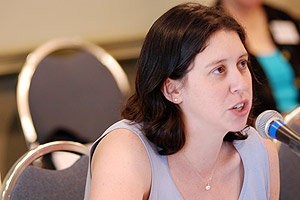
NAOMI SCHAEFER RILEY, THE WALL STREET JOURNAL : Just very quick on this point, what is it that they’re doing then? They talk about kind of Sunday school and Bible classes –
CROMARTIE: You’re talking about Willow Creek?
SCHAEFER RILEY: Well, Willow Creek, but any of the megachurches. I’m just trying to figure out – Yes, I know, but it’s related to the social clubs. I’m just trying to figure out if you can tell me what they’re doing with all the time that people are spending there.
PROTHERO: Well, one thing they’re not doing – and this is clear – you can look at the sermons, right? Many of the megachurches, there’s no content that I would call standardly religious in terms of doctrine and narrative in the sermons. Protestant tradition is supposed to be about the sermon, and the Catholic is supposed to be about the Mass, the Eucharist, and so that’s one issue.
There are some megachurches that do actually old-fashioned biblical preaching, and this is something that I also talk about in the book is that the sermons from the 17th and 18th into the early 19th century were always biblical exposition. That’s how they did it. And now the sermons are about – the other day, I was in the Whole Foods and I ran into this friend of mine and she was having a really hard time and it’s sort of like life advice kind of stuff. Joel Osteen is a really classic example of this, and he does get criticized by some evangelicals for not delivering any content. So that’s one issue.
What they do is they provide a place where you can have a Christianized whole life and you can have the basketball team and you can have – some of these groups are very good on allowing a decentralized – small groups will get together, people will come up, the needlepoint club and the book club, and this and that. So it’s clear that that’s one of the successes of these churches. The question then becomes to what extent is that religious and how narrow is our definition of religion?
And this is where, as a religious studies scholar, I just have to say I’m more confused than you all are because that’s what we get paid in a way to do is to be confused about religion. We don’t know what – sometimes I say in academia, the only discipline that doesn’t know what religion is, is religious studies. Everybody else, the politicians know exactly what it is and the economists know exactly what it is and the literary critics know exactly what it is.
And I think that religions have always provided this kind of social service. They’ve never been not secular. Religions have always had a secular element to them, and how you carve out the sacred and the secular is just really tricky. But from a psychological perspective, I think you can talk about this and you can ask people why they’re there, and people will often say that they’re there – they’re not there because of the salvation question. They’re there because their girlfriend is there or they’re there because they want their kid to get an education in the Bible or they’re there because they love the coffee at Son’s Bucks, which is one of these places that instead of Starbucks, it’s Son’s Bucks, S-O-N-S Bucks Coffee Shop. So I guess I would agree with you, but I would say I just don’t think the line there between the secular and the sacred is that easy to draw.
CROMARTIE: But you know, during the Clinton administration, Hanna Rosin, who is with The Atlantic now, was at the Pos t, did a front-page piece in the Post after having spent many days at McLean Bible Church in the Washington area, and this goes to Naomi’s question of what did they do there? And she found that there were like 14 different groups you could join besides AA, recovering from divorce, recovering from alcohol, recovering from drug groups, dating workshops. There were all these groups. She began the article in the Post saying Bill Clinton would be very comfortable at this church.
SCHAEFER RILEY: (Off mike) – they say that they are going to Sunday school. There’s adult Sunday school and there are Bible studies at all these churches, and so I’m just wondering if there’s something else going on there other than Bible study and Sunday school, whatever those things mean.
PROTHERO: Yes, but in the Sunday schools, they’re not reading the Bible and talking about it, and these are huge generalizations, right? So it depends on what you’re talking about, and Krista had wanted to get in on this point. She may have something to add, but a lot of times in the adult education classes, in the Sunday school classes, they’re talking about the problems that they have. They’re talking about how to deal with their kids or they’re talking about how to witness to their friends or they’re talking – they’re not talking about the narratives and the doctrines of their tradition. And in some cases, their tradition doesn’t even have any doctrines to share.
BANKS: I just wanted to – (off mike) – the first part of your answer to my question about the whole basketball, social club, etc., because you were talking about megachurches, and my question was really about churches in general, that if they’re not helping with literacy, are they more than social clubs? Are the smaller churches also –
PROTHERO: Well, OK. And some are positive things the churches are also doing, like they’re helping poor people. This is something that is really clear in CCD, in the Catholic tradition. What happens in catechism classes and Catholicism is kids learn that they should help the poor, and that’s pretty much the only thing they learn. There’s a study in a book called Young Adult Catholics . And it does a study of the effects of catechism classes on Catholic youth and what they actually learn. It turns out there’s zero correlation between knowledge about the Catholic tradition and attending catechism classes. Zero. So insofar as the point of CCD classes is to educate you about the Catholic tradition, it’s not doing it at all.
The only thing kids learn in CCD is that they should help other people, which is not an inconsiderable thing to learn, and which is at the center, in a way, of Catholic ethics. So they are learning that, but they’re not learning we should help the poor because in the Gospel of Luke, Jesus says, “Blessed are the poor,” or because in the Catholic tradition, we have these encyclicals like – (unintelligible) – that says such-and-so. And when I ask my students what they learned in catechism classes, the first thing I heard from a bunch of my Catholic students was they learned how to color, so they’re coloring things; they have things in front of them and they color them.

RACHEL MARTIN, NPR: Sure. In the spirit of kind of continuing this conversation, it sounds like, though, this is a correction of sorts. There was a time when faith was all about knowing the doctrine and being enmeshed in that and being able to recite things and knowing the history and the context. And this is what Vatican II was supposed to abolish, and it was about a personal Jesus and having a direct relationship. So are you arguing that this has now been – it’s an over-correction of sorts?
PROTHERO: Yes, well, I’m back to Bill’s comment earlier in terms of – I’m not sure how to answer that because I think in the American context, you did have a peculiar form of religion with Puritanism that was peculiarly intellectual. This is why evangelicals like to point back to Jonathan Edwards as their hero because it makes them look like intellectuals, and insofar as he is their ancestor, they are intellectuals, and insofar as they are now all about loving Jesus, they are not intellectuals. So I do think there is an anomaly here. I think in the history of world religions, people aren’t running around in their heads – ordinary people are not running around their heads with this whole basket of doctrine.
Now, they are running around with stories. So in the Hindu context, for example, in India people know the epics, even today. It’s changing over the last 25 years, but Indians can tell you the stories of what Krishna did with the Gopi girls and stuff like that. They know those stories. They don’t know what the Yoga Sutras of Patanjali say about exactly how the transformations of yoga work on your karma. They don’t know that stuff, but they do know the stories.
And so I guess I want to say that it’s maybe in the realm of storytelling that I see more of an anomaly here than in the realm of doctrine. I think doctrine in theology is something that in general elites tend to do, and in 17th and 18th and 19th century America, there was this interesting situation where ordinary people did doctrine too. And now we’re back to maybe a more normal situation where ordinary people aren’t doing doctrine, but the anomaly is the ordinary people not knowing the stories, because stories throughout religious history have been transmitted to ordinary people verbally. The key thing is you don’t need to be literate to know stories, and in general, people do tend to be literate who know doctrine. So I guess that’s where I’d go with that.
VAN BIEMA: I’ve only had the opportunity to visit one class where this was being taught. I’m back on classes again in public schools. And –
PROTHERO: The Bible, the Bible class.
VAN BIEMA: Yes. It was outside San Antonio, and I was very impressed by it. But I called back a couple of weeks ago, and they said the class had been canceled for lack of attendance. Now there are two possible reasons –
CROMARTIE: Is it a public school, David?
VAN BIEMA: Yes. It was offered as an – (off mike). (Laughs.) And one reason really does go to that desire of his because part of the problem is that the Texas public schools have adopted what the woman told me was a four-by-four system, where you have to take four years and four subjects mandatorily, which really lowers the number of elected courses that you can take. So if you’re taking band and football, then forget it. You’re not going to be taking the course about the Bible – (off mike). So that’s one frustration that –
The way it was explained to me was that there’s an extremely narrow band by which – this band and this band. So that could be a problem. I have difficulty imagining this as being made mandatory, even with an opt-out, because I think it then becomes extremely political. But on the other hand, then you’re at the mercy of the testing process in the schools and people taking classes because they have to take tests, so there’s a little bit of a problem there, which -.
PROTHERO: Can I interject in there real quick, Dave, just that issue?
VAN BIEMA: Yes.
PROTHERO: Actually, the standards in a lot of states are actually really good on religion. And so there is an argument to be made that sort of lives up to the standards. On the testing question, if you were just making California, for example – if you just take the standards seriously, they’d have to start doing a lot of the stuff I’m talking about.
VAN BIEMA: (Off mike) – described in a much more broad-brush way to me, but it’s possible that they were not actually reading their standards correctly, in which case that would be fine, I guess. But the other thing that people kept saying to me, and you may remember that I came out in support of doing this, so these are all kind of sticker-shock problems, was, Why can’t we, rather than teaching a course about the impact of the Bible or the impact of religion in America, why can’t it be integrated into the other courses that we already teach? And in some ways, there’s something attractive to me about that because there’s something a little strange about just teaching a course about the Bible, because it inevitably does not get connected. As much as you would like to try, there’s so much data.
When you think about what you’re trying – what you think about the good old days, for those brief couple of 100 years when Protestantism was actually into all this, the implication was such a long process, and people were able to absorb so much data over so many different years, that the notion of even approximating that in a year’s time, especially if you want to add in world religions, is really a tough problem.
But if people really, really, really got serious, if the mandatory part was that in each of your English classes, and in each of your social studies classes, you had to spend X-percentage of it talking about the impact of religion or of the Bible on that thing, in some ways, it would solve a lot of the problem that I was made aware of in your book and support you in.
PROTHERO: Yes, well, I think that comes up a lot when I talk about this, and my response is – I have a couple of responses. I think one is that if that could really be done well, I probably would be good to go. So then it becomes a question of whether that’s possible and which approach is best, and I think there are a couple of problems with the integration model. One is that that’s the model we supposedly have now and it’s not working.
Another is that I think to teach about religion, given the constitutional issues, you need to be intentional about it. In other words, you need to know the difference between teaching and preaching; you need to know that it’s a sticky wicket; you need to know that it’s OK to talk about it. So there needs to be some training on teaching about religion as teaching about religion.
I also think that the issue of constitutionality and holding people to high standards about what they’re doing is easier in a dedicated course than it is in a course where you’re doing it in passing. I think that in some ways, it’s more likely to have constitutional problems with a biology teacher talking about creation than it is in a Bible course or a world religions course, where there’s going to be awareness of scrutiny with parents who are concerned or there’s the Hindu family in town and the kid’s in the Bible course. They’re going to keep an eye on it in a way that they might not keep an eye on the civics course or the social studies curriculum.
The other issue is an issue of training. Right now, we have integration of world religions into a lot of courses in social studies and world civ. A lot of these 8th and 9th grade courses that students take that are supposed to be their world civ curriculum, they spend usually two weeks on religion. That’s not that uncommon. So that means, I guess, that they spend a day on Buddhism. So in the 45 minutes that they’re doing Buddhism, they get to say stuff like there’s a religion; there was this guy named the Buddha; he sat under a tree; he achieved enlightenment and now people in Asia worship him or something, whatever they say. I don’t know what they say.
So there’s no space to do that in that curriculum, so part of it becomes how serious are we taking this subject, and I think this is also the way – in a way, we’re mirroring what happened in higher ed because in higher ed, religious studies was done in other departments until the ’60s, until we started having dedicated religious studies departments, dedicated religious studies courses. And we even have this argument in higher ed, it’s better to teach about religion in international relations courses, in communications courses, in English courses.
But the fact of the matter is that it doesn’t get done that often because people don’t feel competent, and then when people do start teaching about it, often they don’t know enough about it to stay away from stereotypes and delivering incorrect information.
SCHAEFER RILEY: I was actually fascinated by your discussion of the history and I’m sorry that some of the reviewers didn’t pick up on that, but I’m particularly interested in what you were saying about the temperance movement and abolitionism and how those people overrode in a way the emphasis on understanding the theology.
And I guess what bothers me a little bit is this distinction that you seem to be making between the people who were engaged in these actions and they didn’t – I guess they started to not understand what the real biblical basis was for them. But then when you brought up the Sermon on the Mount, you were discussing how a lot of people can’t understand the pacifist movement in America, the history of it, without understanding the Sermon on the Mount, and I guess I’m wondering what is the end goal here?
If we’re trying to teach religious literacy so that people understand what they’re looking at when they go into a museum, I guess that’s purely a thought experiment and kind of just being concerned that people are educated on the subject. But then there’s this whole sort of political or a kind of activist element here. Are you hoping that people understand these concepts more deeply so that they can take up just causes like abolitionism or the temperance movement? (Laughs.)
PROTHERO: Yes. I’m all about reviving the temperance movement.
SCHAEFER RILEY: Probably not a popular one here. But I guess –
PROTHERO: As you can tell from last night.
CROMARTIE: And tonight.
SCHAEFER RILEY: It’s all off the record now, right? No. But I’m kind of wondering what some of the motivation here is with the literacy. How much is it that you’re hoping people who get this kind of education will take up those causes again, and then, is this a cycle where people then take up the causes and forget about the initial theology behind it again?
PROTHERO: Well, the way that I frame it in the book is more participation in democracy, so it’s more political and civic. The way that I tend to think about it and talk about it also has – I’m a professor, so I care about education. So for me I think it’s scandalous that you can graduate with a B.A. from Boston University and not know that Islam is a world religion or not know how Sunnis and Shiites differ, (missing words?) or not know that Ramadan is a Muslim holiday..
So the educational piece of it is an important part for me, and I think that if you’re going to send kids – if you’re going to pretend that high school education means that a kid is somehow educated or that a BA from an American university means that someone is fairly well-educated, then I think it’s a pretense if they don’t know anything at all about religion, and that has something to do with being an educated person. It also has something to do with citizenship, but I think the way I would go with that is mostly about the scandal of pretending you’re educated when you don’t have that kind of information.
The political thing, no. I don’t think I’m interested in reviving biblically-based social movements. I don’t think that’s my goal. My goal is – it would be nice if students in American high schools knew that the civil rights movement was a religious cause, which they often don’t because it’s often not described that way, which is ridiculous. It also creates contemporary misunderstandings.
There are a lot of misunderstandings about evangelicals in the United States today in part because of our lack of understanding of the civil rights movement and because of our lack of understanding of abolitionism. And for people to be told, evangelicals were at the forefront of the women’s rights movement, this is not – this is news to most Americans, certainly most New Yorkers. (Laughter.) So that’s my issue. If we become more biblically literate, could we get up an anti-slavery movement in the Sudan? I think frankly that might be easier to do if we were more biblically literate.
One thing that really astonished me when I used to teach this is – I used to teach the biblical arguments for slavery – (unintelligible) – against slavery with my students in my American religion courses. It’s amazing to see how that discussion went along and how Americans debated that issue almost entirely on the basis of the Bible, and they did it in a very sophisticated way. And the comparison I have is the debate we had about Islam after 9/11 when it was basically: Islam is a religion of peace, no, Islam is a religion of war, no, Islam is a religion of peace, no, Islam is a religion of war, no, Islam is a religion of peace, no, Islam is a religion of war. That was our discussion.
PROTHERO: Yes. That was the extent of it. We have no basis at all except for some pure guesswork or ideology or sensibility for where we should go and – (unintelligible) – with that because we didn’t have any information on which we could move, and so that’s more my concern. I think we should have some information on which we can have these discussions.
CROMARTIE: You remember that Paul Vitz did a study in the late ’80s of American textbooks, and Dr. Martin Luther King was described not as a minister, but as the son of a minister in American history textbooks.
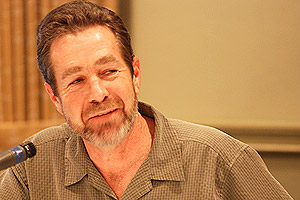
STEVE LAGERFELD, THE WILSON QUARTERLY : I actually have two questions, which I’ll try awkwardly to put into one. One is about the social aspect of this, of religious practice that you talk about. I just wonder how new that really is, or how it really has changed, in the sense that – my scant knowledge suggests that that’s always been a very important dimension of religion.
And historically, we have the lore about church suppers and courting the pastor and all sorts of things like that. And it was also a time when there were fewer competing social institutions, or institutions of any kind, for people to gather around and especially in rural America. So I wonder whether what we’re seeing is somehow qualitatively different or quantitatively different, or is it just more articulated and better marketed?
My second question is maybe dimly related to that, and it has to do – I think I actually detected the answer in your answer to Naomi’s question, and that has to do with this break that you described back in the 19th century with religion suddenly becoming all about morality and not about Jesus, not about the text, not about any of these other things.
That’s a pretty broad statement, and I wonder what it really, really means, especially when I look now at the practice of morality in contemporary America, when you look at the surveys, which I can only dimly remember, of the behavior, for instance, the moral behavior of people, and you compare religious people with nonreligious people and there are surprising similarities, actually.
PROTHERO: Yes. I don’t want to be misunderstood at all in saying that there’s a trend toward people being more moral. That’s not my point. The point is that there’s a trend toward people reducing religion to ethics. We’re talking about thinking about morality, not doing morality. It’s well-known that there are more activities with prostitutes at the Republican National Convention than at the Democratic National Convention.
CROMARTIE: No.
PROTHERO: So anyway, that’s not what I’m talking about. I’m talking about –
UNIDENTIFIED: Can we check the stats on that? (Laughter.)
PROTHERO: I have some insider sources that have given me that information. Anyway – so, no, it’s not about being more moral. It’s about thinking that religion is about ethics, which, to me, is very curious. I didn’t get into religious studies to be an ethicist. I find ethics, frankly, a little bit boring. I think religion, to me, is exciting. Religious traditions make claims like, you are going to hell, but if you do something, you will go to heaven, or they make claims like, you can be omniscient. This is something I’ve had Buddhists tell me. It’s possible for a human being to be omniscient. That’s cool. That’s religion.
CROMARTIE: Especially if it’s true.
PROTHERO: Or you can achieve enlightenment; you can eliminate suffering from your life. These are amazingly interesting claims. They’re much more interesting to me than the claim that we shouldn’t kill our mothers because we’re angry at them. I don’t think Jesus came into the world to tell us to help old ladies across the street. That just seems preposterous to me. Nor did the Buddha, nor did anyone else. All societies have ethical systems. Religions incorporate ethical systems into them, but they’re not about that. That’s sort of tangential to what they are.
It’s very curious to me – this is basically a commentary on contemporary American politics for me. I just find it super-curious that the word “religion” and the word “Christian” are cathected to the words “values” and “morals.” I just think it’s strange. I think it’s strange that religious people would be satisfied with understanding themselves purely in light of certain ethical positions that have political, public policy spin-offs. It’s weird to me; it’s really weird to me.
And my thinking on this has just made me think about this historically. How could this possibly happen that someone would write a memoir about the Christian life where the Christian life is about not having premarital sex and not smoking pot? I don’t think Jesus came into the world to tell kids not to smoke pot. That wasn’t why he was dying on the cross.
And so I thought about when that happened, and I believe that that happened in the early 19th century with the takeover of American religion by evangelicals, and specifically, with the hope of Christian perfectionism and creating the kingdom of God on earth and creating a Christian civilization and that there was this great fervor and great excitement that that could happen. And there was this amazing outpouring of social reform in the 1830s and the 1840s and the 1850s, and it was amazing.
And various denominations of evangelical Protestants decided that they didn’t want to argue about being Methodists and Baptists and Lutherans and Episcopalians. They just wanted to do their thing, and so they agreed to table their religious – their theological differences, their denominational differences, and they decided that what they were doing was fundamentally about fill-in-the-blank, abolitionism, good causes.
Sometimes when I teach biblical debates about slavery, my students get confused. They think I’m in favor of slavery or something. I don’t want to be misconstrued of being in favor of slavery. But I do think it’s really strange. It’s an anomaly and it’s an anomaly to be explained, and it’s not something that you see in other religious traditions that they’re confused about this.
UNIDENTIFIED: I just want to say that it’s not crazy to imagine that religion is about helping the old lady across the street. The Beatitudes, “as you’ve done with the least of these, so you’ve done to me.” Isn’t that what religion is about- that’s not insane extrapolation from the Bible is it?
PROTHERO: No, I’m not saying that Jesus would tell you to kick the old lady in the ass. (Laughter.) I’m saying that that’s not the purpose of the tradition. It’s this accidental property – well, it’s not even – no, no. Applied religion is sitting down and meditating and trying to achieve enlightenment, or doing whatever it is that the Catholics tell you you need to do in order to get salvation and the good, the big thing, like the big brass ring.
I think religions make these stupendous claims about the big brass ring, and I think that when we confuse religion with morality, we’re narrowing religion down to something that, to me, I find frankly boring. I find hard-core religious people who are making amazing claims about the religious life to be fascinating, and I find people who claim that a religious tradition is just about some moral principles – religions don’t disagree on moral principles. This is part of why when you have ecumenical meetings, the only things that come out of them are banal moral principles. It’s because religious people don’t agree on anything, the religious. They only agree on accidentally religious things like morality.
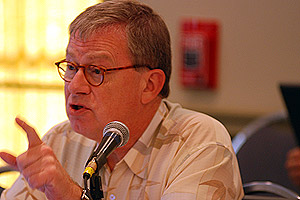
MICHAEL BARONE, U.S. NEWS & WORLD REPORT : (Off mike) – the 19th century movement toward reform, my impression is that that comes largely out of one denominational tradition from the New England, Yankees, Puritan, Congregationalist tradition –
PROTHERO: Well, that’s false; that’s not true.
BARONE: Really? Tell me more about that. I’d like to learn more.
PROTHERO: Well, if all the great 19th century voluntary associations – one of the things that is intriguing about them, from the American Antislavery Society to the American Temperance Society, the Women’s Christian Temperance Union, the American Bible Society, the American Tract Society, all these groups, voluntary associations, just a really wonderful and interesting thing about them is they were nondenominational, and they were led sometimes by Methodists, sometimes by Baptists, sometimes by Congregationalists.
The Congregationalists by no means were at the center of any of these enterprises, including the mission’s enterprise. All these enterprises of the early-to-middle part of the 19th century were by design nondenominational, and it was inside those nondenominational institutions that Americans forged the contemporary understanding of what religious tolerance is all about. It’s there that we get to the Eisenhower ’50s and the Protestant-Catholic-Jew thing that we were talking about earlier, where we sort of agreed to disagree on the differences, the religious differences, across these traditions. That was started by Methodists and Baptists and Congregationalists, who said that in the 1830s.
And then we get to the 1950s, and we see the communists over there and we say, hey, we’re not so far away, we Jews, Protestants and Catholics. And then after 9/11, we started to try to incorporate Islam into that, so we have the Judeo-Christian-Islamic tradition. That whole thing, which is the sort of let’s agree to disagree, begins in that period, and it wasn’t at all led by Congregationalists. They were just part of it.
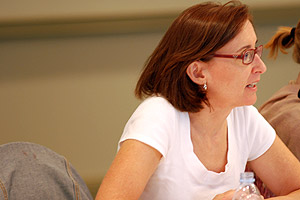
JACQUI SALMON, THE WASHINGTON POST : I think that one point that needs to be made is how Americans learn or don’t learn or get misinformation from the popular culture. For example, my son has a fairly accurate understanding of the Rapture from “The Simpsons.” (Laughter.) He shocked me with a nutshell version of it one day, and apparently, he seems to be working on Hinduism too, as well. I guess there’s a Hindu character in the –
PROTHERO: The best known Hindu in America, actually; owns the 7-Eleven there, whatever it’s called.
SALMON: You say that evangelicals are very concerned about this lack of literacy. Are they doing anything about it? And as I understand, and David might be able to enlighten me, some of them have opposed these Bible literacy programs because they are concerned about them being taught in a secular setting.
PROTHERO: Right. There are some evangelicals – (unintelligible) – and I didn’t talk about this in my historical part, but it’s in my book. There were these Bible wars of the 1830s, ’40s and ’50s in places, cities that started getting enough Catholics basically for the Catholics to start to say, why are my kids reading the Protestant Bible?
And they had fights about it, and in many cities the Bible courses went away in the early 19th century because Protestants and Catholics couldn’t decide which Bible to use. And now, the contemporary parallel to that is the evangelicals, who say there’s only one way to read the Bible and that is the pious way and that the Bible is the word of God and we don’t want the Bible being taught as literature or as anything other than the word of God. That’s a secular false assumption; it should either be taught as true or not true.
This is a point that Stanley Fish made in a kind of silly and ridiculous way in a column about my book, where he was saying, if we’re going to teach about religion, we need to teach about truth and teach about it in a religious way, and he just didn’t accept my idea that there are two ways to talk about religion. So I don’t know. That speaks to the second part of your point.
I think there’s a lot of information and misinformation in popular culture, yes, about religion, and “The Simpsons” is drenched in religion. It’s hard to find an episode that’s not about religion with “The Simpsons.” I’m not sure exactly why that is, but it’s true of a lot of comedy on TV. A lot of it tends to be about religion. One reason is because religion is funny. This is something that religious study scholars forget and that’s one reason I do this. Religion is really funny. People say and do very strange things about religion, and so to be a religious satirist is almost to just be an observer of religion, rather than to be adding any value to what you see out there.
PARKER: Yes, this is just a quick footnote.
CROMARTIE: About humor?
PARKER: No, but I hope it’s funny. Walker Percy said that we wouldn’t have novels without Christianity, speaking to why these programs are drenched in religion, because the narrative arc of the Christian journey, which is the pilgrim in search of truth, is sort of the basis for any good novel. And he said, have you ever read any good Marxist novels lately, to make his point. I just wanted to throw that out.
CROMARTIE: Thank you.
PROTHERO: There will probably be Jewish writers who would think that maybe Judaism –
PARKER: That, too. Well, what without Jewish writers, there would be no weekends and no humor, right? I think Walker Percy would have added something to that, but that was just what I recall.
UNIDENTIFIED: Actually referring to “The Simpsons,” there is a book by Mark Pensky on the Gospel according to the Simpsons. I highly recommend it to anyone who hasn’t read that.
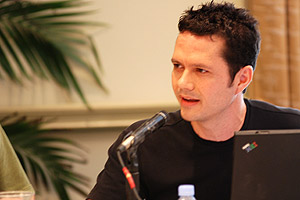
JOHN SINIFF, USA TODAY : I’d like to actually take you back to right before the break when you had talked about the distinction between candidates who invoke religion and candidates who you had said make a religious argument. And if you could elaborate a little bit on that distinction as you see it, and then Howard Dean’s Book of Job comment notwithstanding, do you think that the general public can distinguish between candidates who do one or the other?
PROTHERO: I think the general public can’t distinguish because right now journalists don’t make the arguments, so politicians get to do the invocation. I would distinguish between an argument and invocation, and I think right now politicians get away with playing the R card or the G card, for religion or God, and this is part of the whole person-of-faith performance, the man-of-faith or the woman-of-faith performance, that it’s clear that Americans apparently want people of faith, at least as president. And so people have to pretend to be that, and that’s one thing, but when it comes to connecting the faith, or what I call religious reasons, the reasons that in the public space get people like John Ronson and who are already upset, it’s those that I’m interested in drawing out.
And I think a more educated public and maybe journalists who are especially educated on religion and have the desire to do this can draw out politicians and make them make the argument -. And then to back up, I’d like to see us move from invocation to argument, in which case, some of the invocations that have no arguments would fall away, and the public space would not have as much fake religion in it and would have more real religion in it, so that issues where people are actually motivated by their religious convictions to take a position, that those religious reasons would be out there, but the bogus “I’m a religious person and therefore I feel this about this issue,” those would tend to go away.
PROTHERO: Well, I’d like to see somebody say – I’d like to see a journalist – when she does that, I’d like to see a journalist ask her, tell us the Good Samaritan story in your words and tell us how it’s connected to immigration policy. And then she could get to say, here’s the story, or she might say, I’ll have to check with my speechwriter on that before I get back to you.
UNIDENTIFIED: My spiritual adviser.
PROTHERO: But then she could say, well, here’s the story. It would be interesting to know what she left in and what she puts in and what she leaves out of the story. And she could say, this is a story about this guy and he gets beat up on the road and a bunch of people walk by him and the Jews walk by him. Does she leave that part out, the bad Jews who keep walking by the – how does she say that? How does she read that story?
And then, how is it legitimately connected to immigration policy? And if the Good Samaritan story is a story about helping your neighbor, why is that more applicable to immigration policy than other policies? I guess I have a nostalgia for those Bible debates about slavery. Those were just great. Those were great debates. Those were great conversations. Why can’t we have a debate about gay marriage where religious people get – a lot of religious people read the Bible and don’t get to opposing gay marriage and a lot of religious people do.
It would be fascinating to have that, as opposed to people who get to say, I’m religious so I’m opposed to gay marriage, and then everybody goes: OK, yes, I see that, it makes sense to me because just the secular people think gay marriage is good; that’s not true. So that’s the idea. If we can move from playing the card to pushing people to actually make the arguments, then some of the arguments would actually become interesting conversations and some of the arguments would go away because there’s no there there.
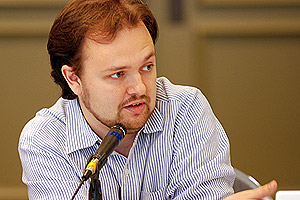
ROSS DOUTHAT, THE ATLANTIC : Well, I guess I have two questions. One was my short and one was my long. So the short, just I’m completely sympathetic to your argument that what’s interesting about religion goes way beyond morality, but I’m a little skeptical about the claim that all religions essentially agree on morality. And I think actually that’s part of the way that the debate gets pushed away from the really interesting tones. People say, well, all the religions basically agree.
And in fact, to your point about what’s interesting about religions is that they tell you, do this and you will go to heaven, well, they tell you to do different things and that that’s -. And part of why I think ecumenism in this country came out of the fact that everyone in this country was Christian, and maybe everyone was Judeo-Christian at a certain point, but it’s true that within the Christian context, there is a basic agreement about morality.
But Jesus coming along and saying, if you help that old lady across the street, that’s part of what you should do to go to heaven, in the context of the 1st century world, that’s a very radical statement. And in the same way, in the confrontation with Islam, I think – or the dialogue with Islam, I think that you can’t align the moral – the differences in morality, the fact that the New Testament says you will have one wife and the Koran says you can have four wives. It seems like these are pretty big moral gulfs. So that’s one question.
And then – or just one comment, I guess. But then the question is, to what extent do you think the issue of religious literacy, and the polls that we look at that show that people don’t know who David and Goliath are, are symptomatic of just a broader cultural illiteracy. I think that we could sit and have this same conversation about Americans’ ignorance of their own political history, and you see the endless polls where people say they don’t know when the Civil War started and what the battle of Gettysburg was and people can’t identify Abraham Lincoln and all the rest of it.
And that problem, I think, goes to a deeper question, which is just the extent of which – what we’re talking about in general is just a broad-based failure of public education almost, and we can have a class on the Bible and a class on world religion, but you’re still going to have people coming out of the public schools who are culturally illiterate.
It isn’t clear that public education is a solution to the problem of religious illiteracy, given how thoroughly it’s failed to combat historical illiteracy. And I think your comment about the Modesto experiment was telling in a way because I don’t find it surprising that a class on world religion wouldn’t persuade anyone to change their religion.
Based on my experience of high school presentations of world religions, it’s the best way to make kids not interested in religion at all. (Laughs.) I think if you look at the joke, what’s the best way to make sure a kid doesn’t grow up Catholic, just send him to Catholic school. I just wonder to what extent do you see a curriculum combating those kind of problems?
PROTHERO: All right. Thank you. On religions not agreeing on morality, I agree with your point in the sense of obviously they don’t on whatever, polygamy and monogamy and things like that. But I think I was talking about these ecumenical councils that happen every once in a while, the real interreligious ones, like the anniversary of the World’s Parliament of Religions of 1893 that was held in, I think, Barcelona in 1994 because they couldn’t organize it in time.
The only statements they came up with, they’re not theological. They’re ethical and they’re sort of broad ethical statements like, we shouldn’t kill people who haven’t done anything wrong and stuff like that. They aren’t about how many wives or husbands you should have. They’re about the Golden Rule, which is shared. So it’s that kind of thing I’m talking about.
I certainly do not want to be put in the camp of religions agree. A lot of my writing about religion is against this idea that all the religions are the same, and one of the main thrusts of my own work is to say they’re not, they’re different. They attend to different problems, and they come up with different solutions to very different problems. They’re not climbing the same mountain. If they’re climbing mountains, they’re climbing different mountains, and some are surfing and some are climbing mountains. So I think the religions are very different. (Laughs.) The Christians aren’t surfing, by the way.
In terms of this other problem, which I do think about a lot and I have been asked about this a lot, scientific illiteracy also comes up, right? So you talk to scientists, and they say, oh, man, are we supposed to do this now? We have scientific illiteracy, we have math illiteracy, we have civic illiteracy.
So I agree with you. I think one direction to go there is to what extent religion matters vis-à-vis other subjects, and you hear all the time in this literature on the new atheism that religion is one of the greatest forces for evil in world history, and I actually agree with that. I think that’s true. But my response is, well, it’s one of the greatest forces for good in world history also, which is to just say it’s a super-powerful force in world history, in which case I think the imperative to know something about it is greater than if you don’t accept the fact that it has personal and political and historical force. So that challenge, I think I can meet.
I think the other challenge is more of a devastating criticism, that if the public school system is a failure and if it’s not teaching students the things that are now in the curriculum, why is adding Bible and world religions to this failed system going to actually produce anything? And I think that’s an important question, and I guess I don’t really know how to answer that.
I think that you can hope for some kind of wide-scale restructuring of our public ed system. It’s pretty clear that American kids, when they’re teeny, are smarter than kids, or more knowledgeable than kids, around other parts of the world, and then they get into our public school system, the K-12, and they become stupider. They become really bad, and then they get into college and they catch up because American higher education is great compared to the rest of the world. So it’s pretty clear that there is a serious failure in that relatively large space between K and 12, and I guess that’s a bigger question that I cannot answer today at least.
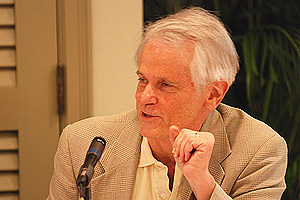
SHELBY COFFEY, THE NEWSEUM : A very good presentation. I was particularly struck, as John was, by your challenge to journalists to flush out demagogues who invoke God without having religious argument beneath it, and I wondered, one –
PROTHERO: Did I say that? (Laughs.) That’s good. I like that. (Laughter.)
COFFEY: The record shows –
PROTHERO: I like that. Thank you.
COFFEY: I wondered, one, if you had ever seen that done, and if not, I could offer a little suggestion that maybe, like Madeleine Albright who wanted a 24/7 adviser, that maybe a sort of religious truth SWAT squad should be set up and reporters could call by cell phone from the press conference when a shaky religious argument is invoked rather than argued. Have you ever seen it done?
PROTHERO: Well, one example was the Howard Dean thing, right? So Howard Dean started getting on “I’m religious too” before the Democratic Party had any credibility on that issue. And he was asked, now, name your favorite New Testament book, and the answer was the Book of Job. Now, that wasn’t a “gotcha” question, and it turned into a “gotcha” because it was such a softball that he couldn’t handle. But, no, I haven’t seen it done, but I’d love it. I’d love to see it done, and you all have access to these people. Ask them a question every once in a while. See how they can answer it.
COFFEY: If I could just follow up with one point of perhaps clarification. Despite his occasional intimations of omniscience on the fraught subject of Christopher Hitchens, I would like to say I don’t think the record should stand that he is ignorant.
PROTHERO: Oh, I disagree. I think he’s profoundly ignorant about religion, and I’ve said that in public and I’ve written it down. I think the line of my review is something like: I’ve actually never read a book by an author who is so fundamentally unacquainted with the subject of the book. He doesn’t know anything about religion. He’s a smart guy and he’s a great writer, but he doesn’t know anything abut religion.
He has this strangely infantile – he starts with a story about losing his faith when he was 9 years old or something. He has a 9-year-old understanding of God. It’s like Philip Pullman , similar. The Pullman thing is now coming up. Pullman has this critique-a nine-year-old critique-of the Catholic Church and thinks that that’s what religion is.
COFFEY: I think there’s a difference between being from your standpoint misguided or confused and being ignorant.
PROTHERO: I think there is a difference, but I think Hitchens is ignorant of religion. He doesn’t know – ignorant means doesn’t know. He doesn’t know anything about religion. He imagines things about religion, as religious people are wont to do, but he doesn’t know it. He doesn’t know anything about religious people.
COFFEY: And here we get to the nub of the question, which is, who knows?
PROTHERO: Well, who knows what?
COFFEY: About religion, just what you’re accusing him of being ignorant of.
PROTHERO: Well, I do. I know stuff about religion.
COFFEY: And you think he doesn’t, having read that book?
PROTHERO: I know he doesn’t, having read the book.
UNIDENTIFIED: I think you wrote a review of the book in the Post , right?
PROTHERO: Yes.
UNIDENTIFIED: And I read your review.
PROTHERO: Here’s the question – the way I would frame this is, if you want to attack a religion, you should attack what the religious people in the religion actually do and think. You should not attack your imagining of what it is that they do and think, nor should you attack something that might have obtained in that tradition 1,000 years ago or 200 years ago. There’s plenty to criticize of religious people for the stuff they actually believe and actually do, without having to go off into the realm of fantasy about what it is that they actually believe and what they actually do.
I just don’t know religious people who believe the stuff that he attacks. I don’t know those people. I know a lot of religious people, and they don’t believe the stuff that he attacks. The stuff that they believe is often very silly and could be attacked, and you can talk to them and they’ll tell you about how silly some of it is and how it can be attacked. But the kind of things these new atheist types are criticizing, I don’t really see out there in the real world, and that’s what I mean when I say that he and others are ignorant of religion.
DIONNE: (Off mike) – an issue for the record that because I was struck a long time ago when you said, Bob Shrum, that atheist. I actually just did some information retrieval. I was always under the impression that Shrum was a Catholic. Do you have any information to the contrary? You might know something I don’t know.
PROTHERO: I always – that he’s Catholic. But does he believe in God?
DIONNE: I don’t – I cannot testify for Bob Shrum. I’ve always thought he did.
PROTHERO: I know he was raised Catholic, but I had friends who worked on the media-PR side for the Kerry campaign and just from them I was told that he – I could be wrong – but told that he was an atheist.
UNIDENTIFIED: He’ll read the transcript and enlighten us.
PROTHERO: Well, thank you for correcting me because I don’t want to be on the record incorrectly about someone else’s faith. I prefer not to do that, having been the subject of that myself.
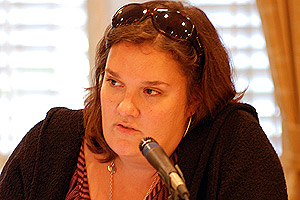
CLAIRE BRINBERG, CNN: Yes. First of all, just in case anyone was hoping that Romney would give a full explanation of what went down on Hill Cumorah , he said today that I can tell you I’m not going to be talking so much about my faith as I’m talking about the religious heritage of our country and the role which it played in the founding of the nation and the role which I think religion should generally play today in our society. So you should have caught him in France if you wanted all that.
But I guess my question is just more practical about how to design a curriculum to properly get at all these issues, and whether you thought there should be a national curriculum because considering there are all these regional differences and interpretations, whether it should be a national thing, if so, how that would come together. And considering how much ignorance there is of basic religious precepts, how do you train teachers to teach the stuff? Who should be teaching it? Clearly, they’re going to be getting a lot of attacks from the parents, so you really kind of need to be all buttoned up on what you’re teaching and who’s teaching it. So how do you do that?
PROTHERO: Yes. Well, it’s not clear to me there will be a lot of attacks. I think that’s one of my – the argument I want to make is that I think the perception of controversy here is much greater than the reality of controversy. I mentioned to someone that I think the figure is current school districts, one out of eight or so, have Bible classes already. So it’s not like this isn’t being done, and it’s not like the ACLU is suing all these school districts for doing these courses.
Who should be doing it is people should be trained. I think if you’re not trained to teach a world religions course, you shouldn’t teach it, that we don’t want untrained people to do it. This is actually one of the logistical problems, there aren’t a lot of places where training can go forward for high school students. There are some programs in California and in Massachusetts, some other states, where this training is happening. I think that that’s a really important part. And I forgot the first part of your question.
BRINBERG: It was whether there should be a national curriculum.
PROTHERO: Oh, yes, and I think the answer is no. That’s the difference between the United States and France. I had this guy call me on my phone about 40 or 50 times. He kept calling me because he had a plan for how to do this, and it involved the secretary of education or something and the president and me – (laughs) – and I had to tell him, this isn’t the way -. Finally, one day, I picked up my phone without carefully checking the number it was from and it was he. So we had a long conversation, and we have a locally controlled school. That’s the way it is.
I don’t think that’s going to change, although if we do realize the crisis we have and the way it’s been articulated here with public education, I imagine it’s possible we might decide to try to do something national about it. But, no, in that case, this makes this project hard because it’s basically a school district by school district proposition, rather than convincing some people at a national level to do something about it.
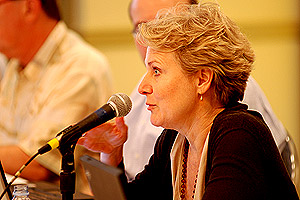
KATHY SLOBOGIN, CNN: My question has been touched on by other people, but I’m just a little confused about it, and that is religious literacy in terms of understanding world religions, to me, that’s inarguable. It makes you a better citizen, more intellectually engaged, but in the sense of being doctrinally well-versed in your own religion – this may sound like a contrarian question, but I’m hoping it will elicit more clarification. Is religious literacy necessarily a good thing?
In your historical discussion, which I also found very fascinating, you talked about the decline of religious literacy happening as the result of this evangelical movement where people opted for interdenominational cooperation, softening doctrinal differences, putting your differences aside and trying to make the world a better place. Is that such a bad thing?
And if we had a revival of religious literacy, would we have a revival of intolerance and doctrinal disputes and sectarianism, and would religion become so preoccupied with these disputes that they would no longer forge alliances to make the world a better place? After all, if you look at today, one of the most religiously literate groups is Christian fundamentalists. Is that where we want to go?
PROTHERO: No. (Laughs.) No. It’s a great challenge. It’s a great thought experiment, and I don’t know the answer to it. I think I certainly have – I was raised an Episcopalian and Episcopalians have this sense that religion is about the head, as well as the heart, and so there’s a longstanding critique among Episcopalians of a kind of religion that really is just about emotion or fundamentally about emotion. And so I’m not confused about that piece of this. I just do think that forms of religion, and not just the Christian forms, the Buddhist forms of religion, that I most value and respect care a lot about the head. The Tibetan Buddhist tradition is a tradition which is tremendously intellectual.
But that’s a separate question from the other challenge, which has to do with – there is a narrative arc in my story about tolerance and how tolerance is the bugaboo of religious literacy. I think I see that from the beginning all the way through. The key moments in my story have to do with moments when Americans opt for interdenominational or interreligious or interfaith cooperation and decide to forget things, and that decision to forget things is fateful, but it’s also productive in some ways.
I think the value of tolerance in America is really underestimated when it comes to religion. If you look at young evangelicals, they’re extraordinarily tolerant and, in fact, tolerant to a point where all the evangelicals are worried about them. It’s a very deeply held American value, and I’m not really that worried about it going away. I think that if I were – probably in my book, my arguments would sound different, would be shaped differently for exactly the reasons you’re talking about.
And so there are times when knowing a lot about your – I do believe for one – some people believe that the more you know about other religions, the more you’re likely to get along with them. I don’t actually necessarily believe that’s true. I think sometimes we kill people because we misunderstand them, and sometimes we kill them because we understand them, because we hate them, and we hate them because we know something about them.
Some of my friends, some of my colleagues in religious studies have this feeling that studying the world’s religions, with it comes this ethical insight; with it comes understanding and empathy, and it can, it can. That can happen, but I don’t think it’s necessary to the fact of learning about other religious traditions, so I guess I would -. I don’t really have a simple answer to your question. I think there may be a tradeoff here or there may just be competing values.
WOOLDRIDGE: (Off mike) – true that fundamentalists and evangelicals actually know more about religion than other people?
SLOBOGIN: I said on the fundamentalists, not evangelicals. I’m talking about – (off mike).
WOOLDRIDGE: Oh, OK. Fundamentalists.
PROTHERO: Yes. I do have a little defense of fundamentalists in my book, where I talk about fundamentalists actually do care about the intellectual side of their tradition and fundamentalism actually has an intellectual lineage that’s fairly sophisticated.
Going back to the early part of the 20th century, they have never gone in whole-hog for this religion is about touchy, feely, loving Jesus and having him as your friend because they’ve always had the sense of being in a fight, in an intellectual fight, with the liberals who are kind of trying to take over the country.
But in terms of religious literacy, one of the arguments I do make in the book about the Bible is that the evangelicals don’t know as much about the Bible as you think and that some of surveys that have been done – and this is where I wish John had gotten some on his survey – it would be great to know how much more evangelicals know about the Bible than others. But some of the data that I was able to find, and most of it’s not aggregated across religion or by evangelicals versus mainliners, but in the one survey that I did find that was intriguing, evangelicals only did moderately better on Bible questions than non-evangelical Christians, in some cases, worse than Jews on some questions about the New Testament, and in all cases, worse than private school students.
So the indicator, you’re more likely to know more about the Bible if you’re a private school student than if you’re an evangelical. Now that has to do with socio-economics and other things like that. But private school kids did better than evangelicals on some of the questions that I was able to find. It’s in my book. I could find a few.
ANDREA STONE, USA TODAY : I just wanted to say that I totally agree with what Kathy said, and as a New Yorker – and New Yorkers are getting a bum rap – I’d like to give a New York perspective because I think Rudy Giuliani at the last debate gave a – when somebody asked him about the Bible and if he believed it, and he talked about how he believed these were great allegorical stories and he believed that they weren’t literally true –
But I think sometimes a problem is not biblical literacy but literalism and that too many people take every word literally. And I think just as important, more important from my perspective, is that people should know religious history and they don’t. If they did, maybe we wouldn’t be in Iraq, or if we understood what’s going on in the Middle East, if we understood the history, which of course is based on the religion.
But for instance, Ross said before that Muslims believe you can have four wives, but the Hebrew patriarchs were polygamists. As a Jew, when I talk about the patriarchs, I talk about Abraham, Isaac and Jacob and then Sarah, Rebecca, Leah and Rachel, three guys, four women. And then what about Hagar and Ishmael?
So I think we’re very quick to condemn the Muslims for saying you can have four wives, but we have a lot of stuff in the Old Testament, the New Testament that is just – we would like to maybe forget about, about slavery, about the role of women, about gays and all those other things that don’t quite go according to our 21st century beliefs.
I think we should be literate, but I also would feel better if we taught – and you mentioned private schools. A lot of private schools – I think my son took Bible as a literature course in his school. I think that’s great. I think Bible as history is a great idea. I get uncomfortable, as a minority, to first – who’s going to teach my kid the New Testament? They’re not all going to have a Ph.D. in religious studies, certainly not in elementary school or high school, and I’m a secular person. So just imagine how a person who’s not will feel about it. And I have to say I haven’t read your book, but I certainly am going to after this, but I think that literacy is important, but it’s really not the most important thing, especially when it comes to politics.
PROTHERO: Well, I agree by the way, just a point of clarification. I think that religious history is part of religious literacy, so part of knowing about a tradition is knowing when it started, or the key developments, that there are three big schools inside Buddhism and how they rift on each other and how they developed out of each other, the fact that the Protestants came after the Catholics, things like that would be good to know.
I don’t think that elementary schools should have these courses, by the way. I think it’s too early and there are a lot of interesting studies about how kids develop in terms of understanding concepts about religion, to what extent they’re concrete thinkers. So I don’t think the place to do this is there. I think a Bible course should come at the end of high school, junior, senior year, not even early in high school, and I think that a world religions course can come sooner because it tends to be more historical and less about reading texts.
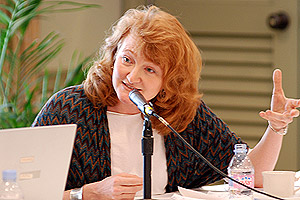
KRISTA TIPPETT, AMERICAN PUBLIC MEDIA: I also think that the history that you tell is absolutely critical to understanding this, and I just want to mention something that I think is a piece of the puzzle that we haven’t talked about, which is this strange divide, and this is certainly true within Christianity – I think less so in Judaism – between the intellectual life of the religion and the lived faith.
So you have academic theology, you have the AAR meeting of 9,000 theologians every year and you have ministers who are trained who actually – many of them, let’s hope most of them – have real serious training in church history and doctrine and theology and biblical criticism, but they don’t preach that; they don’t bring it to the people in the pews.
In Catholicism you have this vast, rich tradition, intellectual tradition of theology, but Catholics are quite proudly biblically illiterate. That’s never been the point and that’s part of the reason we had the Reformation. And then you have a tradition like Anglicanism, which does value reason, but Anglicans are also biblically illiterate. They know their books of common prayer.
So there’s also that dynamic that’s one of the answers to the reason that people can go to church and not be literate about these things, but I also think there are interesting countertrends. I think this is the reason that the Jesus seminar a couple of years ago was so exciting to people. There were a lot of suspect scholars at the Jesus seminar, but it reconnected; it gave people an end to actually taking their Bible seriously, liberals.
And then you have something like the emerging church movement that’s kind of coming out of evangelicalism. You have 25-year-old evangelicals who are recreating the doctrinal arguments of the first four centuries of Christianity, and some of them are actually building megachurches that are very concerned with getting your doctrine of the atonement or the divinity of Christ right.
So it’s a mixed picture and I also – I did want to come back to megachurches and just say I think these generalizations are dangerous. Religion has – and I also think that to call megachurches or church in general a social club is dismissive. Church always – religion always has been a source of community for people. I think that’s a more respectable word. I think people in this culture are starved for community. We have unlearned community in general, and that’s one thing megachurches offer. Many of them, beneath the surface, offer an easy welcome and an easy end and easy sermons and really uplifting music, but some of them have very sophisticated strategies for then giving people opportunities to be educated, to read their bibles.
Now, I think they are Protestant, and Protestants have never paid much attention to doctrine. But there is theology, Protestant lay people – but there is theology going on in some of these churches. And I also think there’s a lot of energy, even in many megachurches now, around social action and service, and these are also really important components of understanding what religion is about, how it matters in people’s lives. And I agree that the words ethics and morality are too small.
But the question is for people in terms of how religion is powerful, not just what you know or what you believe, but how you live your life differently, how it helps you navigate these great questions of what it means to be human and what it means to live a worthy life. And so I think that’s also a piece of transmitting religious literacy.
PROTHERO: Let me just give a very short response, which is that I agree with you that I don’t think religion is just about theology, nor do I think religious literacy is just about theology. And I have on my quiz, I have questions, for example, that ask Catholics, what are the seven sacraments? And I think that fundamentally for Islam, what religious literacy is about is knowing the Five Pillars , rather than knowing some orthodoxy about the Koran. So I would agree that at least religious literacy is as much about knowing things about the sacraments as it is – or about rituals – as it is knowing about doctrine.
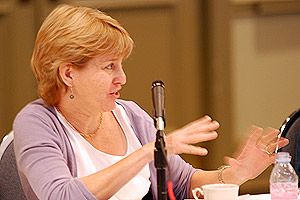
LINDA FELDMANN, THE CHRISTIAN SCIENCE MONITOR : I wanted to come back to the Mitt Romney question. You talk about how tolerant, religiously tolerant, we are as a country, and yet surveys show that a substantial portion of the electorate is not willing to vote for a Mormon, and the fact that Mitt Romney is giving the speech on Thursday is a sign that he sees in this polling that this is a real roadblock for him. Where do you see this resistance coming from? Is it illiteracy or is it that people, the resisters to him, have a little bit of knowledge about Mormonism and it’s not good?
PROTHERO: Yes, this may be a case where the more we know as a country about Mormonism, the less tolerant we will become of it. I think that – I’m not sure. I think that’s part of why he’s in a bind. But I think it’s a theological and ideological battle between evangelicals and Mormons on the issue. And as many of you know, the Southern Baptist Convention showed up at some point in Salt Lake City – it was around the Olympics – saying that Mormonism isn’t Christianity, it’s fake Christianity. And it’s an important form of fake Christianity if it’s fake because it’s growing so quickly and it’s global and it’s however many million people worldwide. And now there are more Mormons outside the U.S. than in the U.S.
This is not an inconsiderable religious tradition, and so there’s a contest over – to put it dramatically – souls in America, right, that is implicated in this election and so that’s the problem. Americans are religiously tolerant, yes, but Americans are also wary of – it’s interesting. Actually the poll – the state – John’s going to talk about this, something about this that intrigued me, that actually Romney’s negatives among – and maybe you can help me with this John – but there’s concern about Mormonism, both from the more liberal side of American Christianity and from the conservative side. The liberal side is worried that he’s just too religious and then the evangelicals are worried that he’s not the right kind of religious, so he’s in a bind there. And I don’t know what to say.
UNIDENTIFIED: And then seculars are concerned that he’s too religious.
UNIDENTIFIED: That he’s religious.
PROTHERO: Right, because now he said the wrong stuff about the Bible, that he believes the Bible is true, and Mormons supposedly don’t believe that. I’m not sure they’re that upset about that issue, by the way.
VAN BIEMA: I guess one of the things that’s been clear from this conversation is that for those of us who actually write about religion, even if Steve’s proposal were to be put into process, that we’d still all have jobs, because just the topic, and the ramifications of the topic, are just so incredibly rich, and there are so many different ways to go. And I think that it’s important to – kudos, as they say, kudos to Steve – kudos to Steve for having talked about the problem, and then the answer to the problem is a very different issue.
I read The Odyssey when I was in college and I liked it so much I read it twice, and if you were to ask me specifically about it at this point, I’m not certain how much I could tell you. I might be able to sketch out the basic plot, but at least it gives me a place to begin in a conversation or reference points to work with.
I think there’s some value to a course that puts you in the same place in this huge complicated conversation that we all find ourselves in the middle of. I think that there are distinct issues about whether teachers can teach it right, but I imagine there would be lawsuits. I think, Steve, you said you expected there would be lawsuits. I don’t know whether that works out well in the end, but it could.
Sometimes a lawsuit actually does clarify something, and sometimes something does get done right as a result. So I think that on the one hand, we shouldn’t expect that a course of this sort of – if it could ever be taught – should be expected to cure all of our curiosities here because it can’t. It can only kind of give us a vague background. And on the other hand, we shouldn’t expect it will be necessarily easy to do, but it might be worth it.
PROTHERO: Let me just say one last thing about religious literacy, which is that for me the goal for high school kids or grownups isn’t to memorize the 150 terms at the back of my book, wherever they are. It’s actually – to me, it’s knowing enough to know that when you get to a point that has to do with religion, that you don’t know. I think that’s true of literacy of all kinds of sorts, that I think one of the concerns I have about our contemporary American politics, especially international and foreign affairs, as we get to places where we don’t know that we’re ignorant, we don’t know that we don’t know stuff. I think that was what was going on when we went into Iraq.
And so one of the goals for me for religious literacy isn’t so much of turning every high school kid into a mini-Ph.D. in religious studies. It’s to teach them enough about religion so that they have, maybe just in the back of their brains, like the Odyssey is in the back of David’s brain, some understanding of the world’s religions, so when they get to a point where it might matter, they’ll realize, gosh, I don’t really know what I should know about this and I’m going to go find out about it. That, to me, would be a goal worth reaching on this score.
CROMARTIE: Ladies and gentlemen, you know we’re got a good session when we go 25 minutes overtime, and that’s what we’ve had to do here because of the wonderful presentation. Join me in thanking Steve for a wonderful presentation.
(Applause.)
This transcript has been edited for clarity, spelling, grammar and readability by Amy Stern.
Sign up for our weekly newsletter
Fresh data delivery Saturday mornings
Sign up for The Briefing
Weekly updates on the world of news & information
- Beliefs & Practices
- Public Knowledge
How common is religious fasting in the United States?
8 facts about atheists, spirituality among americans, how people in south and southeast asia view religious diversity and pluralism, religion among asian americans, most popular.
1615 L St. NW, Suite 800 Washington, DC 20036 USA (+1) 202-419-4300 | Main (+1) 202-857-8562 | Fax (+1) 202-419-4372 | Media Inquiries
Research Topics
- Age & Generations
- Coronavirus (COVID-19)
- Economy & Work
- Family & Relationships
- Gender & LGBTQ
- Immigration & Migration
- International Affairs
- Internet & Technology
- Methodological Research
- News Habits & Media
- Non-U.S. Governments
- Other Topics
- Politics & Policy
- Race & Ethnicity
- Email Newsletters
ABOUT PEW RESEARCH CENTER Pew Research Center is a nonpartisan fact tank that informs the public about the issues, attitudes and trends shaping the world. It conducts public opinion polling, demographic research, media content analysis and other empirical social science research. Pew Research Center does not take policy positions. It is a subsidiary of The Pew Charitable Trusts .
Copyright 2024 Pew Research Center
Terms & Conditions
Privacy Policy
Cookie Settings
Reprints, Permissions & Use Policy
Advertisement
Supported by
Knowing Not
- Share full article

By Mark Oppenheimer
- June 10, 2007
Decline-and-fall books, like E. D. Hirsch Jr.’s “Cultural Literacy” and Allan Bloom’s “Closing of the American Mind,” can leave the reader torn between depression and elation: by detailing how stupid everyone else is, the authors leave us feeling better about ourselves. (“ I know which has more members, the Supreme Court or the Supremes!”) So it was with smug anticipation that I opened “Religious Literacy,” Stephen Prothero’s jeremiad about declining religious knowledge. Most Americans “cannot name one of the four Gospels,” Prothero writes, “and many high school seniors think that Sodom and Gomorrah were husband and wife.” Religious illiteracy cuts across generations, and the devout scarcely know more than the secular do. In one survey of high school students, most evangelicals did not recognize that “Blessed are the poor in spirit” is from the Sermon on the Mount.
Alas, unlike Jay Leno humiliating an audience that can’t name any of the Twelve Apostles, Prothero, a professor of religion at Boston University and author of “American Jesus: How the Son of God Became a National Icon,” does not simply let us enjoy this intellectual condescension. After all, he wants us to remember, it’s the rare world crisis that is not at least partly rooted in religion — consider Sudan, Iraq, Israel. And because domestic controversies, like those over intelligent design or gay marriage, are also often bound up with religion, Prothero writes, “you need religious literacy in order to be an effective citizen.” Raising the stakes further, he argues (as other scholars have before him) that the 1993 conflagration that killed the Branch Davidians at Waco might have been averted had the F.B.I. better understood David Koresh’s apocalyptic theology.
Prothero’s corrective proceeds in two parts. First, he offers a diagnosis: a 100-page précis of American religious history that tells a familiar story, from the Puritans to today’s pluralism, remarkably well. He also argues, persuasively, that both conservatives and liberals are to blame for American religious illiteracy. Beginning with 19th-century Unitarians, liberal Christians dropped Bible learning for good deeds and progressive politics. But conservatives have also turned away from religious study. From Charles Finney in the Second Great Awakening to contemporary megachurch preachers, evangelicals have won converts by advocating enthusiastic faith at the expense of religious study. For most American Christians, Prothero laments, catechisms, confessions and even reading the Bible itself are often Sunday-school afterthoughts.
Conservative evangelicals, uniting in pursuit of political influence, played down old denominational differences. “Family values” became for the right what “justice” or “peace” was for the left — a catchphrase that obviates the need for religious literacy. The specifics of Prothero’s thesis are not new, but his formulation makes the culture wars seem more misguided than ever. Left, right, ecumenical, evangelical — we all abandoned the Bible.
I say “the Bible” because although Prothero gives generous space to Islam and other world religions, he is adamant, against multicultural pieties, that Americans most need to know Christianity. Prothero also risks angering liberals by dismissing popular writers like Karen Armstrong and Huston Smith, who “in the name of pluralism” have furthered the view “that all religions were different paths up the same mountain.” Prothero’s admirably old-fashioned opinion is that to rebuild core knowledge we must resist comforting ecumenical myths. He calls for requiring that all high schoolers take both a Bible class and a world religions class.
The second half of the book is a glossary of religious terms that “Americans need to know.” Prothero’s judicious selection includes descriptions of the major world religions, the largest Christian denominations, key figures from the Bible (Abraham, Judas Iscariot, the prodigal son), various concepts (nonviolence, jihad) and several living figures (Billy Graham, the Dalai Lama). For a sense, here are the contents of a pair of facing pages, chosen at random: hijab, Hinduism, Holocaust, Holy Communion.
I would have omitted Billy Graham, who’s irrelevant today, and given Rick Warren his own entry. And I’d have avoided the cultural trivia: Hanukkah need not be defined with reference to Adam Sandler’s “Hanukkah Song,” and Moses does not, in fact, “figure in” William Faulkner’s “Go Down, Moses.” But the bigger problem is with Prothero’s premise, that deeper religious knowledge would produce saner, wiser public discourse. Would wider knowledge of the Baltimore Catechism or New Testament stories really advance debates on, say, stem-cell research? Or would people find new reasons to cling to their old opinions?
George W. Bush did say that Jesus Christ was his “favorite philosopher,” but Susan Sontag was correct to point out that “Bush didn’t mean, and was not understood to mean, that ... his administration would actually feel bound by any of the precepts or social programs expounded by Jesus.” Americans have crafted a religiosity that is more an idea of religiosity; together we have largely agreed to forgo its content. Prothero, raised Episcopal, loves doctrine and Scripture, and I sympathize. But with some exceptions — a grasp of the Sunni/Shia distinction comes to mind — religious knowledge is not necessary to be a good citizen. It’s just necessary if one wants to be an educated person. It enriches our lives. That’s blessing enough.
Mark Oppenheimer is the author of “Knocking on Heaven’s Door: American Religion in the Age of Counterculture.”
Explore More in Books
Want to know about the best books to read and the latest news start here..
The complicated, generous life of Paul Auster, who died on April 30 , yielded a body of work of staggering scope and variety .
“Real Americans,” a new novel by Rachel Khong , follows three generations of Chinese Americans as they all fight for self-determination in their own way .
“The Chocolate War,” published 50 years ago, became one of the most challenged books in the United States. Its author, Robert Cormier, spent years fighting attempts to ban it .
Joan Didion’s distinctive prose and sharp eye were tuned to an outsider’s frequency, telling us about ourselves in essays that are almost reflexively skeptical. Here are her essential works .
Each week, top authors and critics join the Book Review’s podcast to talk about the latest news in the literary world. Listen here .
A Review of Religious Literacy: What Every American Needs to Know and Doesn’t
Does the acquisition of factual knowledge about religion lead to an understanding of religion?

- Lee Duigon,
Author Stephen Prothero, who chairs the religion department at Boston University, believes it does. “My goal,” he writes, “is to help citizens participate fully in social, political, and economic life in a nation and a world in which religion counts” (p. 15).
The problem, as he sees it, is Americans’ vast ignorance of religion—ignorance not only of other people’s religions, but of the Christian religion which most of them profess.
But is the problem really knowledge, or the lack of knowledge? As R. J. Rushdoony observes, “The more sinful man is, the more dangerous he is … The old proverb is true: You can’t make a good omelette with bad eggs.”1
Bible Bloopers
Prothero has no trouble proving his point that “religious amnesia” is rampant in America. As a teacher, he has the opportunity to quiz his students frequently. The answers he gets are … well, judge for yourself.
- Most of his college students can’t name the four gospels (p. 28).
- Most of them can remember only four of the Ten Commandments (p. 28).
- Many believed that Jesus, not Moses, led the Israelites through the Red Sea (p. 29).
- In a national “scientific survey,” only one-third of the respondents knew that Jesus, not Billy Graham, preached the Sermon on the Mount (p. 30).
- In the same survey, 10 percent identified Joan of Arc as Noah’s wife (p. 30).
Such bloopers are legion. Not only that, as one of my acquaintances put it, “Why should what you know have anything to do with what you believe?” We are naturally led to wonder: what has gone wrong?
Good Intentions, Bad Results
“Every religious festival [in ancient Israel] had an element of instruction in it, and it was essential in all things that the children be reared in the essentials and fundamentals of the faith. God so requires it.” —R. J. Rushdoony2
Once upon a time, Prothero writes, American children, too, were reared in the essentials and fundamentals of the faith—the Christian faith. Children got their schooling at home and learned to read by reading the Bible and readers and primers that were chock-full of Bible stories, Bible verses, and Bible-derived lessons in life and morals. Literacy itself, and Bible literacy, amounted to virtually the same thing.
But as the nineteenth century dawned, all this began to change.
Who was responsible? Not unbelievers, Prothero says, but Christians themselves: “[T]he villains were not activist judges or ACLU types … but well-meaning folks intent on doing just the opposite … [It was] the nation’s most fervent people of faith who steered Americans down the road to religious illiteracy” (p. 11).
Why should this be? Rushdoony says it was because the church got above itself, like the scribes and Pharisees of the New Testament. “Too often the church identifies faith with itself, and faithfulness with loyalty to the institutional forms and practices,” he writes.3 Prothero sees it also as a process of conflict resolution and constant compromise.
Citing a remark made by sociologist Will Herberg back in 1955, Prothero reports, “[T]he religion which actually prevails among Americans today has lost much of its authentic Christian (or Jewish) content” (p. 7). In the Second Great Awakening, 1801–1831, evangelism replaced Puritanism: “[M]ore than any other single event, the Second Great Awakening aided and abetted our national amnesia” (p. 90), giving priority to feelings over facts, to personal experience over doctrine, to fervor over theology, to works over faith.
As Americans of various denominations came together to campaign against slavery, fight intemperance, and help the poor, they were motivated to bury their doctrinal differences. The rise of public education was especially critical.
In Philadelphia, in 1844, for instance, Catholics and Protestants rioted over whose Bible should be used in the city’s public schools (p. 97). In the end, four people were killed, and the Catholics, unable to win the dispute, switched to demanding Bible-free schools.
Protestants, meanwhile, deemed it “better to secularize public schools than to let [Horace] Mann’s Unitarianism prevail” (p. 97).
The “acids of nondenominationalism were starting to erode religious content” not only in the schools, Prothero writes, but in every aspect of American life (p. 85), from politics to the churches themselves. Higher education followed the public schools into nonsectarianism (p. 101), and “evangelicals made a virtue of their ignorance” (p. 106).
Church sermons, once instructional and doctrinal, drifted into “story-telling” (p. 109). Famous evangelists like D. L. Moody said things like, “My theology! I didn’t know I had any” (p. 104). Churches emphasized “having a relationship with an astonishingly malleable Jesus” (p. 111), aiding an overall “shift from theology to morality” (p. 111).
In pursuit of political ends, America’s Christianity became increasingly generic. Anti-communism united Protestants and Catholics, and when Jews came aboard in the 1950s, Americans began talking about a “Judeo-Christian tradition” (p. 113). In the 1980s the Moral Majority brought Protestants, Catholics, and Jews together to campaign for “values.” More recently, “values evangelists” have reached out to Muslims under the umbrella of an “Abrahamic tradition” (p. 115). The big tent of American Christianity just keeps getting bigger and bigger!
The result is appalling. Describing the conduct of a recent Chicago Leadership Prayer Breakfast—“interfaith,” of course, complete with rabbis and imams—Joseph Stowell reports:
For the first time in my life, I was being asked to publicly deny Jesus. By joining in the standing ovation I would affirm the speaker’s premise that it was best for me to give up the “tradition” that divided us. It was clear. The only way I could stand would be to turn my back on Jesus.4
The problem is not only religious illiteracy, Professor Prothero. More than knowledge has been sacrificed on the altar of tolerance. The sacrifice, for many, has been their belief in Christ.
Destroying Christian Order
If in America today “faith is almost entirely devoid of content” (p. 1), Prothero says, “you need religious literacy in order to be an effective citizen” (p. 9). Historical events, like the American Revolution and the Civil War, cannot be understood “in a religion vacuum” (p. 4). Nor can current events be understood: “[I]t should be obvious that Christian literacy is more important than other religious literacies when it comes to understanding U.S. politics” (p. 13).
For most people in the world, Prothero argues, religion matters. “[P]arochial secularists were wrong about the waning of religion and the ‘death of God’… [They] based their predictions on nothing more substantial than the vague air of skepticism they detected at the dean’s sherry hour” (p. 40).
Politics spurred a revival of religion as a force in public life, as seen in the elections of presidents Jimmy Carter and Ronald Reagan. “Religion has always mattered in American society,” Prothero says (p. 45).
But … “the God-fearing faith of Calvinism yielded to the Jesus-loving faith of evangelicalism” (p. 46), while the role of religion in history was progressively deleted from school and college textbooks, contributing to a “massive ignorance” (p. 52).
It’s more than that, Professor. “State control of education has been a central means of destroying Christian order … By means of education, certain aspects of life and experience are given the priority of truth and others are relegated to unimportance or are classed as wrong,” Rushdoony says.5 Prothero errs in overlooking the consciously anti-Christian agenda of the public school enterprise, amply documented in such books as Rushdoony’s The Messianic Character of American Education .6
Still, Prothero is not completely unaware of the baneful influence of public education and benign neglect at home. “The fact of the matter,” he says, “is that you cannot avoid teaching religion to your kids; if you offer them nothing, you are telling them that religion counts for nothing” (p. 126).
Prothero’s Prescription
“The Fall into religious ignorance is reversible,” Prothero insists (p. 121); and he offers a prescription for reversing it. Briefly:
- Churches must go back to preaching and teaching from the Scriptures (p. 126).
- The media must provide better coverage of religion (p. 126).
- Individuals must study harder, reading the Bible and familiarizing themselves with other religions (p. 127).
- Schools must teach “about religion,” offering religion studies as allowed by the courts (p. 127).
Let’s examine the ingredients of this prescription.
It is true that many churches have abandoned scriptural teaching from the pulpit. A few still provide it; and new technology makes it available to all through such resources as sermonaudio.com. But it’s hard to imagine the other churches changing their ways. As long as entertainment at the expense of instruction equates to warm bodies in the pews and cold cash in the collection plates, business will go on as usual.
It is true that Christians ought to spend more time reading and studying the Bible. But only a massive change of heart would provide the motivation for it. Every adult school teacher who has handed out a reading assignment, no matter how small, has heard the refrain, “I didn’t have the time.” What is going to convince them to make the time for reading the Bible, Prothero does not discuss.
As for the media, as heavily populated as it is by unbelievers, scoffers, and debunkers, Prothero’s hopes for help from this quarter seem misplaced. We are talking about people whose idea of “covering Jesus” is to run to the Jesus Seminar for assurances that the Resurrection never occurred.
By and large, the culture of the education establishment is implacably anti-Christian and highly unlikely to change. Prothero would insist on a “fair and balanced” education “about” religion, neither preaching it nor debunking it: “[S]teer clear of both advocating religion and impugning it while at the same time communicating that individual religious convictions are to be treated, as a matter of both law and civility, with respect” (p. 132).
Very idealistic, to be sure, but Prothero expects too much from teachers who are already up to their eyebrows in queer studies, women’s studies, global warming, Darwinism, and left-wing political activism.
Education “about religion,” carried out by secular public schools and colleges, seems unlikely to accomplish much. Our skepticism is expressed by Rushdoony: “Phonics will again teach children to read, but is a barbarian who reads any less a barbarian? Knowledge is clearly good, but has knowledge made our professors any better than the rest of the population? Do professors have a lower percentage of moral and mental problems than do farmers?”7 How can anyone hope to “understand” religious faith without having it?
Meanwhile, Prothero has left out the most important element of any child’s religious training—the family! In fact, he makes a startling admission: his own children are, generally speaking, religiously illiterate (pp. 125–126). For a man who makes his living as a professor of religion studies, whose family goes to church and whose children go to Sunday school, this is an embarrassment. Was he so busy teaching other people’s children that he had no time to teach his own?
Why We Need to Know
As glaring as this omission is, Prothero has missed something even more important—the real reason why we ought to be knowledgeable about the Christian religion (never mind the others).
The reason is simple: God commands it.
In the words of Christ Himself, “Go ye therefore, and teach all nations … Teaching them to observe all things whatsoever I have commanded you” (Matt. 28:19–20).
And, “Go ye into all the world, and preach the gospel to every creature” (Mark 16:15).
And, “[B]e ready always to give an answer to every man that asketh you a reason of the hope that is in you” (1 Pet. 3:15).
We can hardly teach what we do not know, or preach a gospel out of ignorance, or give a reason for a faith we do not understand.
Prothero wants to reverse religious illiteracy because to him it’s good civics. To us, it’s a matter of obedience to God. If making our hearers better Christians, or converting them to Christianity in the first place, makes them better citizens, well and good. But the commandment is to be obeyed regardless. We belong to God’s Kingdom before we are citizens of any country.
We are not sold on his remedy, but he has done a good job (and an entertaining one) of calling attention to the ailment.
We are not convinced that hours of instruction “about” religion, divorced from belief, will produce an understanding of any religion. We don’t believe it’s possible to be religiously neutral or that it’s intellectually honest to claim to be so.
We and Prothero agree, for different reasons, with the prophet Hosea: “My people are destroyed for lack of knowledge,” and not forgetting the rest of the verse, “because thou hast rejected knowledge, I will also reject thee” (Hosea 4:6).
1. R. J. Rushdoony, Roots of Reconstruction , “False Religions” (Vallecito, CA: Ross House Books, 1991), 307.
2. Rushdoony, Systematic Theology (Vallecito, CA: Ross House Books, 1994), 683.
3. Ibid., 674.
4. Joseph Stowell, The Trouble with Jesus (Chicago: Moody Publishers, 2003), 22.
5. Rushdoony, Institutes of Biblical Law , Vol. 1 (The Craig Press, 1973), 296.
6. Vallecito, CA: Ross House Books, 1995.
7. Rushdoony, Roots of Reconstruction , 309.
Lee is the author of the Bell Mountain Series of novels and a contributing editor for our Faith for All of Life magazine. Lee provides commentary on cultural trends and relevant issues to Christians, along with providing cogent book and media reviews.
Lee has his own blog at www.leeduigon.com .
- Skip to primary navigation
- Skip to main content
- [email protected]
Login to MyWabash
Featured Resources
- 4 Books on Teaching Diverse Students
- 11 Books on Teaching Religions
- 5 Books for New Teachers
- 7 Recent Critiques of Higher Education
- Reviews of 2 Good Books about Teaching Online
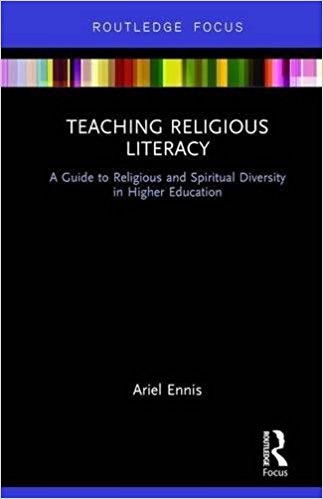

Teaching Religious Literacy: A Guide to Religious and Spiritual Diversity in Higher Education
Ariel Ennis, Assistant Director and Senior Multifaith Educator at the Of Many Institute for Multifaith Leadership in the Office of Global Spiritual Life at New York University, has authored an important contribution to a burgeoning literature on campus-based interfaith and interreligious outreach. Noting that diversity and inclusion initiatives on American campuses frequently address race, sexuality, and gender while ignoring religious identity, Ennis reports on efforts at NYU to create a center to support spiritual life. Special attention is given to the development of a “Faith Zone” curriculum that trains leaders for enhanced multifaith encounters.
Ennis analyzes a variety of extant approaches to cross-cultural religious and spiritual experiences, looking at intended outcomes of different programs. Focusing on the concept of “religious literacy,” he describes a framework for the NYU workshops on spiritual diversity that supports religious literacy initiatives. Included in the book is the Faith Zone curriculum and rubrics drawn from the AACU (Association of American Colleges and Universities) VALUE rubrics that are used for post-workshop outcomes assessment. He shares data from these assessments in order to demonstrate the impact on campus of the religious literacy curriculum. The book closes with the author’s reflections on how Faith Zone workshops could be offered on different types of campuses (public/private, religious/secular) and with his recommendations for successfully meeting challenges emerging from the workshops.
Campus religious literacy initiatives that Ennis advocates embrace the question: Can we teach people to have more productive conversations about religion and spirituality in diverse settings? Using the definition of religious literacy developed by Dianne Moore of the Religious Literacy Project at Harvard Divinity School, Ennis answers this question affirmatively, setting four outcomes for the interfaith curriculum. Workshops will (1) enhance participants’ knowledge of historic and contemporary interconnections of religion with cultural, political, and social life; (2) embrace an ecumenical orientation that offers participants firsthand experience in exploring religio-cultural boundaries; (3) promote self-awareness about the intersections of participants\' religio-spiritual identities with larger social forces; and (4) encourage participants\' commitment to apply their new found religious literacy through practical projects that bridge intercultural divides.
In contrast to Eboo Patel’s portrait of a fraught relationship between interfaith outreach and religious studies programs (https://www.wabashcenter.wabash.edu/scholarship/interfaith-leadership-a-primer/), Ennis’ book points to positive implications for partnerships on campus between religious studies programs and interfaith outreach. Similarities between Faith Zone outcomes and learning outcomes/assessment of the religion major on many campuses suggest productive cross-fertilization. Students could sustain the long-term impact of the workshop outcomes, adding depth and breadth, through coursework in religious studies grounded in similar learning outcomes. In complementary fashion, religious studies majors could apply learning in the major outside the classroom, enhancing their resumes, through interfaith internships: as graduates of Faith Zone training, they could lead workshops on religious literacy and develop and lead associated campus programming.

- Kindle Store
- Kindle eBooks

Promotions apply when you purchase
These promotions will be applied to this item:
Some promotions may be combined; others are not eligible to be combined with other offers. For details, please see the Terms & Conditions associated with these promotions.
Audiobook Price: $22.04 $22.04
Save: $9.05 $9.05 (41%)
Buy for others
Buying and sending ebooks to others.
- Select quantity
- Buy and send eBooks
- Recipients can read on any device
These ebooks can only be redeemed by recipients in the US. Redemption links and eBooks cannot be resold.

Download the free Kindle app and start reading Kindle books instantly on your smartphone, tablet, or computer - no Kindle device required .
Read instantly on your browser with Kindle for Web.
Using your mobile phone camera - scan the code below and download the Kindle app.

Follow the author

Image Unavailable

- To view this video download Flash Player
Religious Literacy: What Every American Needs to Know--And Doesn't Kindle Edition
The United States is one of the most religious places on earth, but it is also a nation of shocking religious illiteracy.
- Only 10 percent of American teenagers can name all five major world religions and 15 percent cannot name any.
- Nearly two-thirds of Americans believe that the Bible holds the answers to all or most of life's basic questions, yet only half of American adults can name even one of the four gospels and most Americans cannot name the first book of the Bible.
Despite this lack of basic knowledge, politicians and pundits continue to root public policy arguments in religious rhetoric whose meanings are missed—or misinterpreted—by the vast majority of Americans.
"We have a major civic problem on our hands," says religion scholar Stephen Prothero. He makes the provocative case that to remedy this problem, we should return to teaching religion in the public schools. Alongside "reading, writing, and arithmetic," religion ought to become the "Fourth R" of American education.
Many believe that America's descent into religious illiteracy was the doing of activist judges and secularists hell-bent on banishing religion from the public square. Prothero reveals that this is a profound misunderstanding. "In one of the great ironies of American religious history," Prothero writes, "it was the nation's most fervent people of faith who steered us down the road to religious illiteracy. Just how that happened is one of the stories this book has to tell."
Prothero avoids the trap of religious relativism by addressing both the core tenets of the world's major religions and the real differences among them. Complete with a dictionary of the key beliefs, characters, and stories of Christianity, Islam, and other religions, Religious Literacy reveals what every American needs to know in order to confront the domestic and foreign challenges facing this country today.
- Print length 308 pages
- Language English
- Sticky notes On Kindle Scribe
- Publisher HarperOne
- Publication date October 13, 2009
- File size 719 KB
- Page Flip Enabled
- Word Wise Enabled
- Enhanced typesetting Enabled
- See all details

Customers who bought this item also bought

From the Publisher
Editorial reviews, from publishers weekly, from booklist, about the author.
Stephen Prothero is the New York Times bestselling author of Religious Literacy and God Is Not One and a professor of religion at Boston University. His work has been featured on the cover of TIME magazine, The Oprah Winfrey Show, The Daily Show with Jon Stewart, The Colbert Report , NPR, and other top national media outlets. He writes and reviews for the New York Times, The Wall Street Journal, Boston Globe, The Washington Post, USA Today, Los Angeles Times, Salon, Slate, and other publications. Visit the author at www.stephenprothero.com or follow his tweets @sprothero.
Excerpt. © Reprinted by permission. All rights reserved.
Religious literacy, harpercollins publishers, inc..
A Nation of Religious Illiterates
Both the Religious Right and the Secular Left feel besieged. In the Left Behind novels popular in conservative Christian circles, true believers are "raptured" into heaven at the end of times; everyone else is "left behind." Today secularists are attesting to a Last Days scenario of another sort, in which the old order of reason, rights, and the separation of church and state is being replaced by a new medievalism in which the president and his acolytes answer to God rather than to the American people. This disquiet can be heard in port cities across the country, but it is particularly palpable in Manhattan, the mecca of the Secular Left, where many report that their island is starting to feel, well, like an island again, cut off from the heartland by (among other things) its cosmopolitanism. At least for New Yorkers, it is as if the iconic Saul Steinberg cartoon of the United States according to Manhattan—an image that looks west across Ninth Avenue and the Hudson River and New Jersey to a Kansas City the size of a yellow cab and a Los Angeles no bigger than a courier's bicycle—is eerily mutating into a Grant Wood landscape, its bucolic foreground anchored not by yellow cabs but by the corn rows and church spires of Kansas, with nary a skyscraper on the horizon. "I feel assaulted," one New Yorker told me. "I feel like these Christians are hiding a crucifix in their shoe. Any minute they'll pull it out and gut you." 28
Bill O'Reilly of The O'Reilly Factor on Fox News feels assaulted too. Whereas secularists are sure that the Religious Right has taken over US politics, he is morally certain that "secular progressives" are winning the culture wars. Christmas is "under siege," O'Reilly says. An "anti-Christian jihad" is banishing Christmas trees from holiday parades, Christmas carols from public school pageants, and Christmas greetings from department stores. In the world according to O'Reilly, the ultimate aim of these criminalizers of Christmas is nothing less than banishing religion from the public square and thereby clearing the way for "secular progressive programs like legalization of narcotics, euthanasia, abortion at will, gay marriage." Televangelist Jerry Falwell also believes that "radical secularists" are "aggressively attempting to redefine America in their own Godless image," and religious broadcaster Pat Buchanan complains about "hate crimes against Christianity." The mission of the Secular Left, concludes Buchanan, is "to expunge from the public life of the West all reminders that ours was once a Christian civilization and America once a Christian country." 29
The emotions on both sides of this question are understandable, though the irony of the situation—in which each camp sees itself as a victim and believes that the other is seizing control of the country—seems lost on everyone concerned. The fact of the matter is that, in the American marketplace of ideas, neither faith nor faithlessness is close to either bankruptcy or monopoly. Though O'Reilly may rage, Christmas (which remains a national holiday) is not fading into that good night. And theocracy—in the true sense of church-run government—is not even a twinkle in the Bush administration's eye. Much ink has been spilled, and many megabytes expended, trying to pigeonhole the nation into either "secular America" or "Christian America." It has always been both.
The United States is by law a secular country. God is not mentioned in the Constitution, and the First Amendment's establishment clause forbids the state from getting into the church business. However, that same amendment also includes a free exercise clause safeguarding religious liberty, and Americans have long exercised this liberty by praying to God, donating to religious congregations, and hoping for heaven. So there is logic not only to President John Adams's affirmation in the Treaty of Tripoli in 1796 that "the government of the United States of America is not in any sense founded on the Christian religion" but also to the Supreme Court's 1892 observation that "this is a Christian nation." In short, the long-standing debate about whether the United States is secular or religious is fundamentally confused. Thanks to the establishment clause, the US government is secular by law; thanks to the free exercise clause, American society is religious by choice. 30
Ever since George Washington put his hand on a Bible and swore to uphold a godless Constitution, the United States has been both staunchly secular and resolutely religious. Church and state have never been completely separated in the United States; religion and politics were bedfellows from the start. Traditional liberals such as the political philosopher John Rawls insist that religion restrict itself to the individual heart, the pious home, and the religious congregation; religion is a private matter that will contaminate civil society if not quarantined from public life. Because religion is a "conversation stopper," political discourse must be conducted entirely in terms of "public reason," which by definition excludes religious reasons. According to this strict separationist perspective, the wall between church and state is supposed to form, as one nineteenth-century activist once put it, "a barrier high and eternal as the Andes." The only alternative is "politics as holy war." 31
George W. Bush caught a lot of flak for disrespecting this church-state divide at his 2001 inauguration, which included one prayer offered by the Reverend Franklin Graham (Billy's son) in the name of "the Father, the Son, and the Holy Spirit" and another offered by the United Methodist minister Kirbyjon Caldwell "in the name that's above all other names, Jesus, the Christ." But Bush's sin was also committed, in flagrante delicto, by Bill Clinton, whose inaugurations were unabashedly Christian affairs. Clinton's 1997 fete included a trinitarian prayer by Billy Graham, a benediction by a black Baptist preacher, and songs by no fewer than three gospel groups (one called the Resurrection Choir). Plainly, the celebrated wall of separation between church and state has never been particularly wide or sturdy. Breached nearly as often as it has been respected, this wall resembles a rickety picket fence far more than the eternal Andes. Washington and Madison, Reagan and Clinton all declared national days of prayer or thanksgiving, and the Supreme Court still opens its sessions with "God save the United States and this Honorable Court." As G. K. Chesterton once put it, the United States has long been "a nation with the soul of a church." 32
From AudioFile
Product details.
- ASIN : B000OI0F5S
- Publisher : HarperOne; Reprint edition (October 13, 2009)
- Publication date : October 13, 2009
- Language : English
- File size : 719 KB
- Text-to-Speech : Enabled
- Screen Reader : Supported
- Enhanced typesetting : Enabled
- X-Ray : Enabled
- Word Wise : Enabled
- Sticky notes : On Kindle Scribe
- Print length : 308 pages
- #267 in Religious Reference
- #410 in Mythology & Folklore Encyclopedias
- #477 in Religious Studies - Comparative Religion
About the author
Stephen r. prothero.
Stephen Prothero is the New York Times bestselling author of Religious Literacy and chair of the religion department at Boston University. His work has been featured on the cover of Time magazine, Oprah, The Daily Show with Jon Stewart, National Public Radio, and other top national media outlets. He writes and reviews for The New York Times Magazine, Wall Street Journal, Boston Globe, Washington Post, USA Today, Los Angeles Times, Salon, and other publications. He holds degrees in American Religion from Harvard and Yale.
Customer reviews
Customer Reviews, including Product Star Ratings help customers to learn more about the product and decide whether it is the right product for them.
To calculate the overall star rating and percentage breakdown by star, we don’t use a simple average. Instead, our system considers things like how recent a review is and if the reviewer bought the item on Amazon. It also analyzed reviews to verify trustworthiness.
Reviews with images

- Sort reviews by Top reviews Most recent Top reviews
Top reviews from the United States
There was a problem filtering reviews right now. please try again later..
Top reviews from other countries
- Amazon Newsletter
- About Amazon
- Accessibility
- Sustainability
- Press Center
- Investor Relations
- Amazon Devices
- Amazon Science
- Sell on Amazon
- Sell apps on Amazon
- Supply to Amazon
- Protect & Build Your Brand
- Become an Affiliate
- Become a Delivery Driver
- Start a Package Delivery Business
- Advertise Your Products
- Self-Publish with Us
- Become an Amazon Hub Partner
- › See More Ways to Make Money
- Amazon Visa
- Amazon Store Card
- Amazon Secured Card
- Amazon Business Card
- Shop with Points
- Credit Card Marketplace
- Reload Your Balance
- Amazon Currency Converter
- Your Account
- Your Orders
- Shipping Rates & Policies
- Amazon Prime
- Returns & Replacements
- Manage Your Content and Devices
- Recalls and Product Safety Alerts
- Conditions of Use
- Privacy Notice
- Consumer Health Data Privacy Disclosure
- Your Ads Privacy Choices
KNOX THAMES
- Jan 17, 2023
Book Review: A New “Bible” for Religious Literacy and Engagement

Until recently, few books equipped readers with practical tools for engaging the ever-expanding world of faith. The post-9/11 wars drove policymakers and analysts to try to understand complex and ancient societies, but the religious landscape was often left unexplored. And when authors wrote about the role of religion and politics, they ignored or failed to understand the dynamics of lived religion as separate from theology and doctrine. Why? Because they needed greater literacy on the topic.
The salience of belief and faith touches every facet of society and governance, both at home and abroad. Some have smartly delved into this space. Peter Berger’s classics still ring true but are increasingly dated. Erin K. Wilson’s recent " Religion and World Politics " (Routledge, 2022) provides a practical but introductory guide to understanding religion and world politics. However, global events require more.
Thankfully, Chris Seiple and Dennis Hoover have collaborated to create an invaluable contribution to the field, a new “bible” for religious engagement.
The " Routledge Handbook of Religious Literacy, Pluralism, and Global Engagement " is an edited work highlighting the contributions of almost 40 scholars, activists, and academics. The book was made possible through the combined support of the Templeton Religion Trust and the Issachar Fund. And now the Handbook is entirely free online thanks to the Fetzer Institute providing a permanently open-access electronic version.
“No matter our different spiritual epistemologies and/or ethical frameworks, it is in our collective self-interest to find a way to work together.”
Seiple and Hoover frame the Handbook’s three sections around two novel concepts: “covenantal pluralism” and “cross-cultural religious literacy.” Cross-cultural religious literacy, as they write, is a means to covenantal pluralism. These conceptual strings run throughout the Handbook’s 456 pages divided into three sections.
“Covenantal pluralism,” as described in Chapter 2, is “characterized both by a constitutional order of equal rights and responsibilities and by a culture of reciprocal commitment to engaging, respecting, and protecting the other – albeit without necessarily conceding equal veracity or moral equivalence to the beliefs and behaviors of others.” (p. 30) In other words, individuals and groups respect and protect the rights of others to hold differing beliefs on fundamental issues without creating lowest common denominator theology that satisfies no one.
Seiple and Hoover in the introduction break down “cross-cultural religious literacy” into two elements: competencies and skills. “Put simply, we must first understand ourselves (a personal competency), and then understand others as they understand themselves (a comparative competency), and then understand the nature and requirements of leadership in crossing cultural and religious barriers for the sake of practical collaboration, which tends to yield civil solidary (a collaborative competency).” (p. 11) But competency must be match with ability – or skill – “informed by historical experience and precedents of multi-faith endeavors” (p. 12) regarding evaluation, negotiation, and communication. With this foundation, Part I tackles the question “What is religious literacy for?” and examines different religious interpretations of the concept of covenantal pluralism against global faiths. Authors from various Christian denominations provide perspectives, as do authors from Judaism, Islam, Hinduism, Buddhism, and secular humanism. The concept of covenantal pluralism is still relatively new, so having its foundations means-tested against world faiths brings the concept into conversation with historic belief traditions and interfaith understanding.
Part II asks the question, “Who needs religious literacy?” Here, practitioners in the field of human rights, inter-faith engagement, and academia offer different takes on covenantal pluralism in the context of their work. In Part II, cross-cultural religious literacy comes to the fore, and topics touch upon religious literacy in education, development and humanitarian relief, diplomacy, journalism, and diversity, equity and inclusion (DEI). The differing perspectives and opinions demonstrate the relevance of covenantal pluralism to fields outside of religion and global affairs. Lastly, Part III poses arguably the most crucial question of the book, “Where can religious literacy and covenantal pluralism make a difference?” Here, many es[1]teemed activists and thinkers grapple with this question, examining almost every region of the world – North and South America, Europe, the Middle East, and Asia. However, other than a view from South Africa, the lack of an in-depth discussion about sub-Saharan Africa unfortunately overlooks the serious human rights challenges of colliding faiths across a deeply religious continent. The book, however, directly confronts complex issues in the U.S. context, such as LGBTQI rights, the development of pluralist leadership, and a case study of Muslims engaging with American Christian conservatives. Overall, Seiple and Hoover, along with their dozens of authors, have created an indispensable resource that will expand religious literacy for those seeking to better understand the impact of lived belief upon world affairs. As Seiple and Hoover write in the introduction, “no matter our different spiritual epistemologies and/or ethical frameworks, it is in our collective self-interest to find a way to work together.” (p. 5) For this goal, we can all say “amen.”
https://rumiforum.org/wp-content/uploads/2023/01/A-New-Bible-for-Religious-Literacy-and-Engagement.pdf
Recent Posts
150 years of the Kentucky Derby
Russia is waging a war against religious freedom in Ukraine
Bipartisan Approaches to International Religious Freedom

SAMPLE ISSUE: AVAILABLE ON PROJECT MUSE
A sample special issue of Christianity & Literature is available without a subscription on Project MUSE for a limited time here .
SPECIAL ISSUE: CALL FOR PAPERS
“Global Christianities and Global Literatures”
Guest Editors : Cynthia R. Wallace (St. Thomas More College, University of Saskatchewan)
Description:
Religious practice has arguably declined in Euro-American contexts in late modernity, provoking intense debates about secularization, but Christian movements continue to grow in the Global South, giving rise to new modes of literary production. The cultural, social, and theological aspects of these religious and literary expressions throughout Latin and South America, Africa, and Asia complicate and challenge commonly held notions about the field of Christianity and literature, inviting a widened scope of scholarly engagement.
The journal Christianity & Literature welcomes paper proposals for a special issue on Global Christianities and Global Literatures to be guest edited by Cynthia R. Wallace (St. Thomas More College, University of Saskatchewan). We welcome studies across geographical and national borders, Christian traditions, historical periods, literary genres, and languages.
Possible topics include:
- literature as a site of decolonization and/as religious enculturation
- emerging literary devotional forms in a global context
- Christian classics in global translation and performance
- anthologies as a site of ecumenical communion
- literary texts' interplay with postcolonial and other liberation theologies
- interreligious, transnational, and cross-cultural encounters in literature and publishing
- the literary intersections of race, gender, religion, and history
- literatures of the Global South and the (post)secular
- new approaches to postcolonial classics
We anticipate the following timeline:
- 1 March 2023: abstracts due
- 15 May 2023: essay drafts due for accepted abstracts
- May - June 2023: first round of edits
- July 2023: anonymous peer review
- Fall or winter 2023: publication of the special issue
Please direct any questions, as well as abstract and paper submissions, to Cynthia Wallace (cwallace[at]stmcollege.ca).
“Christianity and African American Literature(s)—Convergences and Consequences”
CALL FOR PAPERS for Special Issue: Christianity & Literature
Guest Editors : Jennifer McFarlane-Harris (Seattle Pacific University), Peter Kerry Powers (Messiah University)
Description:
African American literary traditions are unimaginable apart from their engagement with and transformation of numerous Christian faith traditions. From the beginning, African American writers wrestled with the imposition and inheritance of Christianity and its attendant cultural and social formations, which directly contributed to and justified chattel slavery and its aftermath. However, Black writers and activists transmuted Christianity; a baser metal became a useful and precious one, shaped through political resistance, artistic development, and demands for social and moral reform. Making new tools out of the “master's tools” (to borrow Audre Lorde’s famous metaphor), African American authors effectively rebuilt the “master's house” of Christianity from both within and without. Developing distinctive cultural forms and genres, Black Americans have created a national literature that both embodies and wrestles with Christianity.
This special issue of Christianity & Literature calls for submissions that examine the literary and cultural inheritance(s) of Christianity in African American letters. Essays that take up any of the following issues are welcome. Examinations of contemporary developments in Black culture and experience are particularly encouraged.
- Developing new theologies, epistemologies, aesthetics, or ways of reading using the tools of Christian traditions
- African American literature and Christianity now—especially contemporary changes and challenges to a historic relationship
- The changing shape of Christian figures as cultural icons in African American Literature (biblical, historical, political)
- The Black Church as a site of literary practice and theological development
- Christian faith, political and social action, appropriation, or accommodation
- African American literature as index of progress, achievement, or racial uplift
- Christianity as an oppressive force or a liberatory presence in Black lives
- Genre criticism (poetic forms, jeremiad, slave/freedom narrative, the short story or novel, graphic novels)
- Christianity and sexuality in African American Literature (desires, acts, practices; histories, activism), constructions of gender, and religious experience or sacred traditions
- Christianity, Critical Race Theory and the social construction of race
- Christianity and political conflicts over education (e.g., book bans, shaping AP curricula, The 1619 Project, teaching chattel slavery, national identity)
- Christian practice as a source of authentic African American voice versus false consciousness
- Christianity and African American secularism or atheism
- Any other issue related to Christianity and African American literature
Deadline: Completed essays (6000-9000 words) due to Peter Powers ( [email protected] ) by September 1, 2023. All essays should be formatted according to the Chicago Manual of Style, 17th edition.
Inquiries: Direct inquiries about the issue to either Peter Powers ( [email protected] ) or Jennifer McFarlane-Harris ( [email protected] ).
MEMBERSHIP/SUBSCRIPTION RATE
To subscribe to Christianity & Literature please go to the journal's homepage at Johns Hopkins University Press Journals here .
Christianity & Literature is published quarterly in March, June, September, and December of each year.
Subscribers receive print copies of four issues in each volume and online access through Project MUSE.
Individual subscriptions include membership in the Conference on Christianity and Literature (CCL).
Current rates for an individual membership/subscription in the Conference on Christianity and Literature:
1 year at $48
2 years at $86.40
1 year student membership $25.00
To subscribe to Christianity & Literature , please visit the journal's homepage at Johns Hopkins University Press Journals here .
We contract with Johns Hopkins University Press (JHUP) for publishing and membership management services. Refer to the JHUP Privacy Policy for details on use and protection of your account data.
SEARCHABLE DATABASE
A searchable database of the journal from Volume 59 (2009) to the current issue is available on Project MUSE here .
A searchable database of the journal from Volume 1 to Volume 68 (January 1950 - September 2019) is available at SAGE Journals here .
JOURNAL STAFF
Editor Mark Eaton, Azusa Pacific University, USA
Associate Editors Matthew J. Smith, Hildegard College, USA Caleb D. Spencer, Azusa Pacific University, USA
Book Review Editor Philip Mitchell, Dallas Baptist University, USA
Poetry Editor Peter Cooley, Tulane University, USA
Managing Editor Katy Wright-Bushman
Editorial Advisory Board
Ann W. Astell, University of Notre Dame, USA
Lori Branch, University of Iowa, USA
Paul Contino, Pepperdine University, USA
John D. Cox, Hope College, USA
Christopher Douglas, University of Victoria, Canada
Lori Ann Ferrell, Claremont Graduate University, USA
Kevin Hart, University of Virginia, USA
David D. Hall, Harvard Divinity School, USA
Peter S. Hawkins, Yale University, USA
Colin Jager, Rutgers University, USA
David Lyle Jeffery, Baylor University, USA
Janet Larson, Rutgers University, Newark, USA
Julia Reinhart Lupton, University of California, Irvine, USA
Susannah Monta, University of Notre Dame, USA
Maire Mullins, Pepperdine University, USA
SUBMISSION GUIDELINES
Christianity & Literature is a peer-reviewed scholarly journal. Published quarterly in March, June, September, and December, each issue contains articles, book reviews, and poems. Each submission is carefully evaluated by the editors. If the submission is deemed worthy of peer review, it is then sent to external reviewers in an anonymous, double-blind peer-review process. External reviewers are selected on the basis of their expertise in the fields or subject areas of each submission. The editors consider a submission only with the understanding that it has not been concurrently submitted elsewhere. Christianity & Literature is committed to a reasonable timeline for peer review. We expect to reach a decision on each submission within three to four months. In the case of unavoidable delays, the editors will attempt to communicate with authors.
Articles/Essay Submissions
Articles must be submitted electronically to ScholarOne Manuscripts, the online peer-review system used by Christianity & Literature .
Please submit your manuscript here or paste the following url address into your browser: https://mc.manuscriptcentral.com/christlit .
All submissions must be formatted for blind peer review and should include: • a title page with the author’s name, email, and mailing address. • a 100-word abstract and a list of suggested keywords to accompany the essay: 3-5 is appropriate. • a short biographical note with information about your position, research, and publications. • the essay, with title on first page, and page numbers on all following pages. There should be no author identification in the body of the essay.
All articles submitted for publication should conform to the Chicago Manual of Style , 17th edition, Notes only. By Notes only, we mean that you should include endnotes with full bibliographic information, but you do not also need to include a bibliography in addition to endnotes.
Articles of fewer than 4,000 or more than 9,000 words, including notes, are not ordinarily considered, unless they are commissioned for a special issue or of exceptional merit. Submissions should comply with accepted guidelines for nonsexist usage.
Information about the Chicago Manual of Style , 17th edition, Notes only, is available here .
A Chicago Style Citation Quick Guide is also available here .
Inquiries can be made to [email protected] .
Mark Eaton, Editor Christianity & Literature Department of English Azusa Pacific University 901 E. Alosta Ave. Azusa, CA 91702-7000
The poetry editor looks for poems that are clear and surprising. They should have a compelling sense of voice, formal sophistication (though not necessarily rhyme and meter), and the ability to reveal the spiritual through concrete images.
Only hard copies of poetry submissions are accepted. Submissions should be sent to:
Peter Cooley, Poetry Editor Christianity & Literature Tulane University Department of English, Norman Mayer 122 New Orleans, LA 70118
Please be sure to include all relevant contact information along with the poem or poems: name, address, and especially your email. Because of the volume of poetry received, submissions will not be acknowledged or returned unless they are accompanied by an SASE with sufficient return postage.
Book Reviews
The editors assign book reviews by invitation only. If you would like to suggest a book for review or offer to write a book review, please write to Philip Mitchell at [email protected] . If you are an author or publisher, please send books for review to:
Philip Mitchell, Book Review Editor Christianity & Literature Collins Learning Center 222 Dallas Baptist University 3000 Mountain Creek Parkway Dallas, TX 25211
CURRENT ISSUE
Christianity & literature volume 72, issue 2 (june 2023).
Special Issue: Irish Writing
Guest Editor: Richard Rankin Russell, Baylor University
Richard Rankin Russell, "Introduction: Irish Writing"
Articles and Poems
1. John F. Deane “Of Human Flesh”
2. Adrian Rice, Appalachian State University “William Drennan and the Poetry of Presbytery”
3. Martin Lockerd, Schreiner University “George Moore and Decadent Antinatalism”
4. Kelly Chittenden, Baylor University “Through Joyce’s Looking Glass: Joyce’s Dubliners and the Parable Form”
5. Lee Oser, Holy Cross University “Was C. S. Lewis a Christian Humanist?”
6. Ian D’Alton “‘Guests of the nation’? Southern Irish Protestant Identity through the Lens of Literature”
7. The Revd. Dr. Robert Tobin “‘Candles in the Sunshine’: The Protestant Ethos of Hubert Butler”
8. Bryan Giemza, Texas Tech University “Birdman, Fly: A Reconsideration of Flann O’Brien’s At Swim-Two-Birds and the Pre-Christian Cloak of the Sweeney Tales”
9. Stephanie Pocock Boeninger, Providence College “‘God's special men’: Missionaries in Brian Friel's Early Work” 10. Richard Rankin Russell, Baylor University “The Poet as Christian: Seamus Heaney and Irish Catholicism”
11. Micheal O’Siadhail “A Work Memoir”
12. Joseph Heininger, Dominican University “Representing Contemporary Life and Searching for the Sacred in Dennis O’Driscoll’s Poetry”
PREVIOUS ISSUES
Christianity & literature volume 72, issue 1 (march 2023).
- Kathryn Margaret Walls, Victoria University of Wellington
“Calvin on Divine Authority and Spenser's Mutabilitie Cantos”
- Christopher Lough, Gettysburg College
“John Ruskin in the Mountains: Sketches of a Sacramental Worldview”
- Steven Bembridge, independent scholar
“Sinclair Lewis’s Elmer Gantry : A Study of the Fundamentalist-Modernist Controversy”
- Ian Gibson, University of Waterloo
“Wishful Thinking: Loss and the Overcoming of Loss in Marilynne Robinson’s Housekeeping ”
Robert Cording, “As Socrates Asked"
- Fillippo Falcone, Milan University
National Reckonings: The Last Judgment and Literature in Milton’s England . By Ryan Hackenbracht. Cornell University Press, 2019. ISBN 978-1-5017-3107-5. Pp. xviii + 213. $53.95.
- Benjamin Crace, independent scholar
T.S. Eliot’s Ascetic Ideal . By Joshua Richards. Leiden: Brill Rodopi, 2020. ISBN 978-90-04-37258-0. Pp. 182. $111 (cloth). ISBN 978-90-04-52013-4. $59 (paper). ISBN 978-90-04-37582-6. $111 (e-book).
- Martin George Holmes, University of Otago, New Zealand
Communion of Radicals: The Literary Christian Left in Twentieth-Century America . By Jonathan McGregor. Baton Rouge: Louisiana State University Press, 2021. ISBN 978-0-8071-7582-8. Pp. viii + 256. $50.00.
- Ruth K. Lévai, University of Miskolc, Hungary
Christian Humanism in Shakespeare: A Study in Religion and Literature . By Lee Oser. Washington, D.C.: The Catholic University of America Press, 2022. ISBN 9780813235103, eISBN 9780813235110. Pp. xiii + 285. $34.95.
- Samuel C. Still, University of Exeter
Dostoyevsky, or The Flood of Language . By Julia Kristeva. Translated by Joey Gladding. Foreword by Rowan Williams. New York: Columbia University Press, 2022. ISBN 978-0-231-20332-6. Pp. xxviii + 84. $20.00.
- M. Moore, The Fellowship of Ailbe
All That Will Be New . By Paul Mariani. Seattle: Slant Books, 2022. ISBN 978-1-63982-112-9. Pp. xii+70. $14.00.
The One Certain Thing . By Peter Cooley. Pittsburgh: Carnegie Mellon University Press, 2021. ISBN 978-0-88748-666-1. Pp. 73. $15.95.
- Amanda E. Himes, John Brown University
Resisting the Marriage Plot: Faith and Female Agency in Austen, Brontë, Gaskell, and Wollstonecraft . By Darlene Joy Fisher. Downers Grove, IL: InterVarsity Press Academic, 2021. ISBN: 978-0-8308-5071-6. Pp. x + 260. $30.00.
- Jesse Russell, Georgia Southwestern State University
Eliot after the Wasteland . By Robert Crawford. New York: Farrar, Straus, and Giroux, 2022. ISBN: 978-0374279462. Pp. ix + 609. $40.00.
Christianity & Literature Volume 71, Issue 4 (December 2022)
Forum on Christian Poetics
David Mahan, Rivendell Institute, Yale University
“Introduction: Forum on Christian Poetics”
- Christina Bieber Lake, Wheaton College
“Seeing the Form: Denise Levertov’s ‘The Jacob’s Ladder’”
- Jack Dudley, Mount St. Mary’s University
“Teach Us to Care”
- Kimberly Johnson, Brigham Young University
“‘wrapt IN flesh’: An Encounter with Christian Poetics”
- Mark Knight, Lancaster University
“Father Brown, Charity, and Christian Contributions to Critique”
- Abram Van Engen, Washington University in Saint Louis
“Wonder and Care: A Christian Poetics for the Present Day”
- Matthew Wickman, Brigham Young University
On Christian Spirituality and Literary Criticism, or, Postsecularity after R. S. Thomas
- Joshua B. Tuttle, Pennsylvania State University
“Toward a Practical Definition of Theopoetical Poetry”
- Haein Park, Biola University
“Sentimentalism, Realism, and Secularity in Edith Wharton’s The House of Mirth ”
- Josephine Gabelman, The Hexagon House
“Chesterton’s Decadent Theology: Redeeming Sin with Oscar Wilde”
- Jonathan Sircy, Southern Wesleyan University
“’Hiding in Plain Sight’: Seeing and Forgetting Reality in David Foster Wallace’s Oblivion
Mark D. Bennion, “Every Whit”
- Mark D. Bennion, Brigham Young University, Idaho
Somewhere to Follow: Poems. By Paul J. Willis. Eugene, OR: Slant, 2022. ISBN 1-7252-5695-8. Pp.1-100. $12.00.
- Paul J. Willis, Westmont College
A Poetics of Orthodoxy: Christian Truth as Aesthetic Foundation . By Benjamin P. Myers. Eugene, OR: Cascade Books, 2020. ISBN 978-1-5326-9546-9. Pp. xii + 128. $19.00.
- Lynn R. Szabo, Trinity Western University
Forgotten Futures: A Memoir . By Bonnie Thurston. Cardiff, Wales: Cinnamon Press, 2021. ISBN 978-1-78864-131-9. Pp. 34. $19.95. Not Sonnets: Observations from an Ordinary Life . By Bonnie Thurston. Cardiff, Wales: Cinnamon Press, 2022. ISBN 978-1-78864-128-9. Pp. 90. $25.54.
- Edward H. Henderson, Louisiana State University
The Shared Witness of C. S. Lewis and Austin Farrer: Friendship, Influence and an Anglican Worldview. By Philip Irving Mitchell. Kent, Ohio: The Kent State University Press, 2021. ISBN 978-1-60635-417-9. Pp. xix + 287. $55.00.
- Laura Creekmore, Louisiana State University
Romanticism and the Re-Invention of Modern Religion: The Reconciliation of German Idealism and Platonic Realism . By Alexander J. B. Hampton. Cambridge: Cambridge University Press, 2019. ISBN 978-1108429443. Pp. ix + 253. $120.95.
Christianity & Literature Volume 71, Issue 3 (September 2022)
- Paul Olson, University of Nebraska-Lincoln
“William Shakespeare’s All Is True , Lord Chamberlain’s ‘Truth,’ and Civil Religion”
- Erica Ridderman, Duke University
“‘Goddes Visitacion’: Human Suffering and Divine Agency in Calvin and Herbert”
- Benjamin Crace, American University of Kuwait
“The Critical Significance of T.S. Eliot’s Mystical-Erotic Integration”
- Adam Barton, independent scholar
“The Poetics of Conversion: Theological Themes in the Poetry of W.H. Auden”
- Jin Li and Li Ma, Calvin University
"Reversed Conversion, Theodicy, and Cross-cultural Mission in ShÅ«saku EndÅÂ's Silence and Zhenyun Liu's Someone to Talk To "
- Shinji Takagi, Osaka University
“The Absurdity of the Ordinary: Exploring the Joban Theme in Ayako Sono’s Mumeihi ”
- Derek Witten, Duke University
“Two Stigmatas in Ron Hansen’s Mariette in Ecstasy ”
Stephen Kampa, “The Cycle”
Ken Fontenot, "Glory Be" and "What Spirit”
Sarah Gordon, “Sur l’existence éphèmère”
Review Essay
Philip Irving Mitchell, Dallas Baptist University
"A Quest for Coherence: T. S. Eliot as Public Intellectual"
The Complete Prose of T.S. Eliot: The Critical Edition . 8 volumes. Eds. Jewell Spears Brooker, Ronald Schuchard, et al. Baltimore, MD: Johns Hopkins University Press, 2014-2019.
- Zachary Meckley, University of Dallas
The Philosophical Mysticism of Gerard Manley Hopkins . By Aakanksha Virkar Yates. New York and London: Routledge, 2018. ISBN 978-1-138-09390-4. Pp. 190. $49.95.
- Jody Grimes, Dallas Baptist University
Reading Old English Biblical Poetry: The Book and the Poem in Junius 11 . By Janet Schrunk Ericksen. Toronto: University of Toronto Press, 2021.ISBN 978-1-4875-0746-6. Pp. x + 222. $65.00.
- Luke William, independent scholar
Toward a Sacramental Poetics. Eds. Regina M. Schwartz and Patrick J. McGrath. Indiana: University of Notre Dame Press, 2021. ISBN 978-0-268-20149-4. Pp. vi + 297. $60.00.
- Rachel Griffis, Texas A&M International University
A Bloody and Barbarous God: The Metaphysics of Cormac McCarthy. By Petra Mundik. Albuquerque: University of New Mexico Press, 2021. ISBN 978-0-8263-6334-3. Pp. 426. $34.95.
- Maire Mullins, Pepperdine University
Thoreau’s Religion: Walden Woods, Social Justice, and the Politics of Asceticism . By Alda Balthrop-Lewis. Cambridge: Cambridge University Press, 2021. ISBN 978-1-108-83510-7. Pp. xxiii + 308. $76.12.
6. Philip Irving Mitchell, Dallas Baptist University
T.S. Eliot and Organicism. By Jeremy Diaper. Clemson, SC: Clemson University Press, 2021. ISBN 978-1-80085-961-8. Pp. xiii + 218. $44.95.
Christianity & Literature Volume 71, Issue 2 (June 2022)
Special Issue: Marilynne Robinson after Jack
Guest Editors : Abram Van Engen, Washington University, and Caleb D. Spencer, Azusa Pacific University
Caleb D. Spencer, Azusa Pacific University
“Introduction: Marilynne Robinson after Jack ”
- Christopher Leise, Whitman College
“Marilynne Robinson’s ‘Long Puritanism’ and Forms of Structural Racism”
- Abram Van Engen, Washington University
“Della’s Rage: Race and Religion in Marilynne Robinson’s Jack”
- Christopher Douglas, University of Victoria
“Christian White Supremacy in Marilynne Robinson’s Gilead novels”
- Patricia Brown, Azusa Pacific University
“What’s Love Got To Do With It?: Christianity, Africanism, and Privilege in Marilynne Robinson’s Jack”
- Ray Horton, Murray State University
“Seeing in ‘the darkness, visible’: White Supremacy and Original Sin in Marilynne Robinson’s Jack”
- James K.A. Smith, Calvin University
“Making the Truth: Fiction as Theology in Marilynne Robinson’s Jack”
- Marilynne Robinson, Caleb D. Spencer, and Abram Van Engen
“Interview: Robinson on Robinson After Jack ”
Leslie Shiel, "Sisters of the Visitation"
- Joey Jekel, Founders Classical Academy of Frisco
Cormac McCarthy in Context . Edited by Stephen Frye. Cambridge: Cambridge University Press, 2020. ISBN 978-1-108-48883-9. Pp. xxiv + 386. $125.00.
- Casie Dodd, University of St. Thomas, Houston
The Selected Letters of John Berryman , Edited by Philip Coleman and Calista McRae. Cambridge, Massachusetts, and London, England: The Belknap Press of Harvard University Press, 2020. ISBN 978-0-674-97625-2. Pp. 726. $39.95.
- Rachel B. Griffis, Texas A&M International University
Marilynne Robinson, Theologian of the Ordinary. By Andrew Cunning. New York: Bloomsbury Academic, 2021. ISBN 978-1-5013-5899-9. Pp. viii + 197. $77.00.
- Drew Santa, Carnegie Mellon University
Beyond the Story: American Literary Fiction and the Limits of Materialism. By Christina Bieber Lake. Notre Dame: The University of Notre Dame Press, 2019. ISBN978-0-268-10625-6 (Hardback). Pp. 212. $45.00.
- Hannah Rogers, University of Dallas
The Decline of the Novel . By Joseph Bottum. South Bend: St. Augustine’s Press, 2019. ISBN 978-1-58731-198-7. Pp. 153. $25.00.
- Makayla B. Jenkins, Louisiana State University
Missionary Cosmopolitanism in Nineteenth-Century British Literature. By Winter Jade Werner. Columbus: The Ohio State University Press, 2020. ISBN 978-0-8142-1426-8. Pp. vii + 210.
- Christopher Flavin, Northeastern State University
God’s Patients: Chaucer, Agency, and the Nature of Laws . By John Bugbee. South Bend: Notre Dame University Press, 2019. ISBN 978-0-268-10445-0. Pp. xxii+478. $55.00.
Christianity & Literature Volume 71, Issue 1 (March 2022)
- Molly Porter, University of Washington
“’A Curious Pattern Like a Tree’: Edenic Death and Life in Virginia Woolf’s Mrs. Dalloway ”
- Annesley Anderson, independent scholar
“Modernism’s Missing Myth: A Reception History of Graham Greene’s The Power and the Glory ”
- Sean Benson, University of Mary Hardin-Baylor
“Salvation, Doom, and Romans 8 in Alan Paton’s Too Late the Phalarope ”
- Timothy R. Vande Brake, Roberts Wesleyan College
“Wole Soyinka's Christian Moment: 1958-1965”
- Martin Brick, Ohio Dominican University
“It Skips a Generation: Spirituality in David Foster Wallace and James Joyce”
- Robert Don Adams, Florida Atlantic University
“Patricia Highsmith’s Surprising Knight of Faith”
Bonnie Thurston, “Something Might Be”
- M. Moore, The Fellowship of Ailbe, Williston, VT
Abundance: New & Selected Poems . By Andrew Lansdown. Eugene: Cascade Books, 2020. ISBN 978-1-7252-8457-9. Pp. xvi+225. $25.00.
- Leslie Clinton, independent scholar
Litany of Flights . By Laura Reece Hogan. Brewster, MA: Paraclete Press, 2020. ISBN 978-1-64060-610-4. Pp. 83. $20.00.
- Kimberly D. Arnold, Southwestern Baptist Theological Seminary
The Hymnal: A Reading History . By Christopher N. Phillips. Baltimore: Johns Hopkins University Press, 2018. ISBN 1-4214-2592-0. Pp. xv + 252. $35.
- Monica Weis, SSJ, Nazareth College
Saint Mary of Egypt: A Modern Verse Life and Interpretation. By Bonnie B. Thurston. Collegeville MN: Liturgical Press, 2021. ISBN 798-0-87907-116-5. Pp. vii + 120. $15.95.
- Anna Genneken, Collin College
The Prodigal Son in English and American Literature: Five Hundred Years of Literary Homecomings . By Alison M. Jack. Oxford: Oxford University Press, 2019. ISBN 978-0-19-881729-1. Pp. 177. $82.00.
- Angelica Duran, Purdue University
Literature and Religion: A Dialogue between China and the West. By David Jaspar and Ou Gaung-an. Eugene, OR: Pickwick Publications, 2020. ISBN 978-1532652189 . Pp. xi + 186. $24.00.
- Peter Spaulding, Marquette University
Ascent: Philosophy and Paradise Lost. By Tzachi Zamir. Oxford: Oxford University Press, 2018. ISBN 978-0190695088. Pp. x + 216. $86.55.
USEFUL LINKS
Subscription Rates
Advertising Guidelines
Journal Staff
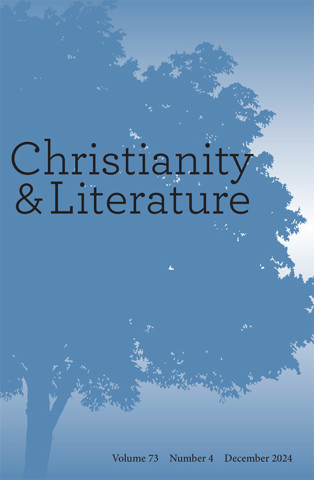
Christianity & Literature
Mark Eaton, Azusa Pacific University
Journal Details
Articles must be submitted electronically to ScholarOne Manuscripts, the online peer-review system used by Christianity & Literature . Please submit your manuscript here:
https://mc.manuscriptcentral.com/christlit All submissions must be formatted for blind peer review and should include: • a title page with the author’s name, email, and mailing address. • a 100-word abstract and a list of suggested keywords to accompany the essay: 3-5 is appropriate. • a short biographical note with information about your position, research, and publications. • the essay, with title on first page, and page numbers on all following pages. There should be no author identification in the body of the essay.
- All articles submitted for publication should conform to the Chicago Manual of Style , 17th edition, Notes and Bibliography Style, but please do not include a Bibliography or Works Cited list — incorporate all of your references into your notes. You may do this in your final version, not the version for review.
- Articles of fewer than 4,000 or more than 9,000 words, including notes are not ordinarily considered, unless they are commissioned for a special issue or of exceptional merit. Submissions should comply with accepted guidelines for nonsexist usage.
For information about the Chicago Manual of Style , 17th edition, Notes and Bibliography Style, go to their webpage: https://www.chicagomanualofstyle.org/book/ed17/frontmatter/toc.html
A Chicago Style Citation Quick Guide is also available here: https://www.chicagomanualofstyle.org/tools_citationguide/citation-guide-1.html
General inquiries can be made to [email protected] or to the following mailing address:
Mark Eaton, Editor Christianity & Literature Department of English Azusa Pacific University 901 E. Alosta Ave. Azusa, CA 91702-7000
The Hopkins Press Journals Ethics and Malpractice Statement can be found at the ethics-and-malpractice page.
Peer Review Policy
Christianity & Literature is a peer-reviewed scholarly journal. Published quarterly in March, June, September, and December, each issue contains articles, book reviews, and poems. Each submission is carefully evaluated by the editors. If the submission is deemed worthy of peer review, it is then sent to external reviewers in an anonymous, double-blind peer-review process. External reviewers are selected on the basis of their expertise in the fields or subject areas of each submission. The editors consider a submission only with the understanding that it has not been concurrently submitted elsewhere. Christianity & Literature is committed to a reasonable timeline for peer review. We expect to reach a decision on each submission within three to four months. In the case of unavoidable delays, the editors will attempt to communicate with authors.
Mark Eaton, Azusa Pacific University
Associate Editors
Matthew J. Smith, Hildegard College Caleb D. Spencer, Azusa Pacific University
Poetry Editor
Peter Cooley, Tulane University
Book Review Editor
Philip Mitchell, Dallas Baptist University, USA
Managing Editor
Katy Wright-Bushman
Editorial Board
Ann W. Astell, University of Notre Dame Lori Branch, University of Iowa Paul Contino, Pepperdine University John D. Cox, Hope College Christopher Douglas, University of Victoria Lori Ann Ferrell, Claremont Graduate University Kevin Hart, University of Virginia David D. Hall, Harvard Divinity School Peter S. Hawkins, Yale University Colin Jager, Rutgers University David Lyle Jeffery, Baylor University Janet Larson, Rutgers University, Newark Julia Reinhart Lupton, University of California, Irvine Susannah Monta, University of Notre Dame Maire Mullins, Pepperdine University
The editors assign book reviews by invitation. If you would like to suggest a book for review or offer to write a book review, please write to Philip Mitchell at [email protected] . If you are an author or publisher, please send books for review to: Philip Mitchell, Book Review Editor Christianity & Literature Collins Learning Center 222 Dallas Baptist University 3000 Mountain Creek Parkway Dallas, TX 25211
Once accepted, you will be asked to submit your book review to ScholarOne Manuscripts here: https://mc.manuscriptcentral.com/christlit
Poetry submissions are accepted in hard copy only. Please send all poetry submissions to: Peter Cooley, Poetry Editor
Christianity & Literature Tulane University Department of English, Norman Mayer 122 New Orleans, LA 70118 The poetry editor looks for poems that are clear and surprising. They should have a compelling sense of voice, formal sophistication (though not necessarily rhyme and meter), and the ability to reveal the spiritual through concrete images.
Once accepted, you will be asked to submit your poem or poems to ScholarOne Manuscripts here: https://mc.manuscriptcentral.com/christlit
Please be sure to include all relevant contact information along with a poem or poems: name, address, and especially your email.
Poetry submissions will not be acknowledged or returned unless they are accompanied by a SASE (self-addressed stamped envelope) with sufficient return postage.
Abstracting & Indexing Databases
- Dietrich's Index Philosophicus
- IBZ - Internationale Bibliographie der Geistes- und Sozialwissenschaftlichen Zeitschriftenliteratur
- Internationale Bibliographie der Rezensionen Geistes- und Sozialwissenschaftlicher Literatur
- Academic Search Alumni Edition, 1/1/2003-
- Academic Search Complete, 1/1/2003-
- Academic Search Elite, 1/1/2003-
- Academic Search Premier, 1/1/2003-
- Academic Search: Main Edition, 6/1/1995-
- Advanced Placement Source, 1/1/2003-
- American Bibliography of Slavic and East European Studies (Online), 1989-, dropped
- ATLA Religion Database (American Theological Library Association), 1973-2017
- Biography Index: Past and Present (H.W. Wilson), vol.45, 1996-vol.59, no.1, 2009
- Book Review Digest Plus (H.W. Wilson), Jun.1995-
- Christian Periodical Index, 1976-
- Current Abstracts, 1/1/2003-
- Humanities Abstracts (H.W. Wilson), 4/15/1995-
- Humanities Index (Online), 1995/06-
- Humanities International Complete, 6/1/1995-
- Humanities International Index, 6/1/1995-
- Humanities Source, 4/15/1995-
- Humanities Source Ultimate, 4/15/1995-
- Literary Reference Center, 7/1/2003-
- Literary Reference Center Plus, 7/1/2003-
- Literary Reference Center: Main Edition, 6/1/1995-
- MainFile, 6/1/1995-
- MLA International Bibliography (Modern Language Association)
- OmniFile Full Text Mega (H.W. Wilson), 4/15/1995-
- OmniFile Full Text Select (H.W. Wilson), 4/15/1995-
- Poetry & Short Story Reference Center, 6/1/1995-
- Religion & Philosophy Collection, 1/1/2003-
- TOC Premier (Table of Contents), 6/1/1995-
- Book Review Index Plus
- Gale Academic OneFile
- Gale Academic OneFile Select, 01/1996-03/2014, dropped
- Gale General OneFile, 09/1994-03/2014, dropped
- Gale OneFile: Religion and Philosophy, 09/1994 - 03/2014, dropped
- InfoTrac Custom, 1/1996-3/2014
- ArticleFirst, vol.44, no.2, 1995-vol.61, no.1, 2011
- Professional ProQuest Central, 10/01/2004-01/01/2005
- ProQuest 5000, 10/01/2004-01/01/2005
- ProQuest 5000 International, 10/01/2004-01/01/2005
- ProQuest Central, 10/01/2004-01/01/2005
- Religion Database, 10/01/2004-01/01/2005
- Research Library, 10/01/2004-01/01/2005
- The Annual Bibliography of English Language and Literature (ABELL)
- Religious & Theological Abstracts, 1989-
Abstracting & Indexing Sources
- Abstracts of English Studies (Ceased) (Print)
- Children's Literature Abstracts (Ceased) (Print)
- Literary Criticism Register (Ceased) (Print)
- MLA Abstracts of Articles in Scholarly Journals (Ceased) (Print)
- Religion Index One: Periodicals (Ceased) (Print)
- Religion Index Two: Multi-Author Works (Ceased) (Print)
Source: Ulrichsweb Global Serials Directory.
Published Quarterly Print circulation: 259
Print Advertising Rates
Full Page: (5.5 x 8") – $375.00
Half Page: (5.5 x 4") – $281.00
2 Page Spread – $563.00
Print Advertising Deadlines
March Issue –Issue 1 –January 15
June Issue –Issue 2 –April 15
September Issue –Issue 3 –July 15
December Issue –Issue 4 –October 15
Online Advertising Rates (per month)
Promotion (400x200 pixels) – $281.00
Online Advertising Deadline
Online advertising reservations are placed on a month-to-month basis.
All online ads are due on the 20th of the month prior to the reservation.
General Advertising Info
For more information on advertising or to place an ad, please visit the Advertising page.
eTOC (Electronic Table of Contents) alerts can be delivered to your inbox when this or any Hopkins Press journal is published via your ProjectMUSE MyMUSE account. Visit the eTOC instructions page for detailed instructions on setting up your MyMUSE account and alerts.
Also of Interest
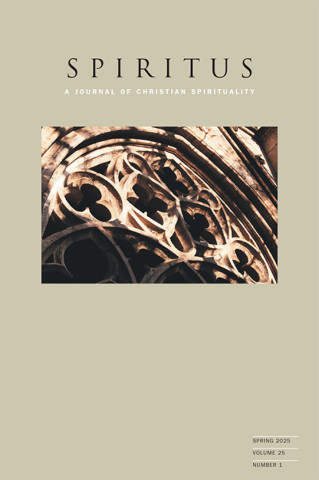
Glen G. Scorgie, Bethel University
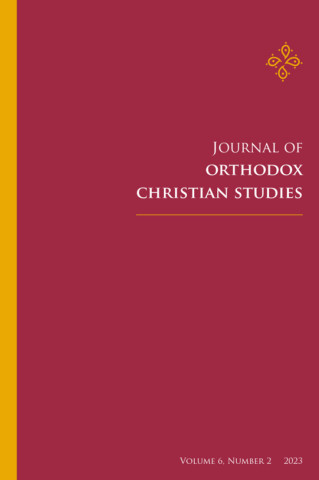
George E. Demacopoulos, Fordham University; Vera Shevzov, Smith College
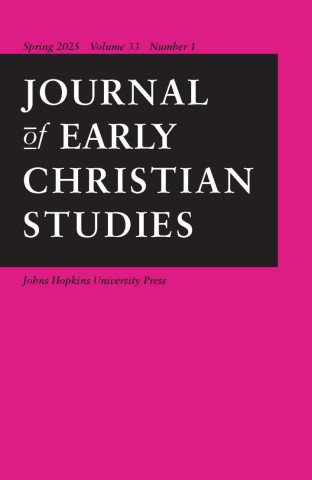
Stephen J. Shoemaker, University of Oregon
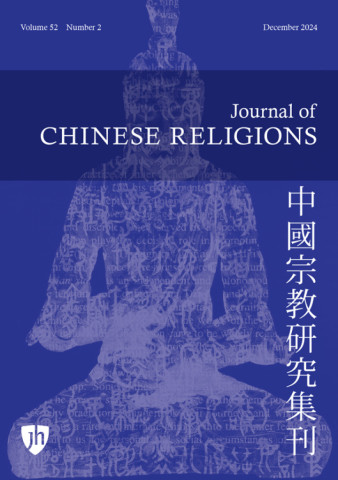
Philip Clart, Leipzig University, Germany
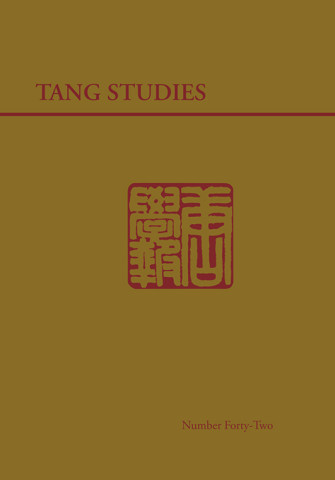
Nicholas Morrow Williams, Arizona State University
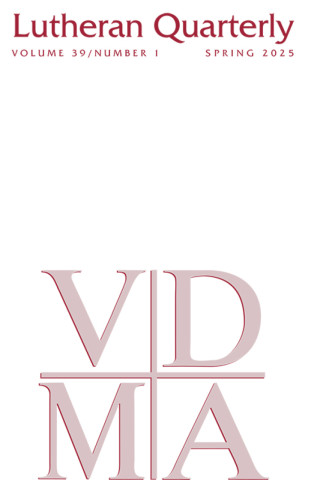
Paul Rorem, Princeton Theological Seminary, Princeton, NJ
Hopkins Press Journals


Truly Unconventional Wisdom
In 1968, our department was established to critically study religion at a time when it was standard to think about religion only as the study of theology and ethics in philosophy departments.
Religious Studies Review
Helpful links.
Religious Studies Review (RSR) is a quarterly review of publications across the entire field of religion and related disciplines. RSR is the only publication that provides major review essays and short reviews for over 1,000 titles in religion annually. The editorial staff is composed of professors from all over the world.
Editorial Staff
Mark MacWilliams , Executive Editor - Major Reviews St. Lawrence University Spencer Dew , Short Reviews Editor The Ohio State University Anthony B. Pinn , Managing Editor Rice University Holly Walrath , RSR Coordinator Rice University
Area Editors (by section)
Comparative Studies/Methodology and Theory
Brian Collins , Ohio University
Psychology of Religion William Parsons , Rice University
Gender and Sexuality Studies Danielle Dempsey , Oklahoma State University Jessica Rehman , University of California, Riverside Kimberly Diaz , University of California, Riverside
Religion and Science Lisa Stenmark , San Jose State University
Christopher Stephenson , Lee University
Nancy Bedford , Georgia Harkness Professor of Theology, Garrett-Evangelical Theological Seminary
Matthew Friedman , Subeditor, Missiology, Mission and Evangelism, Asbury Theological Seminary
Daniel Castelo , PhD, is the William Kellon Quick Professor of Theology and Methodist Studies. His areas of expertise include Christian theology, Wesleyan and Pentecostal spirituality, and Latinx theology.
Philosophy of Religion Charles Taliaferro , St. Olaf College Alexander Cavender , St. Olaf College
Ethics James P. Bailey , Duquesne University
Religion and Law Jeffrey Wheatley, Iowa State University
Jeffrey Wheatley is a teacher and researcher who studies religion, culture, and politics with a historical focus on the United States. His current project is on religious fanaticism as an object of secular policing.
Pedagogy Ken Derry , University of Toronto
Digital Materials and Media Alessandra Vitull o , Sapienza University of Rome
Religion, Arts and Culture
Kristen Tobey, John Carroll University
Jeremy Biles is an Associate Professor in the Department of Liberal Arts at the School of the Art Institute of Chicago, where he teaches courses on religion, philosophy, and art. He is the author of Ecce Monstrum: Georges Bataille and the Sacrifice of Form ; co-editor of Negative Ecstasies: Georges Bataille and the Study of Religion ; and co-author of The Abyss, or Life Is Simple .
Ancient Near East Tyler Mayfield , Louisville Presbyterian Theological Seminary
Greece, Rome, Greco-Roman Period
Jenny Strauss Clay , University of Virginia
Jenny Strauss Clay is William R. Kenan Professor of Classics Emerita at the University of Virginia. Her publications have focused on early Greek literature and what she calls the theology of Homer, Hesiod, and the Homeric Hymns.
Christian Origins
John Goodrich , Moody Bible Institute
Patrick Gray (Ph.D., Emory University) is Professor of Religious Studies at Rhodes College in Memphis, TN. He received his Ph.D. in religion from Emory University. His research focuses on the Greco-Roman context of early Christianity and the history of biblical interpretation. He is editor of The Cambridge Companion to the New Testament (2021).
Stan Harstine , Subeditor, Johannine Literature, Friends University
James Prothro , Subeditor, Augustine Institute
Daniel M. Gurtner , Subeditor, Gospel of Matthew, St. Mary's University, Twickenham
History of Christianity: Early
Ben C. Blackwell , Vice Principal and Professor of Early Christianity WTC Theology
Laura Dingeldein is a historian of ancient Mediterranean religion, with expertise in the beginnings of Christianity. Her recent work has focused in particular on early Christians' use of philosophical concepts. She teaches at the University of Illinois Chicago, where she is a clinical assistant professor in the Religious Studies Program.
Sarah F. Porter is assistant professor of Religious Studies at Gonzaga University (Spokane, WA). She focuses on late antique Christianity, material culture, and affect.
Shawn J. Wilhite , California Baptist University
History of Christianity: Modern/Global Nathanael Homewood , Harvard University
Jewish Thought Seeking Editor
Judaism: Hellenistic through Late Antiquity Jason Maston , Houston Christian University
Judaism: Medieval/Early Modern Jewish Studies Deborah Kaye , University of Arizona
Judaism: Modern Jonathan Zisook , University of Pittsburgh
Islam Hamed Fayazi , University of Religions and Denominations Junaid Quadri , University of Illinois at Chicago Walaa Quisay , Graduate of Oxford University
Africa Seeking Editor
Oceania Seeking Editor
The Americas Daniel Jones , Missouri State University Nicholas Higgins , North Greenville University
New and Alternative Religious Movements Lukas Pokorny , University of Vienna
Lukas K. Pokorny is Professor and Chair of Religious Studies at the University of Vienna. Large parts of his current research focus on millenarianism and esotericism (specifically the reception history of East Asia), new religious movements, as well as new, alternative, and Asian diasporic religions in Austria.
South Asia Steven E. Linquist , Southern Methodist University, Associate Professor and Director of Asian Studies Gardner Harris , Hampden-Sydney College
Justin McDaniel , University of Pennsylvania
Matthew Steven Mitchell is a visiting assistant professor of Religion at High Point University in North Carolina. His research is on early modern Japanese Buddhism.
Inner Asia Rory Lindsay , University of California, Santa Barbara
Political Theology Nicholas Higgins , North Greenville University
Get Involved
General inquiries about the journal can be made by contacting us at [email protected] . If you are interested in writing reviews for RSR, we encourage you to contact the area editor(s) of the sections in which you are interested. Please include a CV and possible titles you are interested in reviewing (see our list of books available for review ). Please note, we prefer to review titles published in the last three years.
We accept books related to religion in our areas of focus for review. Please send all books for review to the RSR Editorial Office: Religious Studies Review - MS 156 Rice University P.O. Box 1892 Houston, TX 77251-1892 (713) 348-5721
[email protected] 713.348.5721 (office)
TWITTER @Rice_RSR
POSTAL ADDRESS
Religious Studies Review - MS 156 Rice University PO Box 1892 Houston, TX 77251-1892
STREET ADDRESS
Religious Studies Review - MS 156 Rice University Humanities Bldg., Room 233 6100 Main Street Houston, TX 77005

IMAGES
VIDEO
COMMENTS
Prothero's book ends with a Dictionary of Religious Literacy, a remarkably helpful introduction to the major beliefs of the world's religions. Prothero's Religious Literacy is unique in that it avoids two extremes. First, he seeks to avoid the danger of relativizing the religions, so that the distinctions are muted.
By Janie Cheaney. Four new books by Chris Raschka, Micha Archer, Elisha Cooper, and Sophie Blackall celebrate the variety of life on earth and the power of imagination. We're the Christian book reviews resource for Christian parents and educators trying to navigate the children's book world.
Prothero's book is a long complaint about the lack of religious literacy in America today. The author is particularly upset because of the supposed importance of religion in modern American society has not led to a better understanding of what people say they believe.
Stephen Prothero is a professor in the Department of Religion at Boston University and the author of numerous books, most recently Religious Literacy: What Every American Needs to Know—And Doesn't and American Jesus: How the Son of God Became a National Idol. He has commented on religion on dozens of National Public Radio programs and on ...
I have a copy of his book, Religious Literacy: What Every American Needs to Know - And Doesn't. It was a New York Times bestseller. ... I think the line of my review is something like: I've actually never read a book by an author who is so fundamentally unacquainted with the subject of the book. He doesn't know anything about religion.
Decline-and-fall books, like E. D. Hirsch Jr.'s "Cultural Literacy" and Allan Bloom's "Closing of the American Mind," can leave the reader torn between depression and elation: by ...
Provocative and Timely. "In this book, the author combines a lively history of the rise and fall of American religious literacy with a set of proposed remedies based on his hope that "the Fall into religious ignorance is reversible." He also includes a useful multicultural glossary of religious definitions and allusions, in which religious ...
Destroying Christian Order. If in America today "faith is almost entirely devoid of content" (p. 1), Prothero says, "you need religious literacy in order to be an effective citizen" (p. 9). Historical events, like the American Revolution and the Civil War, cannot be understood "in a religion vacuum" (p. 4).
Find helpful customer reviews and review ratings for Religious Literacy: ... In Religious Literacy, Stephen Prothero draws much-needed attention to the shocking state of religious illiteracy in the country, and seeks to provide "What Every American Needs to Know--and Doesn't" (the book's sub-title). ... But, this is not an anti-Christian book ...
The Routledge Handbook of Religious Literacy, Pluralism, and Global Engagement edited by Chris Seiple and Dennis R. Hoover offers a comprehensive understanding of cross-cultural religious literacy, emphasizing the presence of diversity and the mutually respectful engagement of difference to which the theory and application of religious literacy should be directed.
Focusing on the concept of "religious literacy," he describes a framework for the NYU workshops on spiritual diversity that supports religious literacy initiatives. Included in the book is the Faith Zone curriculum and rubrics drawn from the AACU (Association of American Colleges and Universities) VALUE rubrics that are used for post ...
Religious Literacy: What Every American Needs to Know-And Doesn't - Kindle edition by Prothero, Stephen R.. Download it once and read it on your Kindle device, PC, phones or tablets. Use features like bookmarks, note taking and highlighting while reading Religious Literacy: What Every American Needs to Know-And Doesn't.
Book Review: Teaching Religious Literacy: A Guide to Religious and Spiritual Diversity in Higher Education Tecora Rogers Harper DePaul University Follow this and additional works at: https://digitalcommons.lmu.edu/ce Part of the Other Education Commons Recommended Citation Rogers Harper, T. (2017).
Religious literacy has emerged as a commonplace term (amongst other identified and multiple literacies, e.g. media literacy, financial literacy, coding literacy) in education over the past 20 years, deemed to be a necessary component for successful citizenship across contemporary societies. Specifically, religious literacy is said to entail ...
About. Reading Religion ( RR) is an openly accessible book review website published by the American Academy of Religion (AAR). The site provides up-to-date coverage of scholarly publishing in religious studies, reviewed by scholars with special interest and/or expertise in the relevant subfields. Reviews are concise, comprehensive, and timely.
Here are our most popular book reviews of 2023, ranked in reverse order of what our online audience read most. 15. 14. 13. 12. 11. 10. 9. 8. 7. 6. 5. 4. 3. 2. 1. Check out the rest of our 2023 ...
Until recently, few books equipped readers with practical tools for engaging the ever-expanding world of faith. The post-9/11 wars drove policymakers and analysts to try to understand complex and ancient societies, but the religious landscape was often left unexplored. And when authors wrote about the role of religion and politics, they ignored or failed to understand the dynamics of lived ...
Christianity & Literature is a peer-reviewed scholarly journal. Published quarterly in March, June, September, and December, each issue contains articles, book reviews, and poems. Each submission is carefully evaluated by the editors. If the submission is deemed worthy of peer review, it is then sent to external reviewers in an anonymous ...
XML. The annual Review of Biblical Literature presents a selection of reviews of the most recent books in biblical studies and related fields, including topical monographs, multi-author volumes, reference works, commentaries, and dictionaries. RBL reviews German, French, Italian, and English books and offers reviews in those languages. Features:
Review Author(s) Religious Literacy in Policy and Practice is a collection of fourteen essays that challenge the idea of religion as a problem, and question assumptions about religion in public discourse.
The editors assign book reviews by invitation. If you would like to suggest a book for review or offer to write a book review, please write to Philip Mitchell at [email protected]. If you are an author or publisher, please send books for review to: Philip Mitchell, Book Review Editor Christianity & Literature Collins Learning Center 222
Book review. First published online August 10, 2023. Book Review: The Routledge Handbook of Religious Literacy, Pluralism, and Global Engagement ... Based on: The Routledge Handbook of Religious Literacy, Pluralism, and Global Engagement by Seiple Chris and Hoover Dennis R., 2022. 1st edition. Abingdon, Oxon; New York, NY: Routledge/Taylor ...
Please note, we prefer to review titles published in the last three years. We accept books related to religion in our areas of focus for review. Please send all books for review to the RSR Editorial Office: Religious Studies Review - MS 156 Rice University P.O. Box 1892 Houston, TX 77251-1892 (713) 348-5721